- Privacy Policy

Home » 500+ Sports Research Topics

500+ Sports Research Topics

Sports research topics cover a vast array of areas in the world of athletics, from the physical and psychological impacts of sport on athletes to the social and cultural implications of sports on society. Sports research can include studies on training techniques, nutrition, injury prevention, performance enhancement, and much more. It can also explore the societal impact of sports, such as the role of sports in shaping national identities, gender roles, and cultural values. As a result, the field of sports research provides a unique lens through which to understand the complex relationship between sports and society, and offers insights that can benefit athletes, coaches, and sports enthusiasts alike. In this post, we will explore some of the most fascinating and important sports research topics that are currently being investigated.
Sports Research Topics
Sports Research Topics are as follows:
- The psychological benefits of participating in team sports
- The impact of sports on academic achievement
- The role of sports in promoting physical health and fitness
- The impact of sports on mental health and well-being
- The benefits and drawbacks of early specialization in youth sports
- The relationship between sports and character development
- The role of sports in building social capital and community cohesion
- The impact of technology on sports training and performance
- The influence of gender on sports participation and achievement
- The impact of culture on sports participation and achievement
- The economics of professional sports: salaries, revenue, and team valuations
- The role of sports in promoting diversity and inclusion
- The impact of sports on political and social change
- The impact of sports sponsorship on consumer behavior
- The impact of doping in sports on athlete health and performance
- The role of nutrition in sports performance
- The impact of weather conditions on sports performance
- The influence of crowd behavior on sports performance and player behavior
- The impact of sports injuries on athlete health and career longevity
- The impact of sports on tourism and local economies
- The role of sports in promoting peace and conflict resolution
- The impact of globalization on sports and their respective cultures
- The impact of sports on national identity and patriotism
- The impact of sports media on fan behavior and athlete performance
- The impact of sports on the environment
- The influence of sports fans on team strategy and decision-making
- The impact of sports gambling on sports integrity and athlete health
- The impact of sports specialization on long-term athlete development
- The influence of sports referees and officials on game outcomes
- The role of technology in sports officiating and decision-making
- The impact of sports on youth development and socialization
- The role of sports in promoting gender equality and women’s empowerment
- The impact of sports on personal identity and self-esteem
- The role of sports in promoting physical literacy and lifelong physical activity
- The impact of fan behavior on athlete mental health and well-being
- The influence of sports broadcasters on fan behavior and attitudes
- The role of sports in promoting healthy competition and fair play
- The impact of sports participation on academic performance in children
- The influence of social media on athlete behavior and fan engagement
- The impact of sports on international diplomacy and political relations
- The influence of coach behavior on athlete mental health and performance
- The role of sports in promoting cultural understanding and awareness
- The impact of sports science on athlete training and performance
- The impact of youth sports on parent-child relationships
- The influence of sports team culture on athlete behavior and performance
- The role of sports in promoting environmental sustainability
- The impact of sports on social mobility and economic inequality
- The influence of sports on global health issues
- The impact of sports on regional and national identity
- The role of sports in promoting positive youth development and resilience.
- The impact of technology on sports performance
- The effects of altitude on ball flight in sports like golf and tennis
- The effects of sports on stress management
- The impact of COVID-19 on the sports industry
- The impact of technology on sports officiating and rule enforcement
- The role of sports in promoting cultural heritage and preservation
- The impact of sports on mental toughness and resilience among athletes
- The effects of different types of recovery interventions on sports injury rehabilitation
- The role of sports in promoting intergenerational connections and social capital
- The effects of different types of sports psychology interventions on team dynamics and performance in professional sports
- The role of sports in promoting peacebuilding and conflict resolution in divided societies
- The impact of sports on career development and job satisfaction among sports journalists
- The effects of different types of recovery interventions on injury prevention and performance in powerlifting
- The role of sports in promoting social innovation and entrepreneurship among youth
- The impact of sports on social identity and community building among refugees and immigrants
- The effects of different types of sports nutrition interventions on brain health and cognitive function in older adults
- The role of sports in promoting sustainable urban development and active transportation
- The impact of sports on social capital and political engagement among LGBTQ+ athletes
- The effects of different types of training interventions on injury prevention and recovery in equestrian sports.
- The impact of sports on body image and self-esteem among female athletes
- The effects of different types of sports equipment on performance and injury risk in extreme sports
- The role of sports in promoting cultural diplomacy and international relations
- The impact of sports on emotional regulation and mental health among adolescent athletes
- The effects of different types of nutrition interventions on injury prevention and recovery in team sports
- The role of sports in promoting civic engagement and political participation among athletes
- The impact of sports on cognitive development and academic achievement in early childhood
- The effects of different types of sports psychology interventions on sports performance and mental health
- The role of sports in promoting environmental education and sustainability in schools
- The impact of sports on career development and employability among retired athletes
- The effects of different types of mindfulness interventions on sports performance and well-being
- The role of sports in promoting intercultural dialogue and understanding
- The impact of sports on emotional intelligence and leadership development among coaches
- The effects of different types of sports supplements on performance and health outcomes
- The role of sports in promoting disaster risk reduction and resilience in coastal communities
- The impact of sports on social identity and group dynamics in fan communities
- The effects of different types of sports training on injury prevention and recovery in power sports
- The role of sports in promoting digital literacy and technological innovation in youth
- The impact of sports on social-emotional learning and character development in schools
- The effects of different types of nutrition interventions on sports performance and cognitive function in older adults
- The role of sports in promoting gender equity and empowerment in sports organizations
- The impact of sports on cultural identity and community building among Indigenous peoples
- The effects of different types of training interventions on injury prevention and recovery in para-athletes
- The role of sports in promoting global health and disease prevention
- The impact of sports on social support and mental health among parents of youth athletes
- The effects of different types of recovery interventions on sports performance and injury prevention in master athletes
- The role of sports in promoting community-based health education and behavior change
- The impact of sports on identity development and socialization among adolescent girls
- The effects of different types of sports nutrition interventions on gut microbiota and health outcomes
- The role of sports in promoting intercultural communication and language learning
- The impact of sports on psychological well-being and job satisfaction among sports officials
- The effects of different types of mindfulness interventions on injury prevention and recovery in endurance sports
- The role of sports in promoting sustainable tourism and economic development in rural areas
- The impact of sports on social integration and inclusion among individuals with disabilities
- The effects of different types of sports equipment on biomechanics and performance in precision sports
- The role of sports in promoting community resilience and disaster risk reduction in urban areas
- The impact of sports on social-emotional development and academic achievement among at-risk youth
- The effects of different types of sports nutrition interventions on immune function and health outcomes
- The role of sports in promoting social justice and human rights in sport governance
- The impact of sports on community development and social capital in post-conflict areas
- The effects of different types of resistance training on injury prevention and recovery in endurance athletes
- The role of sports in promoting intergenerational relationships and aging well-being
- The impact of sports on social support and mental health among retired athletes
- The role of sports in promoting civic activism and social change
- The impact of sports on sleep quality and quantity in professional athletes
- The effects of different types of stretching on recovery and injury prevention
- The role of sports in promoting environmental justice and sustainability
- The impact of sports on emotional intelligence and social skills among youth athletes
- The effects of different types of resistance training on sports performance
- The role of sports in promoting peace and conflict resolution in divided societies
- The impact of sports on academic achievement and career success among athletes
- The effects of different types of endurance training on injury prevention and recovery
- The role of sports in promoting cultural diversity and inclusion
- The impact of sports on team cohesion and communication
- The effects of different types of dietary interventions on sports performance and recovery
- The role of sports in promoting mental health and well-being in marginalized communities
- The impact of sports on cognitive function and academic achievement in children
- The effects of different types of cooling interventions on sports performance and recovery
- The role of sports in promoting community resilience and disaster preparedness
- The impact of sports on social capital and social mobility in low-income communities
- The effects of different types of sports nutrition interventions on bone health and injury prevention
- The role of sports in promoting global citizenship and intercultural competence
- The impact of sports on personal and professional development among athletes
- The effects of different types of training programs on sports performance and injury prevention in older adults
- The role of sports in promoting human rights and social justice
- The impact of sports on decision-making and risk-taking behavior in adolescents
- The effects of different types of aerobic exercise on cognitive function and brain health
- The role of sports in promoting sustainable development and social innovation
- The impact of sports on social integration and belonging among refugees and immigrants
- The effects of different types of sports equipment on injury risk and performance
- The role of sports in promoting gender equality and empowerment in developing countries
- The impact of sports on academic engagement and achievement among middle school students
- The effects of different types of hydration interventions on sports performance and recovery
- The role of sports in promoting community-based tourism and economic development
- The impact of sports on identity formation and self-concept among athletes
- The effects of different types of sports training on bone health and injury prevention in female athletes
- The role of sports in promoting environmental conservation and climate action
- The impact of sports on personal values and character development among athletes
- The effects of different types of sports nutrition interventions on cardiovascular health and performance
- The role of sports in promoting community-based disaster response and recovery
- The impact of sports on social support and well-being among LGBTQ+ athletes
- The effects of different types of recovery interventions on injury rehabilitation and return to play in professional athletes
- The role of sports in promoting social entrepreneurship and innovation
- The impact of sports on moral reasoning and ethical decision-making among athletes
- The effects of different types of training programs on cognitive function and academic achievement in children
- The role of sports in promoting social inclusion and equality in urban settings
- The impact of sports on social identity and collective action among fans
- The effects of different types of recovery interventions on sports performance and injury prevention in adolescent athletes
- The effects of different types of recovery modalities on injury prevention in sports
- The role of sports in promoting cultural diplomacy
- The impact of sports participation on academic achievement among college students
- The effects of different types of hydration strategies on sports performance
- The role of sports in promoting social cohesion and community building
- The impact of sports on physical and cognitive aging
- The effects of different types of warm-down on sports performance and injury prevention
- The role of sports in promoting positive youth development
- The impact of sports on crime and delinquency among youth
- The effects of different types of endurance training on sports performance
- The role of sports in promoting gender equity and empowerment
- The impact of sports on mental health among athletes
- The effects of different types of carbohydrate intake on sports performance
- The role of sports in promoting international relations and diplomacy
- The impact of sports on body image and self-esteem among adolescents
- The effects of different types of sports drinks on sports performance
- The role of sports in promoting environmental sustainability and conservation
- The impact of sports on cognitive function and brain health
- The effects of different types of sports psychology interventions on sports performance
- The role of sports in promoting social justice and human rights
- The impact of sports on physical activity levels and sedentary behavior
- The effects of different types of pre-game nutrition on sports performance
- The role of sports in promoting economic development and tourism
- The impact of sports on cultural and national identity
- The effects of different types of footwear on injury risk in sports
- The role of sports in promoting civic engagement and democracy
- The impact of sports on sleep quality and quantity
- The effects of different types of anaerobic training on sports performance
- The role of sports in promoting intergenerational relationships and socialization
- The impact of sports on body composition and weight management
- The effects of different types of sports psychology interventions on injury prevention and recovery
- The role of sports in promoting peacebuilding and conflict resolution
- The impact of sports on self-efficacy and self-esteem among athletes
- The effects of different types of protein intake on sports performance
- The role of sports in promoting health equity and reducing health disparities
- The impact of sports on social capital and community resilience
- The effects of different types of high-intensity interval training on sports performance
- The impact of sports on stress and stress-related disorders
- The effects of different types of dietary supplements on sports performance
- The role of sports in promoting human development and well-being
- The impact of sports on emotional regulation and mental health
- The effects of different types of strength training on sports performance
- The role of sports in promoting social innovation and entrepreneurship
- The impact of sports on social identity and belonging
- The effects of different types of cognitive training on sports performance
- The role of sports in promoting disaster resilience and preparedness
- The impact of sports on academic engagement and achievement among high school students
- The effects of different types of stretching on injury prevention and sports performance.
- The effects of different types of training on athletic performance
- The effectiveness of different coaching styles in sports
- The role of nutrition in athletic performance
- The psychology of injury rehabilitation in sports
- The use of performance-enhancing drugs in sports
- The role of sports in promoting physical and mental health
- The impact of social media on sports marketing
- The effectiveness of sports marketing campaigns
- The effects of gender and ethnicity on sports participation and performance
- The impact of sports sponsorship on athlete performance
- The role of sports in promoting teamwork and leadership
- The effects of environmental conditions on sports performance
- The impact of sports on community development
- The psychology of winning and losing in sports
- The effects of sleep on sports performance
- The use of virtual reality in sports training
- The impact of sports injuries on athletes’ careers
- The effects of altitude on athletic performance
- The use of data analysis in sports performance assessment
- The role of sports in reducing stress and anxiety
- The impact of sports on academic performance
- The effects of different sports on cardiovascular health
- The use of cryotherapy in sports recovery
- The impact of social media on sports fans and fandom
- The effects of different types of footwear on sports performance
- The role of sports in promoting physical activity among children and adolescents
- The effects of different types of stretching on sports performance
- The impact of sports on social and cultural values
- The effects of hydration on sports performance
- The role of sports in promoting global understanding and diplomacy
- The effects of different types of surfaces on sports performance
- The impact of sports on economic development
- The impact of sports on mental toughness and resilience
- The effects of different types of recovery methods on sports performance
- The use of mindfulness in sports performance and injury recovery
- The impact of sports on environmental sustainability
- The effects of different types of warm-up on sports performance
- The role of sports in promoting tourism and travel
- The impact of sports on crime reduction and community safety
- The effects of different types of sports equipment on performance
- The impact of sports on job creation and employment opportunities
- The effects of different types of physical activity on mental health
- The role of sports in promoting social mobility and equality
- The impact of sports on identity formation and socialization
- The effects of different types of pre-game rituals on sports performance.
- The role of sports in promoting healthy aging
- The impact of sports on conflict resolution among youth
- The effects of sports on job satisfaction and productivity
- The role of sports in promoting environmental conservation
- The impact of sports on language proficiency and communication skills
- The effects of sports on the development of social skills
- The role of sports in promoting peaceful coexistence and tolerance
- The impact of sports on community building and cohesion
- The effects of different types of sports on hand-eye coordination
- The impact of sports on personal growth and self-discovery
- The effects of sports on cultural competency
- The role of sports in promoting social and emotional learning
- The impact of sports on community health
- The effects of different types of sports on reaction time
- The role of sports in promoting social justice and equity
- The impact of sports on academic motivation and achievement
- The effects of sports on the development of grit and resilience
- The role of sports in promoting civic engagement and social responsibility.
- The impact of sports on tourism
- The role of sports in promoting physical activity
- The effects of playing sports on cognitive development
- The impact of sports on political identity
- The effects of sports on self-esteem and body image
- The role of sports in promoting teamwork and collaboration
- The effects of different coaching styles on athlete performance
- The impact of sports on national security
- The role of sports in promoting cultural exchange and diplomacy
- The effects of sports on language acquisition
- The impact of sports on family dynamics
- The role of sports in promoting conflict resolution
- The impact of sports on social mobility
- The effects of different types of training on injury prevention
- The role of sports in promoting global health
- The effects of sports on decision-making and risk-taking behavior
- The role of sports in promoting physical and mental well-being
- The impact of sports on social justice
- The effects of sports on academic achievement among at-risk youth
- The role of sports in promoting cultural heritage
- The impact of sports on personal identity
- The effects of sports on emotional intelligence and empathy
- The role of sports in promoting gender equality
- The impact of sports on identity formation
- The effects of different types of sports on balance and coordination
- The role of sports in promoting social capital
- The impact of sports on social integration and inclusion
- The effects of training at high altitudes on athletic performance
- The psychological factors that contribute to athlete burnout
- The relationship between sleep and athletic performance
- The effects of music on sports performance
- The effects of caffeine on sports performance
- The impact of climate on sports performance
- The use of supplements in sports performance
- The role of genetics in sports performance
- The effects of aging on sports performance
- The impact of sports injuries on athlete’s careers
- The relationship between sports and mental health
- The effects of gender on sports performance
- The impact of social media on sports
- The effects of sports fandom on mental health
- The use of technology in sports coaching
- The impact of team culture on sports performance
- The effects of sports specialization on athlete development
- The role of sports psychology in athlete performance
- The effects of plyometric training on athletic performance
- The impact of climate change on outdoor sports
- The effects of team dynamics on sports performance
- The impact of sports participation on academic achievement
- The effects of sports sponsorship on athlete performance
- The role of biomechanics in sports performance
- The effects of stretching on sports performance
- The impact of sports equipment on performance
- The effects of altitude training on endurance sports performance
- The effects of different types of training on sports performance
- The role of nutrition in injury prevention
- The effects of mental preparation on sports performance
- The effects of climate on indoor sports performance
- The role of sports in cultural identity
- The impact of sports participation on youth development
- The effects of strength training on sports performance
- The role of coaches in athlete development
- The impact of sports on national identity
- The effects of different playing surfaces on sports performance
- The role of recovery in sports performance
- The impact of sports on local economies
- The impact of sports on gender and racial equality
- The effects of team size on sports performance
- The role of sports in promoting social inclusion
- The effects of sports on personal development
- The impact of sports on conflict resolution
- The effects of sports on leadership development
About the author
Muhammad Hassan
Researcher, Academic Writer, Web developer
You may also like

200+ Funny Research Topics

300+ American History Research Paper Topics

500+ Cyber Security Research Topics

500+ Environmental Research Topics

500+ Economics Research Topics

500+ Physics Research Topics

299+ Most Interesting Sports Research Topics For Students [2024]
Sure thing! Hey, welcome to Sports Research Topics! We’re all about digging deep into the world of sports from a research perspective. Whether you’re a sports nut or just curious.
We’ve got you covered with topics like analyzing player performance or looking at how sports impact our culture. So, kick back, relax, and let’s explore the exciting intersection of sports and research together! Sound good?
Table of Contents
What Are Sports Research Topics?
Sports are full of awesome research ideas! Whether you’re into fitness, psychology, tech, or culture, there’s something cool to explore. Check out these exciting areas:
Fitness and Health
- Check out how different workouts affect performance and injuries.
- Dive into nutrition for specific sports or athletes.
- Explore how wearable tech helps athletes and prevents injuries.
- Look into the long-term health impact of playing different sports.
Sports Psychology and Performance
- See how mental tricks like visualization boost performance.
- Study what drives success in sports teams.
- Find out how stress affects performance under pressure.
- Learn ways to improve focus and mental toughness in athletes.
Sports Analytics and Technology
Crunch data to uncover winning strategies and player strengths. Explore how AI is changing scouting and injury prediction. Debate the ethics of tech that enhances performance. See how technology changes the game for refs and fans.
Social and Cultural Aspects of Sports
- Look at how sports break down gender barriers.
- See how sports pump money into local economies.
- Check out how sports media shapes fan culture.
- Trace the history of your favorite sport or tradition.
Business of Sports
- Investigate how sponsorships and merch affect teams.
- Explore the cash flow of big events like the Olympics.
- Predict where sports broadcasting is heading.
- Weigh the fairness of player contracts and salaries.
Remember, these are just starting points! Narrow down your focus, think about practicalities like data and ethics, and get ready for a thrilling journey into the world of sports research!
List of Good Sports Research Topics
Check out sports research topics for students:-
Top-Rated Sports Research Topics To Write About
Good sports history research topics, great sports psychology research topics, athletic training research topics from experts, best exercise research paper topics, research paper topics on athletic training, sports management research topics, research ideas on sports marketing, sports theory research topics, research paper topics on sports sociology, sports nutrition research topics, research topics on sports medicine, water sports research topics, research paper topics on sports injuries, cool sports doping research topics, great argumentative sports research topics, brilliant sports research topics, hot & trending sports essay topics, latest sports research topics, benefits of sports research.
Let’s break it down:
Improving Health and Performance
- Better Training: Research helps coaches design workouts that make athletes stronger and safer.
- Eating Right: Studies show what foods make athletes perform their best and recover faster.
- Staying Safe: Research finds ways to prevent injuries and get players back in action quicker.
- Healing Faster: New treatments from research help injured athletes get back to 100%.
Getting Mentally Strong
Winning Minds: Research looks into how athletes can stay focused and handle pressure. Team Power: Studies show how teams can work together better for more wins. Feeling Good: Research helps athletes with mental health challenges like stress and anxiety.
Changing Sports for the Better
- Fair Play: Research fights for equal opportunities for all athletes and keeps sports honest.
- Money Matters: Studies show how sports can boost local economies and make communities stronger.
- Tech Magic: Research invents cool gadgets that help players play better and fans have more fun.
Making a Difference in Society
- Getting Moving: Research shows how playing sports can keep people healthier and happier.
- Breaking Barriers: Sports research fights for fairness and inclusion, making sure everyone gets a shot.
- Being a Hero: Studies prove how sports stars can inspire kids and make our communities better.
So next time you see a game, remember all the research that goes into making it awesome for everyone involved!
How to Choose a Sports Research Topics?
Crafting a captivating sports research topic boils down to blending your interests, feasibility, and potential impact. Here’s a roadmap to guide you through:
Ignite Your Passion
- What fires you up about sports?
- Whether it’s the science of performance, the psychology of competition, or the cultural influence, choose a topic that excites you.
Stay Current
- Keep an eye on recent breakthroughs and ongoing debates in sports.
- Dive into scientific journals, sports news, or reputable websites to spot gaps or unanswered questions ripe for research.
Be Practical
- Consider time, access to facilities, data availability, and ethics.
- Some topics may need surveys or experiments, while others can be tackled through literature reviews.
Hone Your Topic
- Get Specific: Instead of “sports injuries,” try “recovery methods for preventing overuse injuries in young athletes.”
- Blend Ideas: Explore “sleep quality’s impact on athlete mental performance under competition pressure.”
- Real-World Relevance: Investigate “promoting gender equality in sports leadership.”
300+ Unique Sports Research Topics For Students PDF
Here are the good sports research topics are given below for students in pdf:
What Are 3 Major Issues In Sports In Our Society?
Here are three big issues in sports:
1. Fair Play and Diversity
- Women still earn less and have fewer opportunities.
- Athletes of color face discrimination.
- Poorer athletes struggle to join in due to high costs.
2. Mental Well-being
- The pressure to perform and social media can be tough.
- Many athletes deal with anxiety, depression, and eating issues.
3 . Money Matters
- Winning often means everything, leading to cheating.
- Rich teams have unfair advantages.
- Young athletes sometimes sacrifice education for early careers.
Tackling these issues needs teamwork through research, awareness, and changes in the rules. Let’s make sports fairer and more enjoyable for everyone!
What is a good sports research topic?
Finding the perfect sports research topic depends on what excites you and what resources you have. Here’s how to find your ideal topic:
Follow Your Passion
- What part of sports do you love?
- Is it performance, the mind game, business, or how it affects society?
- Your interest will keep you motivated.
Stay Updated
- Check out the latest buzz in sports.
- Look for gaps or unanswered questions in articles or online.
- These can spark great research ideas.
Make It Doable
- Time: Pick a topic you can handle within your schedule.
- Data: Make sure you can get the info you need, like surveys or experiments.
- Facilities: If needed, see if you can access any special equipment or labs.
- Ethics: If people are involved, always play fair with consent and privacy
What is a sports research project?
Here’s how it works:
Choosing a Topic
- Pick What You Like: Explore areas in sports that you find interesting, like performance, psychology, or business.
- Spot a Gap: Look for questions that haven’t been answered yet, especially in recent sports news.
- Check What You Can Do: Make sure you can research your topic with the time and resources you have.
Developing a Research Question
- Get Specific: Narrow down your focus to something like “How does lack of sleep affect basketball players’ reaction time?”
Research Methodology
- Read Up: Check out what others have found in books, articles, or online.
- Get Data: Use surveys, interviews, or experiments to collect info.
- Ethics Matter: Make sure you’re treating people right if your research involves them.
Data Analysis and Interpretation
- Sort It Out: Use tools like spreadsheets or stats to make sense of your data.
- Make Conclusions: Figure out what your findings mean and why they matter.
Project Presentation
- Share Your Story: Tell others about your project in a report, presentation, or poster.
- Talk About the Future: Explain how your research can help understand sports better and what could be studied next.
With these steps, you’ll rock your sports research project!
What are some fun topics to research about?
Here we go:-
- Weird sports from around the world.
- Pirate or cowboy lifestyles.
- Crazy fashion trends in history.
- Life on other planets.
- Secrets of magic tricks.
- Animal communication.
Pop Culture
- Why memes go viral.
- Evolution of video games or music.
- Mysteries of reality TV.
Everyday Stuff
- History of everyday objects.
- Dream interpretation.
- How colors affect us.
These topics are just a starting point for your research journey!
And there you have it, the grand finale in our dive into sports research topics! We’ve sprinted through the fields of athletic performance, dissected the psychology behind the game, and even tackled the societal impact of sports. It’s been a slam dunk of a journey!
But hey, in the game of sports research, the final whistle isn’t a wrap-up; it’s a call to action. The challenges we’ve uncovered, from leveling the playing field to preventing those head-spinning injuries, are like opponents waiting for a worthy adversary.
And who’s that? It’s us – the sports community, researchers, fans, and everyone who’s ever felt the rush of a game-winning goal.
Related Posts

Top 300+ Qualitative Research Topics For High School Students

100+ Most Interesting Google Scholar Research Topics For Students [Updated 2024]
Leave a comment cancel reply.
Your email address will not be published. Required fields are marked *
Save my name, email, and website in this browser for the next time I comment.
Sports Research Paper Topics and Ideas
Table of contents
- 0.1 Key Points
- 1.1 You Don’t Have To Rehash The Same Old Ideas
- 1.2 Choose A Topic With Plenty Of Sources
- 1.3 A Sports Research Paper Needs To Be Relevant
- 1.4 Use Evidence For Your Sports Paper
- 1.5 Bring Something New To The Table
- 2 Sports Management Research Topics
- 3 Sports Psychology Research Topics
- 4 Research Topics About Sports Medicine
- 5 Research Topics on Exercise
- 6 Research Topics on the History of Sports
- 7 Research Topics on Sports Marketing
- 8 Sports Research Topics on Sociology
- 9 Research Paper Topics About Soccer
- 10 Research Paper Topics about Basketball
- 11 Research Topics on Athletic Training
- 12 Sports Research Paper Topics: Key Takeaway
Writing about sports is as fun as playing it if you choose the right topic. But what to do if you’ve run out of ideas? No worries, we’ve got you covered with our selection of the most engaging sports research paper topics. One of them will help you to reveal your writing potential. Keep reading to find inspiration for an A-grade sports research paper.
- Sports research paper topics include major league baseball, football fans, and mental health. Even topics like sports celebrities, extreme sports, science, and doping
- Write about something that you’re passionate about and is in line with your essay brief
- Make sure your research paper topic allows you to present useful content and narrow it down if it is too broad
Tips for Selecting Ideal Sports Research Topics
Good sports research topics make putting your essay together more enjoyable. When that happens, your writing flows better, and your readers will enjoy it too. Take a look at these tips that college students can use to select the perfect research paper topics.
You Don’t Have To Rehash The Same Old Ideas
Let’s be honest – researching and following methodology in a research paper is tedious. But if you’re doing it on a subject you enjoy, your passion for the topic should keep you motivated and engaged. And you’ll likely produce high-quality work.
Choose A Topic With Plenty Of Sources
At the same time, make sure it’s narrow enough to get specific and provide insight. You have to find the right balance. You want to have enough information to get stuck into the topic, but not so much that it’s overwhelming.
A Sports Research Paper Needs To Be Relevant
A trending or hot topic is much easier to write about. And your readers are going to thank you for it. As long as they relate to what you’re saying, you’re halfway there. Take a look at news coverage of the industry. Are there any current discussions or debates? Or has a particular sports personality tweeted something viral?
Use Evidence For Your Sports Paper
You’re going to need sources to back up your claims. Are there enough articles, books, and other sources on hand to conduct an extensive study? You’ll need research papers, journals, documentaries, or interviews with experts in the field.
Bring Something New To The Table
Instead of writing on something already well-covered, try and contribute something new. Think about finding practical applications or implications for the sporting industry. If originality isn’t your strong suit, there’s an option to buy a research paper to get excellent results. That way, you’re guaranteed high-quality, well-researched work created by experts in the field. The result will be a unique perspective that makes your sports paper stand out.
Sports Management Research Topics
Sports management degree matter looks at effective leadership, athlete management, and marketing. They provide valuable insights into global sports culture today. You’ll also get the chance to learn more and develop critical thinking skills.
- Are Sports News Media Firms Necessary?
- Management In Promoting Social Inclusion
- Technology’s Impact on Management
- The Evolution Of Management: From Amateur To Professional
- Evaluating The Efficiency Of Management In Collegiate Athletics
- The Effect Of Gender Equality In Management
- Implications Of Mental Health Awareness In Management
- Strategic Management In Professional Sports: A Case Study Approach
- Ethics And Integrity In Management
- A Comparative Study Of Management Practices Across Different Countries
- An Overview Of Sports Management Duties
- Sustainability In Management: A Road To Environmental Consciousness
- The Economic Impact Of Major Sporting Events: A Management Perspective
- Leadership Styles In Successful Management
- The Future Of Management: Trends And Predictions
Sports Psychology Research Topics
Research paper topics on psychology explore human behavior and experiences. Write about any of the following sports topics, and you’ll have an impact. How? By understanding the psychological and physical factors that affect athletes. Ethical issues among college athletes are also on the rise. Making character development a vital aspect of research paper topics.
- A Study Of Coaching Styles On Athletes’ Psychological Well-Being
- Achieving Peak Performance And Self-Confidence
- Psychological Techniques For Stress Management Physical Activity
- Considering Group Dynamics On Sports Team Performance
- The Psychological Effects Of Injury On A Sports Person
- Psychology In The Rehabilitation Of Injured Athletes
- The Cognitive And Behavioral Characteristics Of Mental Toughness
- Psychological Impact Of Competitive Pressure On Athletes
- Visualization Techniques In Enhancing Performance
- Athletes’ Experiences With Mindfulness Training
- Taking A Look At Physical Activity Participation On Mental Wellbeing
- Should We Push Young Athletes To Do Better?
- Psychological Aspects Of Retirement
- A Team Approach: Psychologists In Promoting Positive Mental Health
- The Effect Of Social Support On Athletes’ Performance And Well-Being
Need help with research paper writing? Get your paper written by a professional writer Get Help Reviews.io 4.9/5
Research Topics About Sports Medicine
In sports medicine research paper topics, you’ll look at the health of athletes. It includes diagnosing and treating injuries and training programs. Provide an in-depth analysis of how physical education sessions prevent sports related injuries. And if you want something juicier, how about drinking and drug abuse? Plus, such research paper topics address the specific needs of female athletes.
- Medicine In Injury Prevention
- Aspects Of Injuries On Young Athletes’ Long-Term Health
- The Advancement Of Injury Treatments
- The Use Of Platelet-Rich Plasma In Injury Recovery
- Nutrition In Sports Injury Treatments And Prevention
- A Look At Concussions On Athlete Health
- Physiotherapy In Injury Rehabilitation
- Evaluation Of Different Pain Management Techniques In Medicine
- Medicine In Enhancing Athletes’ Performance
- Health Effects Of Steroids On Athletes
- Genetic Testing in Medicine: Implications
- How Important Is Sleep For Athlete Performance And Recovery
- Effects Of Overtraining On Athlete Health And Performance
- Technology Advances In Injury Treatment
- How Doping Affects Physical And Cognitive Functions
Research Topics on Exercise
Try writing a research paper about why exercise is good for you. You’ll look at how working out benefits physical, mental, and emotional well-being. The following interesting sports research paper topics promote understanding and healthy lifestyle habits. If you write about exercise, offer valuable evidence-based resources. You never know, your peers could use your research paper to educate others.
- Benefits Of Regular Exercise On Mental Health
- Chronic Diseases and Exercise
- The Effects of Exercise on Stress Levels
- Exercise Capacity and Age
- The Impact of Exercise on Body Image
- Cognitive Function In Elderly People: The Benefits Of Exercise
- Exercise In Preventing Obesity
- The Importance Of Physical Education In Schools
- Insights Into Group Exercise’s Psychological Benefits
- A Study On Exercise On Sleep Quality
- Exercise As A Treatment For Depression
- Do Personal Physical Exercises Improve Athletic Performance
- A Review Of Exercise On Cardiovascular Health
- High-Intensity Interval Training (HIIT) Vs. Moderate-Intensity Continuous Training (MICT)
- How Exercise Has An Impact On Women’s Health
Research Topics on the History of Sports
A great way to understand the impact of sports on society is to examine its evolution over time. Sports history research topics look at the origins of it. As well as contexts and the changes in equipment, rules, and player abilities. Through them, you’ll learn more about the sport you love. You’ll also learn what the sport is like today and the efforts of athletes and organizers over the years.
- How Have Sports Developed In The Olympic Games
- Women in Athletics: A History
- Taking A Look At Racial Integration
- How Equipment Has Evolved Through The Ages
- Doping In Athletics: Then And Now
- How Transgender Affects Sporting Activities
- Changing Shapes Of Competition On National Identity
- Banned Dangerous Ritual Sports
- Why Do People Want To Ban Fighting In Ice Hockey?
- Historical Analysis Of The Paralympic Movement
- Aspects Of Competition In Cultural Exchange
- Insights From Playing Cricket In The Creation Of Softball Sports
- Incorporating Technology Into Competition
- Coaching Techniques: An Evolution
- The History Of Martial Arts As A Sports Competition
Research Topics on Sports Marketing
Sports research paper topics on marketing study advertising techniques in the sports industry. You’ll write about market structure, consumer behavior, sponsorship, and branding. All while evaluating the impact of different approaches in attracting and engaging fans. It’s a fascinating subject that goes into sport psychology. As well as the promotional events that drive revenue.
For those times when inspiration runs low, experts help save the day. Luckily, professionals at the research paper writing service are ready to advise on effective writing. They’ll guide you toward crafting a well-thought-out and relevant academic paper.
- Using Social Media In Marketing
- Considering Brand Endorsements On Athletes’ Public Image
- How Marketing Has Evolved In The Digital Age
- Observations On The Effects Of Marketing On Consumer Behavior
- The Effectiveness Of Celebrity Sports Personalities In Advertising Campaigns
- An Overview Of Marketing In Promoting Diversity And Inclusion
- A Study On Sponsorship On Brand Recognition
- The Challenges Of Marketing In The Era Of Esports
- Strategies For Marketing To Generation Z
- The Ethical Implications Of Using Athletes In Advertising
- A Study Of Marketing On Youth Sports Participation
- Taking A Look At International Sports Events On Tourism Marketing
- Insights Into Viral Marketing
- Marketing’s Impact On The Popularity Of Lesser-Known Games
- A Look At Data Analytics In Sports Marketing Strategies
Sports Research Topics on Sociology
Sports research topics examine the relationship between sports and society. Here’s where ethical research topics come into play. Think about things like culture, values, media, politics, race, religion, and gender.
And by studying the connections, you’ll notice how competition shapes society. The reason is that physical games aren’t only about competition – they play a larger societal role. They help communicate cultural values, relieve stress, and contribute to social mobility.
- How Competition Promotes Social Cohesion
- Taking Stock Of Societal Norms On Gender Roles
- Bringing Out The Best In Youth: Youth Development And Socialization
- Does Physical Competition Perpetuate Or Challenge Social Inequalities
- Bringing Race, Culture, And Athletics Together
- The Sociological Impact Of Sports Injuries
- A Study Of The Social Perception Of Professional Athletes
- A Look At How Games Foster Patriotism
- Incorporating Social Media Into Sporting Culture
- Doping in Physical Competitions: Societal Implications
- How Community Development Grows Through Games
- The Impact Of Athletics On Body Image And Self-Esteem
- Sports Rituals And Traditions Have Cultural Importance
- Commercialization and Societal Effects
- Taking A Closer Look At The Effects Of Celebrity Competition On Societal Values
Research Paper Topics About Soccer
A well-written research paper on soccer shows how well you assimilate knowledge. This means researching, analyzing, and explaining your conclusions. If you love soccer, then the following sports topics are for you. It’s amazing how easy it is to produce a good essay on something you’re interested in.
To make things a bit more exciting, narrow down your topic by choosing a niche soccer area to explore. Consider the impact of technology or the sports psychology of soccer moms.
- Over The Decades: Soccer Strategies Over The Decades
- Incorporating Technology Into Soccer Officiating
- Soccer Vs. American Football
- Considering International Politics On Soccer
- Youth Soccer Participation and Socio-Economic Factors
- The Effects Of Sports Nutrition And A Balanced Diet On Soccer Performance
- World Cup History And Significance
- Soccer Fan Behavior And Sports Club Culture
- The Dynamics Of Team Sports In Soccer Success
- An Analysis Of Coaching Style On Player Development In Soccer
- Insights Into Gender Equality Initiatives In Soccer
- Performance Of Soccer At Different Altitudes And Climates
- Incorporating Medicine In Soccer Injury Prevention
- The Commercialization Of Soccer: Benefits And Drawbacks
- Soccer’s Influence on International Diplomacy

Research Paper Topics about Basketball
Basketball research paper topics cover many subjects related to the sport. Its history, rules, psychology, sociology, and physiology are among them. Writing an essay on such a subject is an excellent way to explore the game and its impact on society.
And don’t think these topics won’t help you excel. You’ll still develop critical thinking skills and elevate your writing. Plus, basketball is very popular. In other words, there are plenty of resources for research and finding relevant info.
- Basketball Rule Changes On The Evolution Of The Game
- Using Analytics In Modern Basketball Strategies
- Basketball Culture Around The World As Influenced By The NBA
- Basketball Performance And Physical Conditioning
- Basketball Participation And Socio-Economic Factors
- Insights Into Coaching And Mentorship In Basketball Player Development
- Physiotherapy And Medicine On Injury Prevention In Basketball
- Social Issues And Basketball
- College Basketball’s Growing Commercialization
- Basketball Success Depends On Team Chemistry
- The History And Significance Of The NBA Draft
- Basketball Performance And Nutrition
- Youth Development And Socialization Through Basketball
- A Study Of Gender And Race Within Basketball Culture
- Taking A Look At International Basketball Events On Global Diplomacy
Research Topics on Athletic Training
With training in sports research topics, you’ll be a part of something ground-breaking. Writing about the subject explores scientific advances and adds knowledge to the field. You’ll have the chance to prove your research, analytical, and communication skills. Skills that employers and academic programs appreciate.
Athletic training subjects are also a great way to develop your reasoning abilities. And another bonus is you’ll learn about the science behind competitive performance. Sports topics for research papers on athletic training cover medicine and athlete healthcare. Consider ideas you have on sports injury relief, performance enhancement, and sports nutrition.
- A Look Sports Training In Injury Prevention
- How Nutrition Has Evolved In The Sporting Industry
- Different Training Regimens and Their Physiological Effects
- The Role Of Athletic Training Facility Units
- Coaching and Athletic Training Ethical Issues
- Incorporating Technology In Enhancing Athletic Training
- Effects Of Athletic Training On Long-Term Health And Wellness
- Athletes Need Recovery Strategies
- Athletic Training Methods Based On Age And Gender
- A Review Of High-Intensity Interval Training (HIIT) Benefits And Risks
- Introducing Medicine In Athletic Training
- Mental Health Effects Of Athletic Training
- Athlete Development: Strength And Conditioning
- Insights Into Athletic Training On Career Longevity In Professional Competition
- An Integrative Approach To Athletic Training Based On Sports Psychology
Sports Research Paper Topics: Key Takeaway
Whenever you choose research paper topics, make sure it’s something you’re enthusiastic about. Find out if there’s enough information available on Google and work from there. Remember that you’re still going to need relevant sources for your argument.
As for sports paper topics, there are so many to pick from. You can explore the psychological and physiological aspects of competition. And if you want to go more in-depth, think about the significance of volleyball injuries. With the right approach and a bit of creativity, you’ll find a topic to produce a paper you’re proud of.
Readers also enjoyed

WHY WAIT? PLACE AN ORDER RIGHT NOW!
Just fill out the form, press the button, and have no worries!
We use cookies to give you the best experience possible. By continuing we’ll assume you board with our cookie policy.
Questions? Call us:
Email:
- How it works
- Testimonials
Essay Writing
- Essay service
- Essay writers
- College essay service
- Write my essay
- Pay for essay
- Essay topics
Term Paper Writing
- Term paper service
- Buy term papers
- Term paper help
- Term paper writers
- College term papers
- Write my term paper
- Pay for term paper
- Term paper topic
Research Paper Writing
- Research paper service
- Buy research paper
- Research paper help
- Research paper writers
- College research papers
- Write my research paper
- Pay for research paper
- Research paper topics
Dissertation Writing
- Dissertation service
- Buy dissertation
- Dissertation help
- Dissertation writers
- College thesis
- Write my dissertation
- Pay for dissertation
- Dissertation topics
Other Services
- Custom writing services
- Speech writing service
- Movie review writing
- Editing service
- Assignment writing
- Article writing service
- Book report writing
- Book review writing
Popular request:
Top 100 sports research paper topics.
November 19, 2020

More often than not, students invite the opportunity to create their own sports research paper topics when their teachers set simple parameters and give students a wealth of freedom. The irony, however, is that a lot of students freeze up when trying to develop a topic about sports that pushes the envelope while staying manageable given time restraints and availability of resources.
We have a group of expert academics that work around the clock to create fresh lists of sports topics. Since the world of sports changes constantly across several areas, we make sure we have the latest sports research paper topic ideas for students to choose from. Check out our list below or take a look at social issues topics :
Simple Sports Essay Topics for Any Level
- Can Tiger Woods win another major considering the field of competition?
- Why isn’t professional soccer considered a major sport in the United States?
- Should championship wins during the global pandemic come with asterisks?
- Should high school players bypass college to join an AAU league?
- Should baseball get rid of the Designated Hitter Rule in the American League?
Hot Topics in Sports for Any Educational Level
- How effective are the current methods to find instances of PED use in sports?
- Should players have the right to protest peacefully by taking a knee?
- Should the NCAA get rid of the collegiate one-and-done rule?
- Has LeBron James surpassed Michael Jordan as the Greatest of All Time?
- Who has been a more dominant professional hockey player? Crosby or Ovechkin?
Controversial Sports Topics for College Students
- Should professional athletes use their platform to talk about social issues?
- Is the NFL over protecting offenses because of the risks of head trauma?
- Should the current College Football Playoff format expand to include more teams?
- What is the major league record to be less likely to be broken across all sports?
- Should we remove instant replay from professional sports?
Sports Management Topics for Graduate Students
- How should sports agents approach negotiations for clients that decided to skip playing in 2020?
- Should agents be allowed to talk to other teams while their players are under contract?
- How can Canadian taxes be used to fund professional teams in the NHL?
- What does it mean for sports as more female coaches are hired to professional male teams?
- What risk issues must general managers consider when signing older athletes?
Argumentative Topics Sports for High School Courses
- Should parents allow their children to play in high-impact sports?
- What are the most effective leadership approaches for high school coaches?
- What impact do violent sports have on the psychological development of teenagers?
- Should professional female athletes be paid the same as their male counterparts?
- Is it better to win an Olympic Gold Medal in a team sport or a professional league’s championship in that same sport?
Sports Sociology Topics for High School Courses
- How do team sports create a sense of community among high school athletes?
- Do young adults reveal a part of human instincts by playing in organized sports?
- Do males and females perceive sports differently?
- Is it reasonable to encourage young athletes to pursue professional sports careers?
- Are young student-athletes at greater risk of performing poorly at school?
Sports Law Topics for Graduate Students
- Should players that decide to not play during the pandemic get paid?
- Should student-athletes maintain all rights to their likenesses and profit from them?
- In what way have American Disability Laws been applied to sports programs?
- What responsibilities does the training staff have to warn players of injury risk?
- Are professional athletes permitted from seeking independent medical advice?
Sports Medicine Topics for College Students
- Does yoga measurably impact a player’s flexibility and performance?
- What are the positive and negative effects of drinking caffeine while exercising?
- How do different assessments of heart rates influence training programs?
- How are injuries different for bodybuilders, powerlifters, and weightlifters?
- Why are turf-related injury rates increasing for collegiate and professional football players?
Sports Debate Topics for High School Students
- What are the major arguments against return-to-play rules in the NCAA?
- Is it legal to test athletes for drug use randomly?
- What have been the most significant acts of retaliation towards Title IX complaints?
- What is better for performance training? Short intervals or long intervals?
- Should coaches work closely with medical staff to ensure player safety?
Topics in Sports Psychology for College Students
- How did playing in the NBA bubble during the Covide-19 pandemic affect athletes?
- How do athletes in shooting sports improve their abilities to concentrate?
- Do professional athletes raise their children differently?
- How do athletes recover psychology after experiencing physical or mental trauma?
- How different are the psychological needs of women in professional female sports?
Sports Persuasive Essay Topics for College Students
- Do you think colleges that do not regulate student-athlete activities should be penalized?
- Should more females be encouraged to take up a sport in high school and college?
- Should females be allowed to head refereeing staff if they have the qualifications?
- Do you think it is okay to require student-athletes to submit to weekly drug tests?
- Should more women be featured on sports magazine covers without posing for sexual attention?
Good Sports Research Topics for a Quick Project
- Are the Summer Olympics better than the Winter Olympics?
- How important are the Olympics for a nation’s economy?
- What steps will the International Olympic Committee take to prevent Covid-19 spread if no vaccine is widely available?
- Should the U.S. look towards the NBA’s Bubble as a framework to hold future seasons in other sports?
- How important is the 2020 Presidential Election to the future of sports in the United States?
Sports Nutrition Topics for College Students
- How can athletes boost performance by adopting the right nutrition for their bodies?
- Is sports nutrition a veritable and reputable sub-field in the area of healthy eating?
- Should non-athletes adopt sports nutrition as a way to gain muscle and lose weight?
- What have been the most effective sports nutrition strategies in the last 20 years?
- Should sports nutrition be taught at the high school level?
Sports Speech Topics for a Presentation
- How important are cardio activities like cycling and jogging to weight loss?
- Should athletes aim to build more lean muscle to prevent injuries?
- Why is it important that coaches nurture a relationship with their athletes?
- What are the most important skills for a hockey head coach to have?
- Should e-sports be considered a professional sport or stay a video game competition?
Sports Informative Speech Topics
- Should paintball be considered a hunting sport or is it just a recreational activity?
- What impact did the Korean Baseball Organization have on U.S. sports?
- What are the best systems for developing custom training programs for runners?
- Should head coaches listen to scientists more when working on training programs?
- Does our method for testing athletes PED catch all those who are guilty?
Great Sports Ethics Topics for College
- Is it ethical to use PEDs if others in the league use them?
- Is the training staff ethically obliged to report players that violate PED use?
- Is it ethical to prevent foreign players from joining their teams in international competition?
- Is it ethical to gamble on sporting events while one is still an active player or coach?
- Should cultural sports that harm animals (e.g., bullfighting) be banned?
More Controversial Topics in Sports
- What led to the Bulls’ 90s success and Lakers’ 2000s success? Was it coaching or playing?
- Who is considered the biggest “bust” in NBA sports history?
- How should the media handle steroid use by players up for the HOF induction?
- Do the rules of soccer need to be changed to attract more fans in the U.S.?
- Can the U.S. Men’s Soccer Team win the World Cup within the next 2 decades?
More Sports Psychology Topics
- What role does self-motivation play in an athlete’s performance?
- What methods do professional players follow to maintain calm during pressure situations?
- How important is it for professional athletes to regularly see psychologists?
- What can coaches do to develop self-confidence in his or her players?
- What does good sportsmanship do for a player’s self-esteem?
More Sports Psychology Research Topics
- What role does meditation play in achieving success in sports?
- How has Covid-19 affected athletes’ mental health?
- What does increased wealth do a player’s personality?
- What effect does losing have on a player’s psychology?
- How does the media change the way players act on camera?
More Sports Persuasive Speech Topics
- Should female coaches be paid the same amount of money as their male counterparts?
- How can students receive compensation for suffering a sports-related injury?
- Should universities raise educational requirements for student-athletes on scholarships?
- Should universities provide basic injury insurance for their student-athletes?
- Should colleges and universities make cheerleading uniforms less revealing?
Creating great sports research paper topics is not a skill that comes easily to every student. That’s why we’ve created this blog to assist students to develop top-notch sports research topics that generate readers’ interests and earn the highest grades in class. If you need custom-made sports argument essay topics that cover areas we have not included in this list, you can always contact customer support and get research paper help in no time. Sports topics to write about isn’t the only discipline with which we can help. Let us know what you need and we’ll do the rest.

Take a break from writing.
Top academic experts are here for you.
- How To Write An Autobiography Guideline And Useful Advice
- 182 Best Classification Essay Topics To Learn And Write About
- How To Manage Stress In College: Top Practical Tips
- How To Write A Narrative Essay: Definition, Tips, And A Step-by-Step Guide
- How To Write Article Review Like Professional
- Great Problem Solution Essay Topics
- Creating Best Stanford Roommate Essay
- Costco Essay – Best Writing Guide
- How To Quote A Dialogue
- Wonderful Expository Essay Topics
- Research Paper Topics For 2020
- Interesting Persuasive Essay Topics
484 Sports Research Topics & Good Ideas
- Icon Calendar 18 May 2024
- Icon Page 4564 words
- Icon Clock 21 min read
Sports research paper topics encompass many interesting themes, each captivating in its own field. Some themes span from physical performance enhancement, delving into nutrition, training regimes, and physiological limits, to the mental aspects of sports psychology, focusing on motivation, team dynamics, and coping with pressure. Then, sociocultural implications are equally significant, examining gender equality, racial representation, and the societal impacts of sporting events. Another intriguing area is sports economics, discussing team franchise values, player salaries, and the economic effects of sports tourism. Finally, people have the domain of sports technology, exploring how advancements, like wearables, analytics, and virtual reality, are revolutionizing the field. The spectrum of sports research paper topics is vast and multidimensional, a reflection of the dynamic nature of sports itself.
Best Sports Research Topics
- Influence of Nutrition on Athletic Performance: An In-Depth Study
- Doping in Sports: The Persistent Moral Dilemma
- Roles of Sports Psychology in Enhancing Player Performance
- The Impact of Concussions on American Football
- Dissecting the Relationship Between Sports and Nationalism
- Effects of Technological Advancements on Modern Sports
- Unveiling the Economic Aspects of Major League Sports
- Gender Inequality in Professional Sports: A Comprehensive Analysis
- The Paradox of Violence in Contact Sports
- Performance Anxiety Among Young Athletes: Causes and Solutions
- The Role of Media in Shaping Sports Culture
- eSports Phenomenon: A Sociological Perspective
- Long-Term Health Consequences of High-Intensity Sports
- Underrepresentation of Minority Groups in Major Sports Leagues
- Benefits of Physical Activity for Children’s Mental Health
- Cultural Factors Influencing Popular Sports in Different Countries
- Steroids in Bodybuilding: Unveiling the Hidden Dangers
- Roles of Sports in Promoting Inclusive Societies
- Challenges and Successes in Women’s Professional Football
- Ethical Implications of Genetic Engineering in Sports
- Olympic Games: The Evolution of Modern Sportsmanship
- Economic Impact of Hosting Mega Sporting Events
- Extreme Sports and Risk-Taking Behavior: A Psychological Perspective
- Professional Athletes as Role Models: A Societal Impact Analysis
- Impacts of Climate Change on Outdoor Sports
Easy Sports Research Topics
- How Do Sports Influence Youth Development and Social Skills?
- Comparative Analysis of Training Techniques in Different Sports
- Rehabilitation Techniques in Sports Medicine: A Detailed Review
- Social Issues in Sports: Racism, Sexism, and Homophobia
- Evolution and Impact of Sports Marketing
- Exploring the Concept of ‘Home Advantage’ in Sports
- Impacts of Globalization on the Sports Industry
- Sports Law and Its Implications: A Comprehensive Review
- Fan Culture in Sports: The Influence on Players’ Performance
- Roles of Innovation in Sports Equipment Design
- Psychological Resilience in Elite Athletes: Unveiling the Secrets
- Sports Sponsorships: The Impact on Brand Awareness
- Understanding the Paralympic Movement: History and Evolution
- Emergence and Growth of Mixed Martial Arts: An Analysis
- Effects of Physical Training on Mental Well-Being
- Roles of Video Technology in Modern Sports Adjudication
- Importance of Good Sleep Habits for Athlete Performance
- Assessing the Sustainability of Major Sports Events
- Science Behind Hydration and Sports Performance
- Dealing With Injuries: Mental Health of Athletes
- Sports Careers: Beyond Being an Athlete

Interesting Sports Research Paper Topics
- Comparative Study of Traditional and Online Sports Betting
- Advent of Virtual Reality in Sports Training
- Stress Management Strategies for High-Performance Athletes
- Analysis of Leadership Styles in Sports Coaching
- Sociocultural Impact of Sports on Community Development
- The Future of Sports Broadcasting: Trends and Predictions
- Transformation of Public Perception Toward Female Athletes
- Examining the Role of Ethics in Sports Journalism
- Impacts of High Altitude Training on Athlete Performance
- Sports-Based Rehabilitation Programs for Incarcerated Individuals
- Examining the Phenomenon of Superstition in Sports
- Youth Sports Specialization: Risks and Benefits
- Comparative Study of Fan Loyalty in Different Sports
- Roles of Mental Imagery in Enhancing Athletic Performance
- Effects of Climate Conditions on Athlete Performance
- Impacts of Sports-Based Interventions in Conflict Resolution
- Aging Athletes and Longevity in Professional Sports
- The Impact of Family Support on Young Athletes
- Sports Tourism: Its Economic and Social Effects
- Cognitive Skills Development through Competitive Sports: A Study
- Emerging Trends in Sports Nutrition: A Health Perspective
- Roles of Strength and Conditioning in Injury Prevention
- The Influence of Music on Athletic Performance
Sports Research Topics on History
- Evolution of the Olympic Games: From Ancient Greece to Modern Era
- Impacts of World Wars on the Progression of Sports
- Rise of Women’s Participation in Competitive Sports: A Historical Perspective
- Transformation of Boxing: From Bare-Knuckle Bouts to Regulated Matches
- Analysis of the FIFA World Cup: Its Origins and Influences
- Pivotal Moments in the History of American Baseball
- The Socioeconomic Influences of Football’s Popularity in Europe
- Development and Evolution of Motor Racing Sports
- Cricket’s Journey: From the British Empire to Global Phenomenon
- Integration of Technology in Sports: A Retrospective Review
- Influential Figures in the Growth of Basketball: A Historical Analysis
- Cultural Shifts in Traditional Martial Arts: East Meets West
- Impacts of Racial Segregation on the History of American Sports
- Modernization of the Paralympic Games: Overcoming Adversity
- Expansion of the National Hockey League: A Century-Long Journey
- Golf’s Transformation: From Elitist Leisure Activity to Global Sport
- Rise of Extreme Sports in the Late 20th Century
- Influence of Rugby on Global Sports Culture
- Tennis: The Evolution of the Modern Game
- Historical Shifts in the Perception of Physical Fitness and Bodybuilding
- Roles of Professional Wrestling in Pop Culture: An Historical Overview
- Cycling’s Journey: From Basic Transportation to Competitive Sport
Psychology Sports Research Topics
- Psychological Impact of Injuries on Athletes: A Comprehensive Study
- Embracing Defeat: Mental Resilience in Professional Sport
- Roles of Sports Psychology in Enhancing Team Performance
- Influence of Mental Conditioning on Athletes’ Success Rates
- Gender Differences in Competitive Stress Responses
- Sports Psychology: Applications in Youth Development Programs
- Cognitive Processes Underlying Decision-Making in Team Sports
- Understanding the Psychological Preparation of Olympic Athletes
- Impacts of Spectator Behavior on Athlete Performance: An Exploration
- Motivational Strategies in Professional Sports Coaching
- Mindfulness and its Role in Athletes’ Stress Management
- Exploring Psychological Trauma in Retired Athletes
- Impacts of Psychological Interventions on Athletic Injury Recovery
- Psychological Factors Contributing to Athlete Burnout
- Roles of Self-efficacy in Athletic Performance: A Detailed Study
- Analysis of Personality Traits Among Successful Athletes
- Stressors in Elite Sports: An Examination of Coping Mechanisms
- Influence of Team Dynamics on Individual Performance in Sports
- Exploring the Psychology of Endurance Sports
- Impacts of Coach-Athlete Relationships on Athlete Psychology
- Mental Health in Sports: Stigma, Support, and Solutions
Research Paper Topics About Women in Sports
- Pioneering Female Athletes: A Historical Perspective
- Challenges and Opportunities in Women’s Professional Basketball
- Advancements in Women’s Sports Medicine and Rehabilitation
- Intersectionality of Gender, Race, and Culture in Women’s Sports
- Achieving Parity: An Analysis of Pay Inequality in Women’s Sports
- Evolution of Women’s Roles in the Olympics: 1896 to Present
- Impacts of Title IX on American Women’s Sports Participation
- Female Sports Representation in Media: Progress and Remaining Challenges
- Investigating Sociocultural Barriers to Women’s Sports Participation Worldwide
- Psychological Impacts of Competitive Stress on Female Athletes
- Understanding Body Image Issues Among Female Athletes
- Analysis of Leadership Roles: Women in Sports Management
- Biomechanical Differences Between Male and Female Athletes: Implications for Training
- Role Models and Mentoring in Women’s Sports: A Comparative Study
- Promoting Inclusion: The LGBTQ+ Community in Women’s Sports
- Influence of Female Athletes on Fashion and Lifestyle Trends
- Advancement in Equipment and Gear Designed Specifically for Female Athletes
- A Study on the Prevalence and Prevention of Eating Disorders in Women’s Sports
- Exploring the Notion of ‘Femininity’ in the Context of Women’s Sports
- Women’s Participation in Extreme and Non-Traditional Sports: A Growing Trend
- Effects of Maternity Leave Policies on Professional Female Athletes’ Careers
- Recognizing the Unsung Heroes: Contributions of Women in Sports Science
Sports Research Topics on Training
- Exploring the Impacts of High-Intensity Interval Training on Athletic Performance
- The Role of Strength Training in Injury Prevention for Athletes
- Effectiveness of Sport-Specific Training vs. Generic Training Programs
- Nutrition and Training: Understanding the Link in Athletic Performance
- Influence of Altitude Training on Endurance Sports Performance
- Mental Training and Its Effects on Sports Performance: A Comprehensive Review
- The Role of Cross Training in Enhancing Skills of Multi-Sport Athletes
- Periodization in Training: A Modern Approach for Optimizing Athlete Performance
- Sleep’s Impacts on Athletic Recovery and Performance
- Diving Into the Science of Flexibility Training for Athletes
- Understanding the Biochemical Responses to Resistance Training in Athletes
- The Importance of Balance Training in the Prevention of Sports Injuries
- Ergogenic Aids in Training: The Science and the Ethics
- How Does Overtraining Affect Athlete Performance and Health?
- The Role of Plyometric Training in Improving Power and Agility in Athletes
- Techniques for Mental Toughness Training: Impact on Athlete Success
- Roles of Core Training in Enhancing Athletic Performance
- Hydration Strategies in Training and Performance: A Critical Review
- Neurological Adaptations to Sports Training: A Deeper Dive
- Optimizing Interval Training for Enhanced Cardiovascular Fitness in Athletes
Research Paper Topics on Sports Science
- The Impact of High-Intensity Interval Training on Endurance Performance in Soccer Players
- Evaluating the Effects of Nutrition Interventions on Muscle Recovery in Weightlifters
- Investigating the Role of Biomechanics in Enhancing Golf Swing Performance
- Analyzing the Effects of Plyometric Training on Vertical Jump Height in Basketball Players
- Exploring the Relationship Between Sleep Quality and Athletic Performance in Elite Athletes
- Effects of Altitude Training on Oxygen Utilization in Distance Runners
- Examining the Impact of Sports Psychology Techniques on Mental Toughness in Tennis Players
- Investigating the Influence of Sports Supplements on Muscle Strength and Power in Rugby Players
- Analyzing the Effects of Heat Acclimatization on Performance and Thermoregulation in Marathon Runners
- Exploring the Role of Visual Perception and Reaction Time in Baseball Batting Performance
- Effects of Cold-Water Immersion on Muscle Recovery in Soccer Players
- Analyzing the Effects of Dynamic Stretching on Agility Performance in Football Players
- Exploring the Impact of Mindfulness-Based Interventions on Stress and Performance in Athletes
- Analyzing the Relationship Between Vitamin D Levels and Muscular Strength in Athletes
- Exploring the Influence of Mental Imagery Techniques on Skill Acquisition in Divers
- Examining the Impact of Gender on Injury Patterns in Collegiate Soccer Players
- Investigating the Relationship Between Personality Traits and Motivation in Team Sports
- Analyzing the Effects of Music Tempo on Performance and Perceived Effort in Cyclists
- Exploring the Influence of Biofeedback Training on Heart Rate Variability in Swimmers
- The Impact of Recovery Strategies on Fatigue and Performance in Triathletes
- Investigating the Role of Genetic Factors in Athletic Performance and Injury Susceptibility
Sports Research Paper Topics on Exercise
- Comparative Analysis of Different Training Methods for Enhancing Strength and Power in Athletes
- Investigating the Relationship Between Sports Injuries and Exercise Techniques
- The Impact of Nutrition and Hydration on Endurance Training
- Exploring the Psychological Benefits of Regular Physical Exercise in Sports
- Evaluating the Role of Stretching Exercises in Injury Prevention for Athletes
- Analyzing the Effectiveness of CrossFit Training Programs in Enhancing Overall Fitness
- Investigating the Role of Physical Exercise in Enhancing Cognitive Function in Athletes
- The Relationship Between Sleep Quality and Athletic Performance in Sports
- Benefits of Plyometric Training in Enhancing Explosive Power for Athletes
- Evaluating the Influence of Sports Supplements on Muscle Recovery and Performance
- Analyzing the Impact of Exercise Intensity and Duration on Weight Loss in Sports
- Effects of Resistance Training on Bone Density and Injury Prevention in Athletes
- Investigating the Role of Yoga and Pilates in Improving Flexibility and Balance for Athletes
- Analyzing the Impact of Altitude Training on Endurance Performance in Athletes
- The Effects of Sport-Specific Training on Skill Acquisition and Performance Enhancement
- Examining the Influence of Gender on Athletic Performance in Different Sports
- Investigating the Effects of Sports Massage on Muscle Recovery and Performance
- Evaluating the Effects of Different Cooling Strategies on Exercise Performance and Recovery
- The Relationship Between Exercise and Aging: Implications for Sports Performance
- Analyzing the Effects of Heat Acclimation on Exercise Tolerance and Performance
Athletic Sports Research Topics
- The Power of Sports Psychology in Enhancing Athlete Performance
- Nutrition’s Impact on Athletic Endurance: A Comprehensive Study
- High-Intensity Interval Training: Boosting Athletic Performance
- Unraveling the Connection Between Sleep and Athletic Recovery
- Performance-Enhancing Drugs in Sports: Examining Efficacy
- Weather Conditions and Outdoor Sporting Events: Exploring the Relationship
- Cross-Training: Maximizing Athletic Abilities and Potential
- Age: Its Influence on Athletic Performance and Injury Risk
- Genetics and Athletic Performance: Unveiling the Link
- Gender’s Roles in Sports Performance and Participation: An Investigation
- Psychological Factors in Injury Rehabilitation: A Critical Analysis
- Virtual Reality in Athletic Training and Performance: An Innovative Approach
- Biomechanics: Enhancing Athletic Technique and Performance
- Sports Massage: An Effective Tool for Recovery and Performance
- Athlete Burnout: The Psychological Impact on Performance
- Mindfulness and Meditation: Enhancing Athlete Well-Being and Focus
- Altitude and Endurance Performance: An In-Depth Study
- Sports Analytics: Optimizing Performance through Data Analysis
- Coach-Athlete Relationships: Impact on Athletic Success
- Pre-Competition Rituals: Their Effectiveness in Enhancing Performance
- Strength and Conditioning Programs: Benefits for Athletes
Sports Management Research Topics
- The Impact of Data Analytics on Sports Management
- Enhancing Fan Engagement Strategies for Sports Management
- Sustainable Practices in Sports Facility Management
- Leveraging Social Media for Sports Marketing and Management
- The Role of Sports Agents in Athlete Management
- Leadership in Sports Team Management
- Ethical Issues in Sports Management
- Effective Sponsorship Strategies in Sports Management
- Technology in Sports Event Management
- Enhancing Athlete Performance Through Sports Science Management
- Economic Impacts of Major Sporting Events on Local Communities
- Diversity and Inclusion in Sports Management
- Evolution of Sports Broadcasting and Its Impact on Management
- Challenges of Sports Facility Operations and Management
- Roles of Sports Psychology in Athlete Management
- Risk Management Strategies in Sports Organizations
- Sports Law and Regulations in Management Practices
- Branding and Merchandising in Sports Management
- Roles of Sports Medicine in Athlete Management
- Financial Management in Sports Organizations
Marketing Sports Research Topics
- The Impact of Social Media Marketing on Sports Sponsorships
- Evaluating Athlete Endorsements in Sports Marketing Effectiveness
- Analyzing the Role of Branding in Sports Merchandise Marketing
- Exploring Fan Engagement and Its Relationship With Sports Marketing Strategies
- Investigating the Influence of Sports Events on Local Economic Development
- Examining the Use of Influencer Marketing in the Sports Industry
- Assessing Sports Marketing Campaigns Targeting Gen Z Effectiveness
- Data Analytics in Sports Marketing and Fan Engagement
- Athlete Personalities and Their Impact on Sports Marketing Success
- Analyzing Sports Marketing Strategies’ Use of Gamification
- Fan Loyalty Programs’ Role in Sports Marketing
- Evaluating Sports Sponsorship Activation Strategies’ Effectiveness
- Investigating Sports Advertising Influence on Consumer Behavior
- Fan Communities’ Role in Sports Marketing and Brand Building
- Analyzing the Use of Virtual Reality for Enhanced Sports Marketing Experiences
- Examining Sports Celebrity Endorsements’ Influence on Consumer Buying Decisions
- eSports Impact on Traditional Sports Marketing Strategies
- Assessing Cause Marketing Effectiveness in the Sports Industry
- Augmented Reality in Enhancing Sports Marketing Engagement
- Analyzing Emotional Branding in Sports Marketing Campaigns
- Investigating Sports Betting’s Influence on Sports Marketing Strategies
Research Paper Topics on Sports Theory
- The Influence of Psychological Factors on Performance in Competitive Sports
- Motivation’s Role in Sports Performance: A Theoretical Perspective
- Personality Traits’ Impacts on Sports Success
- Analysis of Effective Sports Training Methods for Skill Acquisition
- Leadership Styles’ Effect on Team Performance in Sports
- The Application of Sports Psychology in Injury Rehabilitation
- Evaluating Sports Nutrition’s Impacts on Athlete Performance and Recovery
- Understanding Sports Biomechanics’ Role in Enhancing Athletic Performance
- Mental Imagery’s Effects on Sports Performance and Skill Execution
- Effects of Pre-Competition Rituals on Sports Performance
- Communication Between Coach and Athlete and Its Relationship With Team Cohesion
- The Impact of Sports Technology on Performance Enhancement
- Psychological Skills Training and Athletes’ Mental Toughness
- The Role of Sports Sociology in Shaping Sporting Cultures
- Sports Injuries and Psychological Well-Being: Exploring the Relationship
- Performance-Enhancing Drugs and Their Effects on Sports Performance
- Gender’s Roles in Sports Participation and Performance
- Environmental Factors and Their Influence on Sports Performance
- The Effect of Goal Setting on Athlete Motivation and Performance
- Sports Specialization and Long-Term Athletic Development
Research Paper Topics About Sports Sociology
- The Impact of Gender Roles on Sports Participation and Performance
- Media Influence on the Perception of Athletes and Sports Culture
- Social Class and Its Effects on Sports Opportunities and Success
- Racial Inequality in Professional Sports: Challenges and Progress
- The Role of Sports in Building Social Networks and Communities
- Sports and National Identity: Exploring the Connection
- Education and Sports: Examining the Benefits and Challenges
- The Role of Sports in Promoting Health and Well-Being in Society
- Sociology of Sports Fandom: Identity, Rituals, and Belonging
- Sports and Youth Development: Socialization and Empowerment
- Disability and Inclusivity in Sports: Breaking Barriers and Challenging Stereotypes
- Deviance in Sports: Examining the Relationship Between Rule-Breaking and Social Order
- Activism in Sports: Exploring Social Movements Within Athletic Contexts
- Commercialization of Sports: Impacts on Athletes, Fans, and Society
- Politics and Sports: Analyzing the Intersections and Controversies
- Influence of Sports on Body Image and Self-Esteem
- Sports and Aging: Promoting Healthy Aging and Social Engagement
- Construction of Heroes and Villains in Sports
- Sports and Religion: Exploring the Connections and Conflicts
- Sociology of Sports Injury: Understanding Recovery and Rehabilitation Processes
- Nationalism and Sports: Examining the Role of Sports in Shaping Patriotism
Nutrition Sports Research Topics
- The Impact of Protein Supplementation on Athletic Performance
- The Role of Carbohydrates in Post-Exercise Recovery
- Assessing the Effects of Hydration on Endurance Athletes
- Benefits of Omega-3 Fatty Acids for Sports Performance
- Analyzing the Impact of Caffeine on Exercise Endurance
- Investigating the Effects of Antioxidants on Exercise-Induced Oxidative Stress
- Evaluating the Influence of Vitamin D on Muscle Strength and Power
- Understanding the Importance of Electrolyte Balance in Sports Nutrition
- Exploring the Role of Pre-Workout Supplements in Enhancing Performance
- Analyzing the Effectiveness of High-Intensity Interval Training in Fat Loss and Muscle Gain
- The Relationship Between Nutrition and Bone Health in Athletes
- Examining the Use of Probiotics for Gut Health in Sports Performance
- Investigating the Impact of Plant-Based Diets on Athletic Performance
- The Role of Micronutrients in Immune Function for Athletes
- Evaluating the Effects of Dietary Fiber on Digestive Health in Athletes
- Analyzing the Benefits of Branched-Chain Amino Acids for Muscle Recovery
- Understanding the Impact of Iron Deficiency on Female Athletes
- The Effect of Creatine Supplementation on Strength and Power in Athletes
- Assessing the Role of Glycogen in Endurance Exercise Performance
- Exploring the Effects of Sports Drinks on Hydration and Performance
Sports Research Topics on Medicine
- The Impact of Sports-Related Concussions on Brain Health: An In-Depth Analysis
- Evaluating the Efficacy of Performance-Enhancing Drugs in Sports Medicine
- The Role of Sports Medicine in Preventing and Treating Musculoskeletal Injuries
- Exploring the Effects of Exercise on Mental Health and Well-Being in Athletes
- Enhancing Performance through Sports Nutrition: A Comprehensive Review
- Examining the Relationship Between Sports Participation and Cardiovascular Health
- The Role of Sports Medicine in Managing and Preventing Chronic Diseases
- Analyzing the Impact of Sports Medicine on Female Athletes’ Health and Performance
- Evaluating the Effectiveness of Rehabilitation Programs in Sports Medicine
- The Use of Biomechanics in Sports Medicine: Advancements and Applications
- Investigating the Benefits of Sports Massage Therapy in Injury Recovery and Performance Enhancement
- Assessing the Role of Sports Medicine in Preventing and Managing Overuse Injuries
- Understanding the Role of Sports Medicine in Enhancing Respiratory Health in Athletes
- Examining the Impact of Exercise on Metabolic Disorders and Obesity
- The Use of Sports Medicine in Optimizing Performance for Elite Athletes
- Exploring the Role of Sports Medicine in Youth Sports: Injury Prevention and Health Promotion
- Investigating the Effectiveness of Cryotherapy in Sports Medicine
- Analyzing the Impact of Sports Medicine on Psychological Factors in Athletes
- The Role of Sports Medicine in Managing and Preventing Exercise-Induced Asthma
- Evaluating the Effectiveness of Sports Medicine Programs in Enhancing Flexibility and Mobility
- Understanding the Benefits and Risks of Sports Supplements in Athletes
Sports Research Topics About Injuries
- Exploring Gender Disparities in ACL Injuries Among Collegiate Soccer Players
- Assessing Preventive Measures to Reduce Baseball Pitching-Related Injuries
- Comprehensive Evaluation of Basketball Injuries and Rehabilitation Techniques
- Long-Term Consequences of Head Injuries in Youth Ice Hockey: An Investigation
- Tennis Elbow among Professional Players: Prevalence and Causes
- Effectiveness of Protective Equipment in Minimizing Combat Sports Injuries
- Psychological Rehabilitation of Athletes Following Sports-Related Injuries: An Analysis
- Roles of Nutrition in Promoting Healing and Recovery From Sports Injuries
- Incidence of Ankle Sprains in High School Basketball Players: A Study
- Overtraining and Musculoskeletal Injuries in Marathon Runners: Analyzing the Relationship
- Impacts of Environmental Factors on Heat-Related Illnesses in Outdoor Sports
- Rehabilitation Programs for Shoulder Injuries in Baseball Pitchers: Evaluating Efficacy
- Mechanisms and Risk Factors of Hamstring Injuries in Soccer Players: An Investigation
- Artificial Turf and Knee Injuries in Football: Examining the Relationship
- Psychological Effects of Season-Ending Injuries on Professional Athletes: Analysis and Implications
- Prevalence and Prevention of Volleyball-Related Ankle Injuries: A Comprehensive Study
- Biomechanics and ACL Tears in Female Athletes: Assessing the Risk
- Effectiveness of Sport-Specific Conditioning Programs in Reducing Injuries: An Evaluation
- Equipment Design and Head Injuries in Snowboarding: Analyzing the Relationship
- Physiotherapy in Treating Tennis-Related Shoulder Injuries: Evaluating Efficacy
Sports Research Topics on Doping
- Impacts of Performance-Enhancing Drugs on Athletic Performance
- Ethics of Doping in Professional Sports
- Long-Term Health Effects of Doping on Athletes
- Effectiveness of Anti-Doping Policies in Sports
- Roles of Drug Testing in Preventing Doping in Athletics
- Psychological Factors Driving Athletes to Dope
- Use of Designer Drugs in Sports
- Influence of Doping on Gender Equality in Athletics
- Economic Implications of Doping in Professional Sports
- Relationship Between Doping and Sports Sponsorship
- Impacts of Doping Scandals on Athletes’ Legacies
- Roles of Athlete Education in Preventing Doping
- Influence of Social Media on Doping Culture in Sports
- Use of Doping in Amateur and Youth Sports
- Roles of Coaches and Trainers in Encouraging or Discouraging Doping
- Effectiveness of Doping Detection Methods in Sports
- Influence of Peer Pressure on Doping Practices
- Roles of Sports Organizations in Combating Doping
- Relationship Between Doping and Sports Injuries
- Impacts of Doping on Fair Play and Sporting Integrity
- Use of Gene Doping in Enhancing Athletic Performance
Argumentative Sports Research Topics
- Impacts of Performance-Enhancing Drugs on Athletes’ Long-Term Health
- Ethics of Using Genetic Engineering in Enhancing Athletic Abilities
- Inequality in Prize Money Distribution in Male and Female Sports
- The True Cost of Hosting the Olympic Games: An Economic Analysis
- Should eSports Be Recognized as Legitimate Competitive Sports?
- Dangers of Early Specialization in Youth Sports: A Comprehensive Review
- How Does Media Coverage Affect Female Athletes’ Perception?
- Analyzing the Effect of Mental Health on Athletic Performance
- Collegiate Athletes and Compensation: Should They Be Paid?
- Evolution of Technology in Sports: Boon or Bane?
- The Role of Race and Racism in Professional Sports
- The Influence of Role Models in Sports on Youth Development
- Exploring the Connection Between Sports Participation and Academic Achievement
- Violence in Sports: Societal Implications and Solutions
- Effects of Sponsorship on Athletes’ Performance and Branding
- Importance of Fair Play in Sports: A Philosophical Perspective
- Understanding the Impact of Climate Change on Outdoor Sports
- Professional Athletes’ Wages: Justified or Overrated?
- Doping Controls in Sports: Are Current Methods Effective?
- Roles of Sports in Promoting Social Inclusion and Unity
- Impacts of Sports-Related Concussions on Cognitive Functioning
- Perspectives on Body Image Issues Among Female Athletes
Sports Research Paper Topics About Running
- Enhancing Long-Distance Running Performance Through Endurance Training
- Effects of High-Intensity Interval Training on Sprint Performance in Runners
- Psychological Factors Influencing Marathon Running Performance
- Nutrition and Hydration: Key Factors in Running Performance
- Age and Running Performance: A Comparative Analysis of Masters Athletes
- Strength Training: Improving Running Efficiency
- Altitude Training and Its Impact on Endurance Running Performance
- Genetics: A Determining Factor in Running Ability and Performance
- The Influence of Running Surfaces on Injury Risk and Performance
- Power Development in Runners: The Role of Plyometric Training
- Warm-Up and Cool-Down Protocols: Impact on Running Performance
- Psychological Strategies of Elite Runners: Performance Enhancement Techniques
- Sleep, Recovery, and Running Performance: Exploring the Connection
- Footwear Technology: Effects on Running Performance and Injury Prevention
- Cross-Training: Enhancing Running Performance Through Variation
- Anaerobic Capacity in Runners: Effects of Interval Training
- Running Economy and Performance: An Analysis of Distance Runners
- Stretching and Flexibility Training: Influence on Running Performance
- Physiological Adaptations in Long-Term Endurance Running Training
- Fatigue and Overtraining in Runners: Contributing Factors
Water Sports Research Topics
- The Impact of Water Sports on Physical Fitness and Health
- Exploring the Economic Benefits of Water Sports Tourism
- Environmental Conservation in Water Sports: Practices and Challenges
- Investigating the Psychological Benefits of Water Sports
- The Role of Gender in Water Sports Participation and Performance
- Exploring the History and Evolution of Water Sports
- Analyzing the Safety Measures in Water Sports Activities
- The Influence of Technology on Water Sports Performance
- Assessing the Social and Cultural Impacts of Water Sports Events
- Understanding the Physiology of Water Sports Athletes
- Investigating the Role of Nutrition in Enhancing Water Sports Performance
- Exploring the Role of Coaching in Water Sports Training
- The Effect of Water Sports on Cognitive Function and Mental Well-Being
- Analyzing the Economic Viability of Water Sports Facilities
- Investigating the Environmental Effects of Water Sports Equipment and Gear
- The Impact of Water Sports on Coastal Ecosystems and Marine Life
- Understanding the Psychological Challenges Faced by Water Sports Athletes
- Exploring the Influence of Water Sports on Youth Development
- Assessing the Role of Media in Promoting Water Sports
- Analyzing the Cultural Significance of Traditional Water Sports
- The Influence of Weather Conditions on Water Sports Activities
Soccer Sports Research Topics
- Soccer Tactics Evolution: Analyzing the Impact of Formations on Team Performance
- Influence of Home Field Advantage in Soccer: A Statistical Analysis
- Roles of Mental Training in Enhancing Soccer Performance: A Case Study of Professional Players
- Player Positioning and Goal-Scoring Efficiency in Soccer: An Analytical Study
- Effectiveness of Different Training Methods for Developing Soccer Skills
- Impacts of Playing Surface on Soccer Performance and Injury Rates: A Comparative Study
- Psychological Factors Affecting Penalty Shootout Performance in Soccer: An Analysis
- Nutrition and Diet: Enhancing Soccer Players’ Performance and Recovery
- Relationship Between Soccer Team Diversity and Success: A Case Study of Professional Leagues
- Impacts of Weather Conditions on Soccer Matches: A Comparative Analysis
- Influence of Managerial Styles on Team Performance in Soccer: Exploring the Link
- Technology’s Role in Enhancing Soccer Fan Engagement and Experience: An Overview
- Economic Impacts of Major Soccer Events on Host Countries: Analyzing the Effects
- Impact of Player Transfers on Team Performance in Professional Soccer: An Investigation
- Relationship Between Soccer and National Identity: A Comparative Study
- Soccer-Specific Physical Conditioning Programs: Effectiveness in Injury Prevention
- Role of Soccer Academies in Player Development: A Comparative Analysis
- Effectiveness of Video Analysis in Improving Soccer Tactics and Strategy: A Study
- Impacts of Fan Behavior on Soccer Match Atmosphere and Player Performance: An Examination
- Influence of Soccer Broadcasts on Fan Engagement and Support: Analyzing the Effects
Extreme Sports Research Topics
- Exploration: Psychological Benefits of Extreme Sports
- Analysis: Impact of Extreme Sports on Physical Fitness
- Examining the Role of Risk-Taking in Extreme Sports
- Investigating the Evolution of Equipment in Extreme Sports
- Understanding the Sociocultural Significance of Extreme Sports
- Exploring the Environmental Impact of Extreme Sports
- Assessing the Role of Technology in Extreme Sports
- Analyzing Economic Aspects of the Extreme Sports Industry
- Investigating the Relationship Between Gender and Extreme Sports Participation
- Examining the Influence of Extreme Sports on Youth Culture
- Role of Media in Promoting Extreme Sports
- Analyzing the Impact of Sponsorship in Extreme Sports
- Physiology of Athletes in Extreme Sports
- Understanding Roles of Fear and Adrenaline in Extreme Sports
- Examining the Role of Extreme Sports in Overcoming Personal Challenges
- Investigating the Impact of Extreme Sports on Mental Well-Being
- Analyzing Cultural Appropriation in Extreme Sports
- Exploring the Relationship between Extreme Sports and Natural Landscapes
- Examining Safety Measures and Risk Management in Extreme Sports
- Investigating the Impact of Extreme Sports on Tourism
- Exploring Ethics of Extreme Sports
To Learn More, Read Relevant Articles

416 Physics Topics & Ideas to Research
- Icon Calendar 6 June 2023
- Icon Page 3368 words

217 Film Research Paper Topics & Ideas
- Icon Calendar 5 June 2023
- Icon Page 2137 words
- Buy Custom Assignment
- Custom College Papers
- Buy Dissertation
- Buy Research Papers
- Buy Custom Term Papers
- Cheap Custom Term Papers
- Custom Courseworks
- Custom Thesis Papers
- Custom Expository Essays
- Custom Plagiarism Check
- Cheap Custom Essay
- Custom Argumentative Essays
- Custom Case Study
- Custom Annotated Bibliography
- Custom Book Report
- How It Works
- +1 (888) 398 0091
- Essay Samples
- Essay Topics
- Research Topics
- Writing Tips
Sports Research Topics Ideas: Inspiring Questions
June 16, 2023
Sports always attract public attention and interest, which is why they make for fascinating subjects of research. Whether you’re studying sports psychology, marketing, or sociology, or any other related field, there’s no shortage of topics to investigate. However, it can be challenging to come up with creative and inspiring research topics that will stand out from the rest. In this article, we’ll explore some sports research topics ideas to help you get started on your next research project.
Sport Research: What It Comprises
Unfortunately, many people think sports are not a serious subject in school. They only see it as a way to have fun and relax. However, there is more to sports than meets the eye. Sports are a discipline that requires great strength, endurance, and determination.
Sports research may be defined as the process of examining the different aspects of sports, comprising their history, rules and regulations, techniques used by various players, and other related issues. It can also be referred to as sport or athletics studies, usually conducted by experts in this field.
Researchers are interested in all aspects of sports such as:
- Participation and performance
- Sport for health and well-being
- Sport as a business
- Sporting cultures
- Sporting events and their organization
How to Choose a Topic for Your Sports Study?
Sports research is a wide and varied field. There are many different sports and activities that can be studied, and there are many different topics within each sport studied.
What makes a good sports research topic? Is there a formula for choosing the right one? Or should it just be something that you are passionate about? How do you know if youths selected topic is going to be interesting to others?
Let’s take a look at some of the factors that go into choosing the right topic:
- Is it something that interests you?
- Do you have access to information about it?
- Can you find people who will talk to you about it?
- Is it connected with the current situation?
Research Topics in Sports Theory
- The impact of different factors on athletes
- Investigating athlete personality traits and team dynamics in competitive games
- The effectiveness of coaching strategies for optimizing athlete productivity
- The role of physical conditioning and nutrition in preventing injuries during games
- A comparison of sports policies and practices in various countries
- The intersection of race, gender, and sports
- Understanding the role of motivation for athlete productivity
- Technology and sports performance interconnection
- Investigating the role of sports in promoting social inclusion and community progress
- Examining the ethics of sports competition: a critical analysis of controversies and dilemmas
- The use of sports as a tool for conflict resolution and peace building
- Investigating the impact of sponsorship on team dynamics, and fan engagement
- The role of sports in promoting health and wellbeing
- Thel effects of doping during games
- Investigating the role of sports in promoting environmental sustainability
- The role of media in shaping sports discourse and public perception
- Examining the role of sports in promoting cultural heritage and identity
- Sports tourism in local economies and communities
- A critical analysis of the philosophy of sports
- Examining the meaning and purpose of sports from various theoretical perspectives
Sports Nutrition Topics
- Does nutrition affect performance?
- Dietary supplements and sportsmen`s health
- Macronutrients applying for optimizing sports results
- Investigating the effects of hydration on performance
- The effects of carbohydrate and fat intake on exercise metabolism
- Analyzing different diets for sportsmen
- The impact of timing of nutrient intake on sports performance
- The effectiveness of various nutritional interventions in improving sports achievements
- Examining the impact of micronutrient status on athlete’s performance
- Nutrition for preventing and managing sports-related traumas
- Analyzing the effects of nutritional interventions on bone health in sportsmen
- The impact of caffeine on sports performance and exercise metabolism
- Examining the role of probiotics in sports nutrition
- The effects of nutritional interventions on immune function in athletes
- The impact of nutrition on recovery from exercise-induced muscle damage
- Analyzing the effects of carbohydrate and protein co-ingestion on muscle glycogen resynthesis
- The role of omega-3 fatty acids in sports nutrition
- The impact of nutrition on cognitive function and mood in sportsmen
- Examining the effects of nutrition on gut health in athletes
- The influence of individualized nutrition interventions on sports and health outcomes
Inspiring Research Topics in Athletics
- The Impact of Mental Training on Performance in Track and Field Athletes
- The effects of altitude training on endurance running performance
- Investigating the role of genetics in athletic performance
- Analyzing the biomechanics of a successful high jump: a case study
- Nutritional strategies for optimizing athletic performance in long distance runners
- Investigating the effects of different warm-up protocols on athletic performance in sprinters
- Examining the psychological factors involved in overcoming performance slumps in athletics
- Investigating the physiological and biomechanical demands of pole vaulting
- The effects of plyometric training on vertical jump performance in track and field athletes
- Analyzing the impact of footwear on the performance of long jump athletes
Football Research Topics
- The impact of tactical innovations on football performance
- Investigating the effects of home advantage on footballers’ productivity
- The influence of physical and technical attributes on football performance
- Analyzing the effects of playing surface on injury rates
- Investigating the relationship between psychological factors and footballers’ results
- The impact of football on physical and mental health outcomes
- Examining the effects of different training methodologies on football performance
- The influence of VAR on football performance and decision-making
- The role of leadership in football team playing
- Analyzing the effects of football fan behavior on players’ mental health and well-being
- Investigating the relationship between team cohesion and footballers productivity
- The impact of football sponsorship on team performance and behavior
- Examining the effects of nutritional interventions on footballers’ success
- Investigating the impact of social media on football performance and behavior
- The role of match officials in decision-making
- The effects of fatigue on football performance
- The impact of football academies on player development
- The influence of playing style on football games
- Examining the impact of football on community development and social change
- Investigating the effects of football on cognitive function and brain health in retired players
Tennis Research Topics
- The impact of racquet technology on tennis
- The effects of psychological factors on tennis performance
- Physical fitness and tennis: A comparative study of male and female players.
- The role of nutrition in optimizing tennis performance
- The effects of different playing surfaces on tennis injury rates
- Analyzing the effects of pre-match routines on tennis performance
- Investigating the impact of equipment customization on tennis playing
- Examining the effects of match format on tennis behavior
- The role of coach-player relationships in tennis playing
- Investigating the impact of playing style on tennis performance
- The effects of fatigue on tennis players’ productivity
- Injuries and tennis: A longitudinal study of professional players.
- The influence of altitude on tennis performance
- Examining the impact of video analysis on tennis performance
- The role of sleep in tennis recovery
- The impact of tennis on bone health and risk of osteoporosis
- Analyzing the effects of grip style on tennis playing
- Investigating the impact of player behavior on tennis spectator experience
- The effects of gender on tennis performance
- The role of parent-child relationships in tennis perfomance
Research Topics in Sports Injury
- Rehabilitation interventions and sports injury recovery: A systematic review
- Investigating the prevalence and risk factors of ACL injuries in football players
- The impact of concussion on athlete health and performance
- The effects of psychological factors on sports injury occurrence and recovery
- The effectiveness of injury prevention programs in reducing injury rates in sports
- Analyzing the impact of footwear on sports injury rates and prevention
- Physical conditioning and sports injury prevention and recovery: A case study of rugby
- The effects of gender on sports injury occurrence and recovery
- Examining the impact of weather conditions on sports injury
- Nutrition for sports injury prevention and recovery
- The impact of training load on sports injury occurrence and recovery
- Investigating the effects of different warm-up protocols on sports injury prevention and performance
- The influence of sports specialization on injury occurrence and recovery
- Analyzing the effects of playing surface on sports injury rates and prevention
- Investigating the impact of sports rules and regulations on injury occurrence and prevention
- The role of sports officials in injury occurrence and prevention
- The effectiveness of physical therapy interventions on sports injury recovery
- The effects of sleep on sports injury occurrence and recovery
- Analyzing the influence of biomechanical factors on sports injury occurrence and recovery
- Investigating the impact of sports injury on athletes’ psychological well-being and mental health
Sports Doping Research Topics
- The prevalence and motivations of doping in professional sports
- Analyzing the effectiveness of anti-doping policies and regulations in preventing doping in sports
- The effects of different doping substances on sports performance
- The role of genetics in doping susceptibility and detection
- The impact of social and cultural factors on doping in sports
- Analyzing the effects of doping on athletes’ health and well-being
- Investigating the impact of doping on the integrity and fairness of sports competitions
- Examining the effectiveness of doping detection methods and technologies
- Sports organizations for preventing and detecting doping in sports
- The effects of doping on athletes’ mental health and well-being
- The influence of media coverage on doping in sports
- The role of supplements and sports nutrition in doping
- Doping and athletes’ post-career health and well-being
- Examining the impact of national policies and cultural differences on doping in sports
- Education and prevention programs in preventing doping in sports
- Analyzing the impact of doping on athletes’ career trajectories and success
- Investigating the effectiveness of rehabilitation and treatment programs for athletes who have used doping substances
- Doping and athletes’ relationships with their coaches and teammates
- The influence of new doping substances and technologies on sports doping
- The ethics and philosophical implications of doping in sports
Sports research is an important part of any sport. It can help you to understand the game better, learn new skills, and improve the performance. This type of study is also important for those who want to pursue a career in the sports industry.
If you are an athlete or coach who is looking to conduct research, we have the perfect solution for you! Custom Writing professional staff will take care of all of the details, so that you can focus on doing what you do best — playing and coaching.
We are ready to write any type of academic document for you according to your instructions and requirements. We offer affordable prices for all types of papers! We guarantee that you will receive top-quality work delivered on time! If you have any questions feel free to contact us via email or live chat service anytime 24/7!
Sociology Research Topics Ideas
Importance of Computer in Nursing Practice Essay
History Research Paper Topics For Students
By clicking “Continue”, you agree to our terms of service and privacy policy. We’ll occasionally send you promo and account related emails.
Latest Articles
In today’s digital era, the fusion of artificial intelligence (AI) with academic writing has revolutionized how students approach essay composition....
Using Artificial Intelligence (AI) in education is changing how things are taught and learned in standard ways. With its ability...
The advancement of artificial intelligence has made it increasingly common for essays and articles to be written by AI. But...
I want to feel as happy, as your customers do, so I'd better order now
We use cookies on our website to give you the most relevant experience by remembering your preferences and repeat visits. By clicking “Accept All”, you consent to the use of ALL the cookies. However, you may visit "Cookie Settings" to provide a controlled consent.

- Customer Reviews
- Extended Essays
- IB Internal Assessment
- Theory of Knowledge
- Literature Review
- Dissertations
- Essay Writing
- Research Writing
- Assignment Help
- Capstone Projects
- College Application
- Online Class
Sports Research Paper Topics: 20+ Ideas to Get You Started
by Antony W
November 19, 2023
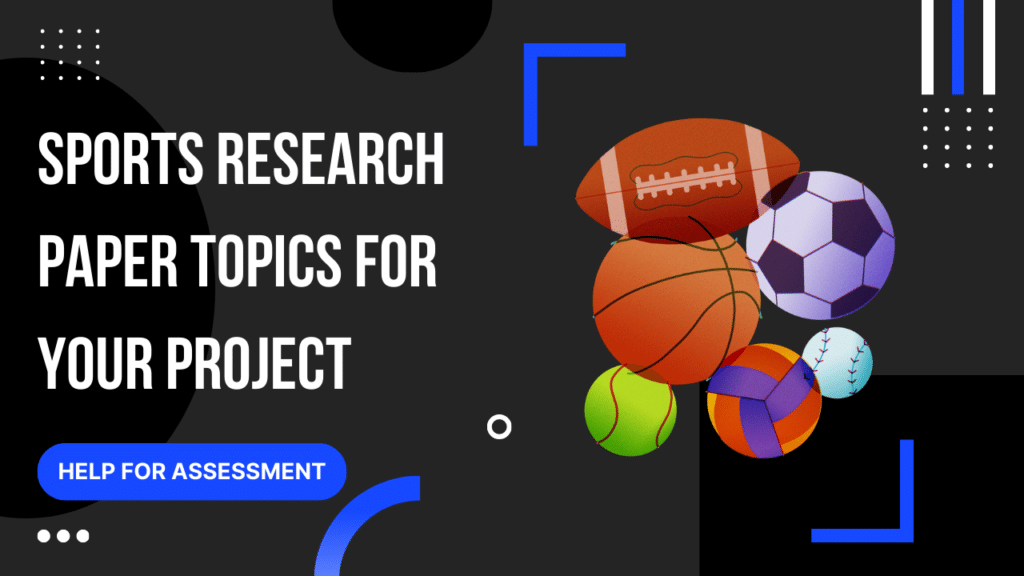
You can write a sports research paper on anything you want if your professor has given you the freedom to choose a topic. While you such an abundance of freedom, figuring out what to write can be a big challenge.
From American football and Superbowl to Commonwealth Games and everything in between, what topic should you write on exactly?
Ultimately, it’s up to you. However, you should choose a topic that doesn’t just fascinate you. Pick a topic that lets you find gaps in existing knowledge, so you can contribute new information to what we already know.
It’s fine if you don’t have a topic in mind yet, or if you find brainstorming and topic research process a pain in the chest. Below are some sports research paper topics and ideas that you might find interesting enough to explore.
Sports Research Paper Topics and Ideas
Here are some research paper topics in sports that you might find interesting to explore:
Athletics Training Research Paper Topics
- An analysis of the function of clinical examination and diagnosis for athletes before, during, and after athletic training
- Why there should be an immediate and emergency treatment facility at every sporting venue
- What function does the electrotherapy section play in a sports training facility?
- How to avoid injuries by utilizing anatomical knowledge
- Examining why it’s critical to administer first aid to a hurt athlete
Sports Psychology Research Topics
- How does a team’s performance change as they prepare for a game?
- Analyze the mental impact of extended training sessions.
- How do feelings affect a person’s ability to excel in sports?
- Describe the many societal influences on sports involvement.
- Techniques for evaluating sports athletes’ mental health
- Recognizing the cognitive and behavioral traits of athletes
Controversial Sports Science Topics
- Does a sportsperson’s performance depend on genetics?
- Should people play sports like badminton or volleyball?
- The effects of gambling on the effectiveness of sporting events
- Does the educational curriculum successfully accommodate sports activities?
- Why should women play football more frequently than men should?
- Analyze the prevalence of coronavirus infection in athletes.
- What impact does racism have on American sports?
Sports Exercise Research Topics
- Examining the reasons why so many individuals choose jogging in the morning
- Is a certified coach required while engaging in personal physical activity?
- What results may we expect from the TV-aired workout programs?
- Determining whether it’s necessary to consult doctors before selecting a physical fitness program
- Examine several medical disorders that call for regular exercise.
Sports Medicine Research Paper Topics
- How do physical therapists aid athletes in their rehabilitation from injuries?
- The function of nutritionists’ nutritional recommendations to athletics
- How do physical activities affect weight growth and loss?
- What impact can ripped muscles or shattered bones have on an athlete’s health?
- Resistance training’s effects on athletes’ body composition
- Analyze the benefits of skeletal muscle aerobic and strength training.
- What impact does Ramadan’s intermittent fasting have on athletes?
What Makes a Good Sports Research Paper?
You do want to complete your sports research paper on time, but there is more to it than just meeting then deadline. Your project has to be a comprehensive as possible, as your teacher will look at whether you’ve done thorough research and exhausted your topic.
Here are some pointers on what makes a good research paper in sports:
1. Demonstrate In-depth Research
Show that you conducted intensive research to detail the background of the topic. For example, a topic that touches on the American Football stadium must touch on the psychological and social factors of the game.
2. Use Sports Terms
Sure, your professor will more than likely buy into how simple and clear your research paper is. However, it will be a fail if you don’t use sports related terms in your project.
Include command terms in your work, explain them for clarity, and use them throughout your writing to demonstrate that you understand the topic.
Don’t hesitate to use examples for illustrations and clarity.
3. Write in a Friendly Tone
A research paper in sports doesn’t require creative writing . However, the tone shouldn’t be as robotic and complex as for a scientific paper.
We strongly recommend that you use a more relaxing and entertaining tone. However, don’t veer away from the rules of academic writing.
4. Ensure You Structure Your Work
A research paper in sports is a long project. Think of it like a storybook with different chapters that build on each other. In this respect, your work must have a clear structure that organizes your research in a logical order.
Check out our guide on how to structure a research paper if you don’t know how to do that yet.
5. Cite Your Sources
Your research paper will be nothing more than just pages with words if you don’t cite your sources .
Remember, your professor will assess whether you engaged in research. The way they do that is to check the appendix section to see if you’ve listed the source you used.
So, ensure you don’t overlook this as you write, and make sure you use the recommended citation format before you submit your work for review.
If you notice during the brainstorming stage that a topic won’t allow you to meet these criteria, drop it and pick another one. There’s no point trying to work on a sports topic that will outright fail.
Get Our Writing Service
Free features.

Need help to complete and ace your essay? Order our writing service.
Get all academic paper features for $65.77 FREE
About the author
Antony W is a professional writer and coach at Help for Assessment. He spends countless hours every day researching and writing great content filled with expert advice on how to write engaging essays, research papers, and assignments.
Click through the PLOS taxonomy to find articles in your field.
For more information about PLOS Subject Areas, click here .
Loading metrics
Open Access
Peer-reviewed
Research Article
Sport psychology and performance meta-analyses: A systematic review of the literature
Roles Conceptualization, Data curation, Formal analysis, Methodology, Project administration, Supervision, Writing – original draft, Writing – review & editing
* E-mail: [email protected]
Affiliations Department of Kinesiology and Sport Management, Texas Tech University, Lubbock, Texas, United States of America, Education Academy, Vytautas Magnus University, Kaunas, Lithuania
Roles Data curation, Methodology, Writing – original draft
Affiliation Department of Psychological Sciences, Texas Tech University, Lubbock, Texas, United States of America
Roles Data curation, Methodology
Roles Writing – original draft, Writing – review & editing
Affiliation Department of Kinesiology and Sport Management, Honors College, Texas Tech University, Lubbock, Texas, United States of America
Roles Data curation, Methodology, Writing – original draft, Writing – review & editing
Affiliation Faculty of Education, Health and Well-Being, University of Wolverhampton, Walsall, West Midlands, United Kingdom
Roles Data curation, Formal analysis, Methodology, Writing – original draft, Writing – review & editing
Affiliation Division of Research & Innovation, University of Southern Queensland, Toowoomba, Queensland, Australia
- Marc Lochbaum,
- Elisabeth Stoner,
- Tristen Hefner,
- Sydney Cooper,
- Andrew M. Lane,
- Peter C. Terry

- Published: February 16, 2022
- https://doi.org/10.1371/journal.pone.0263408
- Peer Review
- Reader Comments
Sport psychology as an academic pursuit is nearly two centuries old. An enduring goal since inception has been to understand how psychological techniques can improve athletic performance. Although much evidence exists in the form of meta-analytic reviews related to sport psychology and performance, a systematic review of these meta-analyses is absent from the literature. We aimed to synthesize the extant literature to gain insights into the overall impact of sport psychology on athletic performance. Guided by the PRISMA statement for systematic reviews, we reviewed relevant articles identified via the EBSCOhost interface. Thirty meta-analyses published between 1983 and 2021 met the inclusion criteria, covering 16 distinct sport psychology constructs. Overall, sport psychology interventions/variables hypothesized to enhance performance (e.g., cohesion, confidence, mindfulness) were shown to have a moderate beneficial effect ( d = 0.51), whereas variables hypothesized to be detrimental to performance (e.g., cognitive anxiety, depression, ego climate) had a small negative effect ( d = -0.21). The quality rating of meta-analyses did not significantly moderate the magnitude of observed effects, nor did the research design (i.e., intervention vs. correlation) of the primary studies included in the meta-analyses. Our review strengthens the evidence base for sport psychology techniques and may be of great practical value to practitioners. We provide recommendations for future research in the area.
Citation: Lochbaum M, Stoner E, Hefner T, Cooper S, Lane AM, Terry PC (2022) Sport psychology and performance meta-analyses: A systematic review of the literature. PLoS ONE 17(2): e0263408. https://doi.org/10.1371/journal.pone.0263408
Editor: Claudio Imperatori, European University of Rome, ITALY
Received: September 28, 2021; Accepted: January 18, 2022; Published: February 16, 2022
Copyright: © 2022 Lochbaum et al. This is an open access article distributed under the terms of the Creative Commons Attribution License , which permits unrestricted use, distribution, and reproduction in any medium, provided the original author and source are credited.
Data Availability: All relevant data are within the paper.
Funding: The author(s) received no specific funding for this work.
Competing interests: The authors have declared that no competing interests exist.
Introduction
Sport performance matters. Verifying its global importance requires no more than opening a newspaper to the sports section, browsing the internet, looking at social media outlets, or scanning abundant sources of sport information. Sport psychology is an important avenue through which to better understand and improve sport performance. To date, a systematic review of published sport psychology and performance meta-analyses is absent from the literature. Given the undeniable importance of sport, the history of sport psychology in academics since 1830, and the global rise of sport psychology journals and organizations, a comprehensive systematic review of the meta-analytic literature seems overdue. Thus, we aimed to consolidate the existing literature and provide recommendations for future research.
The development of sport psychology
The history of sport psychology dates back nearly 200 years. Terry [ 1 ] cites Carl Friedrich Koch’s (1830) publication titled [in translation] Calisthenics from the Viewpoint of Dietetics and Psychology [ 2 ] as perhaps the earliest publication in the field, and multiple commentators have noted that sport psychology experiments occurred in the world’s first psychology laboratory, established by Wilhelm Wundt at the University of Leipzig in 1879 [ 1 , 3 ]. Konrad Rieger’s research on hypnosis and muscular endurance, published in 1884 [ 4 ] and Angelo Mosso’s investigations of the effects of mental fatigue on physical performance, published in 1891 [ 5 ] were other early landmarks in the development of applied sport psychology research. Following the efforts of Koch, Wundt, Rieger, and Mosso, sport psychology works appeared with increasing regularity, including Philippe Tissié’s publications in 1894 [ 6 , 7 ] on psychology and physical training, and Pierre de Coubertin’s first use of the term sport psychology in his La Psychologie du Sport paper in 1900 [ 8 ]. In short, the history of sport psychology and performance research began as early as 1830 and picked up pace in the latter part of the 19 th century. Early pioneers, who helped shape sport psychology include Wundt, recognized as the “father of experimental psychology”, Tissié, the founder of French physical education and Legion of Honor awardee in 1932, and de Coubertin who became the father of the modern Olympic movement and founder of the International Olympic Committee.
Sport psychology flourished in the early 20 th century [see 1, 3 for extensive historic details]. For instance, independent laboratories emerged in Berlin, Germany, established by Carl Diem in 1920; in St. Petersburg and Moscow, Russia, established respectively by Avksenty Puni and Piotr Roudik in 1925; and in Champaign, Illinois USA, established by Coleman Griffith, also in 1925. The period from 1950–1980 saw rapid strides in sport psychology, with Franklin Henry establishing this field of study as independent of physical education in the landscape of American and eventually global sport science and kinesiology graduate programs [ 1 ]. In addition, of great importance in the 1960s, three international sport psychology organizations were established: namely, the International Society for Sport Psychology (1965), the North American Society for the Psychology of Sport and Physical Activity (1966), and the European Federation of Sport Psychology (1969). Since that time, the Association of Applied Sport Psychology (1986), the South American Society for Sport Psychology (1986), and the Asian-South Pacific Association of Sport Psychology (1989) have also been established.
The global growth in academic sport psychology has seen a large number of specialist publications launched, including the following journals: International Journal of Sport Psychology (1970), Journal of Sport & Exercise Psychology (1979), The Sport Psychologist (1987), Journal of Applied Sport Psychology (1989), Psychology of Sport and Exercise (2000), International Journal of Sport and Exercise Psychology (2003), Journal of Clinical Sport Psychology (2007), International Review of Sport and Exercise Psychology (2008), Journal of Sport Psychology in Action (2010), Sport , Exercise , and Performance Psychology (2014), and the Asian Journal of Sport & Exercise Psychology (2021).
In turn, the growth in journal outlets has seen sport psychology publications burgeon. Indicative of the scale of the contemporary literature on sport psychology, searches completed in May 2021 within the Web of Science Core Collection, identified 1,415 publications on goal setting and sport since 1985; 5,303 publications on confidence and sport since 1961; and 3,421 publications on anxiety and sport since 1980. In addition to academic journals, several comprehensive edited textbooks have been produced detailing sport psychology developments across the world, such as Hanrahan and Andersen’s (2010) Handbook of Applied Sport Psychology [ 9 ], Schinke, McGannon, and Smith’s (2016) International Handbook of Sport Psychology [ 10 ], and Bertollo, Filho, and Terry’s (2021) Advancements in Mental Skills Training [ 11 ] to name just a few. In short, sport psychology is global in both academic study and professional practice.
Meta-analysis in sport psychology
Several meta-analysis guides, computer programs, and sport psychology domain-specific primers have been popularized in the social sciences [ 12 , 13 ]. Sport psychology academics have conducted quantitative reviews on much studied constructs since the 1980s, with the first two appearing in 1983 in the form of Feltz and Landers’ meta-analysis on mental practice [ 14 ], which included 98 articles dating from 1934, and Bond and Titus’ cross-disciplinary meta-analysis on social facilitation [ 15 ], which summarized 241 studies including Triplett’s (1898) often-cited study of social facilitation in cycling [ 16 ]. Although much meta-analytic evidence exists for various constructs in sport and exercise psychology [ 12 ] including several related to performance [ 17 ], the evidence is inconsistent. For example, two meta-analyses, both ostensibly summarizing evidence of the benefits to performance of task cohesion [ 18 , 19 ], produced very different mean effects ( d = .24 vs d = 1.00) indicating that the true benefit lies somewhere in a wide range from small to large. Thus, the lack of a reliable evidence base for the use of sport psychology techniques represents a significant gap in the knowledge base for practitioners and researchers alike. A comprehensive systematic review of all published meta-analyses in the field of sport psychology has yet to be published.
Purpose and aim
We consider this review to be both necessary and long overdue for the following reasons: (a) the extensive history of sport psychology and performance research; (b) the prior publication of many meta-analyses summarizing various aspects of sport psychology research in a piecemeal fashion [ 12 , 17 ] but not its totality; and (c) the importance of better understanding and hopefully improving sport performance via the use of interventions based on solid evidence of their efficacy. Hence, we aimed to collate and evaluate this literature in a systematic way to gain improved understanding of the impact of sport psychology variables on sport performance by construct, research design, and meta-analysis quality, to enhance practical knowledge of sport psychology techniques and identify future lines of research inquiry. By systematically reviewing all identifiable meta-analytic reviews linking sport psychology techniques with sport performance, we aimed to evaluate the strength of the evidence base underpinning sport psychology interventions.
Materials and methods
This systematic review of meta-analyses followed the Preferred Reporting Items for Systematic Reviews and Meta-Analyses (PRISMA) guidelines [ 20 ]. We did not register our systematic review protocol in a database. However, we specified our search strategy, inclusion criteria, data extraction, and data analyses in advance of writing our manuscript. All details of our work are available from the lead author. Concerning ethics, this systematic review received a waiver from Texas Tech University Human Subject Review Board as it concerned archival data (i.e., published meta-analyses).
Eligibility criteria
Published meta-analyses were retained for extensive examination if they met the following inclusion criteria: (a) included meta-analytic data such as mean group, between or within-group differences or correlates; (b) published prior to January 31, 2021; (c) published in a peer-reviewed journal; (d) investigated a recognized sport psychology construct; and (e) meta-analyzed data concerned with sport performance. There was no language of publication restriction. To align with our systematic review objectives, we gave much consideration to study participants and performance outcomes. Across multiple checks, all authors confirmed study eligibility. Three authors (ML, AL, and PT) completed the final inclusion assessments.
Information sources
Authors searched electronic databases, personal meta-analysis history, and checked with personal research contacts. Electronic database searches occurred in EBSCOhost with the following individual databases selected: APA PsycINFO, ERIC, Psychology and Behavioral Sciences Collection, and SPORTDiscus. An initial search concluded October 1, 2020. ML, AL, and PT rechecked the identified studies during the February–March, 2021 period, which resulted in the identification of two additional meta-analyses [ 21 , 22 ].
Search protocol
ML and ES initially conducted independent database searches. For the first search, ML used the following search terms: sport psychology with meta-analysis or quantitative review and sport and performance or sport* performance. For the second search, ES utilized a sport psychology textbook and used the chapter title terms (e.g., goal setting). In EBSCOhost, both searches used the advanced search option that provided three separate boxes for search terms such as box 1 (sport psychology), box 2 (meta-analysis), and box 3 (performance). Specific details of our search strategy were:
Search by ML:
- sport psychology, meta-analysis, sport and performance
- sport psychology, meta-analysis or quantitative review, sport* performance
- sport psychology, quantitative review, sport and performance
- sport psychology, quantitative review, sport* performance
Search by ES:
- mental practice or mental imagery or mental rehearsal and sports performance and meta-analysis
- goal setting and sports performance and meta-analysis
- anxiety and stress and sports performance and meta-analysis
- competition and sports performance and meta-analysis
- diversity and sports performance and meta-analysis
- cohesion and sports performance and meta-analysis
- imagery and sports performance and meta-analysis
- self-confidence and sports performance and meta-analysis
- concentration and sports performance and meta-analysis
- athletic injuries and sports performance and meta-analysis
- overtraining and sports performance and meta-analysis
- children and sports performance and meta-analysis
The following specific search of the EBSCOhost with SPORTDiscus, APA PsycINFO, Psychology and Behavioral Sciences Collection, and ERIC databases, returned six results from 2002–2020, of which three were included [ 18 , 19 , 23 ] and three were excluded because they were not meta-analyses.
- Box 1 cohesion
- Box 2 sports performance
- Box 3 meta-analysis
Study selection
As detailed in the PRISMA flow chart ( Fig 1 ) and the specified inclusion criteria, a thorough study selection process was used. As mentioned in the search protocol, two authors (ML and ES) engaged independently with two separate searches and then worked together to verify the selected studies. Next, AL and PT examined the selected study list for accuracy. ML, AL, and PT, whilst rating the quality of included meta-analyses, also re-examined all selected studies to verify that each met the predetermined study inclusion criteria. Throughout the study selection process, disagreements were resolved through discussion until consensus was reached.
- PPT PowerPoint slide
- PNG larger image
- TIFF original image
https://doi.org/10.1371/journal.pone.0263408.g001
Data extraction process
Initially, ML, TH, and ES extracted data items 1, 2, 3 and 8 (see Data items). Subsequently, ML, AL, and PT extracted the remaining data (items 4–7, 9, 10). Checks occurred during the extraction process for potential discrepancies (e.g., checking the number of primary studies in a meta-analysis). It was unnecessary to contact any meta-analysis authors for missing information or clarification during the data extraction process because all studies reported the required information. Across the search for meta-analyses, all identified studies were reported in English. Thus, no translation software or searching out a native speaker occurred. All data extraction forms (e.g., data items and individual meta-analysis quality) are available from the first author.
To help address our main aim, we extracted the following information from each meta-analysis: (1) author(s); (2) publication year; (3) construct(s); (4) intervention based meta-analysis (yes, no, mix); (5) performance outcome(s) description; (6) number of studies for the performance outcomes; (7) participant description; (8) main findings; (9) bias correction method/results; and (10) author(s) stated conclusions. For all information sought, we coded missing information as not reported.
Individual meta-analysis quality
ML, AL, and PT independently rated the quality of individual meta-analysis on the following 25 points found in the PRISMA checklist [ 20 ]: title; abstract structured summary; introduction rationale, objectives, and protocol and registration; methods eligibility criteria, information sources, search, study selection, data collection process, data items, risk of bias of individual studies, summary measures, synthesis of results, and risk of bias across studies; results study selection, study characteristics, risk of bias within studies, results of individual studies, synthesis of results, and risk of bias across studies; discussion summary of evidence, limitations, and conclusions; and funding. All meta-analyses were rated for quality by two coders to facilitate inter-coder reliability checks, and the mean quality ratings were used in subsequent analyses. One author (PT), having completed his own ratings, received the incoming ratings from ML and AL and ran the inter-coder analysis. Two rounds of ratings occurred due to discrepancies for seven meta-analyses, mainly between ML and AL. As no objective quality categorizations (i.e., a point system for grouping meta-analyses as poor, medium, good) currently exist, each meta-analysis was allocated a quality score of up to a maximum of 25 points. All coding records are available upon request.
Planned methods of analysis
Several preplanned methods of analysis occurred. We first assessed the mean quality rating of each meta-analysis based on our 25-point PRISMA-based rating system. Next, we used a median split of quality ratings to determine whether standardized mean effects (SMDs) differed by the two formed categories, higher and lower quality meta-analyses. Meta-analysis authors reported either of two different effect size metrics (i.e., r and SMD); hence we converted all correlational effects to SMD (i.e., Cohen’s d ) values using an online effect size calculator ( www.polyu.edu.hk/mm/effectsizefaqs/calculator/calculator.html ). We interpreted the meaningfulness of effects based on Cohen’s interpretation [ 24 ] with 0.20 as small, 0.50 as medium, 0.80 as large, and 1.30 as very large. As some psychological variables associate negatively with performance (e.g., confusion [ 25 ], cognitive anxiety [ 26 ]) whereas others associate positively (e.g., cohesion [ 23 ], mental practice [ 14 ]), we grouped meta-analyses according to whether the hypothesized effect with performance was positive or negative, and summarized the overall effects separately. By doing so, we avoided a scenario whereby the demonstrated positive and negative effects canceled one another out when combined. The effect of somatic anxiety on performance, which is hypothesized to follow an inverted-U relationship, was categorized as neutral [ 35 ]. Last, we grouped the included meta-analyses according to whether the primary studies were correlational in nature or involved an intervention and summarized these two groups of meta-analyses separately.
Study characteristics
Table 1 contains extracted data from 30 meta-analyses meeting the inclusion criteria, dating from 1983 [ 14 ] to 2021 [ 21 ]. The number of primary studies within the meta-analyses ranged from three [ 27 ] to 109 [ 28 ]. In terms of the description of participants included in the meta-analyses, 13 included participants described simply as athletes, whereas other meta-analyses identified a mix of elite athletes (e.g., professional, Olympic), recreational athletes, college-aged volunteers (many from sport science departments), younger children to adolescents, and adult exercisers. Of the 30 included meta-analyses, the majority ( n = 18) were published since 2010. The decadal breakdown of meta-analyses was 1980–1989 ( n = 1 [ 14 ]), 1990–1999 ( n = 6 [ 29 – 34 ]), 2000–2009 ( n = 5 [ 23 , 25 , 26 , 35 , 36 ]), 2010–2019 ( n = 12 [ 18 , 19 , 22 , 27 , 37 – 43 , 48 ]), and 2020–2021 ( n = 6 [ 21 , 28 , 44 – 47 ]).
https://doi.org/10.1371/journal.pone.0263408.t001
As for the constructs covered, we categorized the 30 meta-analyses into the following areas: mental practice/imagery [ 14 , 29 , 30 , 42 , 46 , 47 ], anxiety [ 26 , 31 , 32 , 35 ], confidence [ 26 , 35 , 36 ], cohesion [ 18 , 19 , 23 ], goal orientation [ 22 , 44 , 48 ], mood [ 21 , 25 , 34 ], emotional intelligence [ 40 ], goal setting [ 33 ], interventions [ 37 ], mindfulness [ 27 ], music [ 28 ], neurofeedback training [ 43 ], perfectionism [ 39 ], pressure training [ 45 ], quiet eye training [ 41 ], and self-talk [ 38 ]. Multiple effects were generated from meta-analyses that included more than one construct (e.g., tension, depression, etc. [ 21 ]; anxiety and confidence [ 26 ]). In relation to whether the meta-analyses included in our review assessed the effects of a sport psychology intervention on performance or relationships between psychological constructs and performance, 13 were intervention-based, 14 were correlational, two included a mix of study types, and one included a large majority of cross-sectional studies ( Table 1 ).
A wide variety of performance outcomes across many sports was evident, such as golf putting, dart throwing, maximal strength, and juggling; or categorical outcomes such as win/loss and Olympic team selection. Given the extensive list of performance outcomes and the incomplete descriptions provided in some meta-analyses, a clear categorization or count of performance types was not possible. Sufficient to conclude, researchers utilized many performance outcomes across a wide range of team and individual sports, motor skills, and strength and aerobic tasks.
Effect size data and bias correction
To best summarize the effects, we transformed all correlations to SMD values (i.e., Cohen’s d ). Across all included meta-analyses shown in Table 2 and depicted in Fig 2 , we identified 61 effects. Having corrected for bias, effect size values were assessed for meaningfulness [ 24 ], which resulted in 15 categorized as negligible (< ±0.20), 29 as small (±0.20 to < 0.50), 13 as moderate (±0.50 to < 0.80), 2 as large (±0.80 to < 1.30), and 1 as very large (≥ 1.30).
https://doi.org/10.1371/journal.pone.0263408.g002
https://doi.org/10.1371/journal.pone.0263408.t002
Study quality rating results and summary analyses
Following our PRISMA quality ratings, intercoder reliability coefficients were initially .83 (ML, AL), .95 (ML, PT), and .90 (AL, PT), with a mean intercoder reliability coefficient of .89. To achieve improved reliability (i.e., r mean > .90), ML and AL re-examined their ratings. As a result, intercoder reliability increased to .98 (ML, AL), .96 (ML, PT), and .92 (AL, PT); a mean intercoder reliability coefficient of .95. Final quality ratings (i.e., the mean of two coders) ranged from 13 to 25 ( M = 19.03 ± 4.15). Our median split into higher ( M = 22.83 ± 1.08, range 21.5–25, n = 15) and lower ( M = 15.47 ± 2.42, range 13–20.5, n = 15) quality groups produced significant between-group differences in quality ( F 1,28 = 115.62, p < .001); hence, the median split met our intended purpose. The higher quality group of meta-analyses were published from 2015–2021 (median 2018) and the lower quality group from 1983–2014 (median 2000). It appears that meta-analysis standards have risen over the years since the PRISMA criteria were first introduced in 2009. All data for our analyses are shown in Table 2 .
Table 3 contains summary statistics with bias-corrected values used in the analyses. The overall mean effect for sport psychology constructs hypothesized to have a positive impact on performance was of moderate magnitude ( d = 0.51, 95% CI = 0.42, 0.58, n = 36). The overall mean effect for sport psychology constructs hypothesized to have a negative impact on performance was small in magnitude ( d = -0.21, 95% CI -0.31, -0.11, n = 24). In both instances, effects were larger, although not significantly so, among meta-analyses of higher quality compared to those of lower quality. Similarly, mean effects were larger but not significantly so, where reported effects in the original studies were based on interventional rather than correlational designs. This trend only applied to hypothesized positive effects because none of the original studies in the meta-analyses related to hypothesized negative effects used interventional designs.
https://doi.org/10.1371/journal.pone.0263408.t003
In this systematic review of meta-analyses, we synthesized the available evidence regarding effects of sport psychology interventions/constructs on sport performance. We aimed to consolidate the literature, evaluate the potential for meta-analysis quality to influence the results, and suggest recommendations for future research at both the single study and quantitative review stages. During the systematic review process, several meta-analysis characteristics came to light, such as the number of meta-analyses of sport psychology interventions (experimental designs) compared to those summarizing the effects of psychological constructs (correlation designs) on performance, the number of meta-analyses with exclusively athletes as participants, and constructs featuring in multiple meta-analyses, some of which (e.g., cohesion) produced very different effect size values. Thus, although our overall aim was to evaluate the strength of the evidence base for use of psychological interventions in sport, we also discuss the impact of these meta-analysis characteristics on the reliability of the evidence.
When seen collectively, results of our review are supportive of using sport psychology techniques to help improve performance and confirm that variations in psychological constructs relate to variations in performance. For constructs hypothesized to have a positive effect on performance, the mean effect strength was moderate ( d = 0.51) although there was substantial variation between constructs. For example, the beneficial effects on performance of task cohesion ( d = 1.00) and self-efficacy ( d = 0.82) are large, and the available evidence base for use of mindfulness interventions suggests a very large beneficial effect on performance ( d = 1.35). Conversely, some hypothetically beneficial effects (2 of 36; 5.6%) were in the negligible-to-small range (0.15–0.20) and most beneficial effects (19 of 36; 52.8%) were in the small-to-moderate range (0.22–0.49). It should be noted that in the world of sport, especially at the elite level, even a small beneficial effect on performance derived from a psychological intervention may prove the difference between success and failure and hence small effects may be of great practical value. To put the scale of the benefits into perspective, an authoritative and extensively cited review of healthy eating and physical activity interventions [ 49 ] produced an overall pooled effect size of 0.31 (compared to 0.51 for our study), suggesting sport psychology interventions designed to improve performance are generally more effective than interventions designed to promote healthy living.
Among hypothetically negative effects (e.g., ego climate, cognitive anxiety, depression), the mean detrimental effect was small ( d = -0.21) although again substantial variation among constructs was evident. Some hypothetically negative constructs (5 of 24; 20.8%) were found to actually provide benefits to performance, albeit in the negligible range (0.02–0.12) and only two constructs (8.3%), both from Lochbaum and colleagues’ POMS meta-analysis [ 21 ], were shown to negatively affect performance above a moderate level (depression: d = -0.64; total mood disturbance, which incorporates the depression subscale: d = -0.84). Readers should note that the POMS and its derivatives assess six specific mood dimensions rather than the mood construct more broadly, and therefore results should not be extrapolated to other dimensions of mood [ 50 ].
Mean effects were larger among higher quality than lower quality meta-analyses for both hypothetically positive ( d = 0.54 vs d = 0.45) and negative effects ( d = -0.25 vs d = 0.17), but in neither case were the differences significant. It is reasonable to assume that the true effects were derived from the higher quality meta-analyses, although our conclusions remain the same regardless of study quality. Overall, our findings provide a more rigorous evidence base for the use of sport psychology techniques by practitioners than was previously available, representing a significant contribution to knowledge. Moreover, our systematic scrutiny of 30 meta-analyses published between 1983 and 2021 has facilitated a series of recommendations to improve the quality of future investigations in the sport psychology area.
Recommendations
The development of sport psychology as an academic discipline and area of professional practice relies on using evidence and theory to guide practice. Hence, a strong evidence base for the applied work of sport psychologists is of paramount importance. Although the beneficial effects of some sport psychology techniques are small, it is important to note the larger performance benefits for other techniques, which may be extremely meaningful for applied practice. Overall, however, especially given the heterogeneity of the observed effects, it would be wise for applied practitioners to avoid overpromising the benefits of sport psychology services to clients and perhaps underdelivering as a result [ 1 ].
The results of our systematic review can be used to generate recommendations for how the profession might conduct improved research to better inform applied practice. Much of the early research in sport psychology was exploratory and potential moderating variables were not always sufficiently controlled. Terry [ 51 ] outlined this in relation to the study of mood-performance relationships, identifying that physical and skills factors will very likely exert a greater influence on performance than psychological factors. Further, type of sport (e.g., individual vs. team), duration of activity (e.g., short vs. long duration), level of competition (e.g., elite vs. recreational), and performance measure (e.g., norm-referenced vs. self-referenced) have all been implicated as potential moderators of the relationship between psychological variables and sport performance [ 51 ]. To detect the relatively subtle effects of psychological effects on performance, research designs need to be sufficiently sensitive to such potential confounds. Several specific methodological issues are worth discussing.
The first issue relates to measurement. Investigating the strength of a relationship requires the measured variables to be valid, accurate and reliable. Psychological variables in the meta-analyses we reviewed relied primarily on self-report outcome measures. The accuracy of self-report data requires detailed inner knowledge of thoughts, emotions, and behavior. Research shows that the accuracy of self-report information is subject to substantial individual differences [ 52 , 53 ]. Therefore, self-report data, at best, are an estimate of the measure. Measurement issues are especially relevant to the assessment of performance, and considerable measurement variation was evident between meta-analyses. Some performance measures were more sensitive, especially those assessing physical performance relative to what is normal for the individual performer (i.e., self-referenced performance). Hence, having multiple baseline indicators of performance increases the probability of identifying genuine performance enhancement derived from a psychological intervention [ 54 ].
A second issue relates to clarifying the rationale for how and why specific psychological variables might influence performance. A comprehensive review of prerequisites and precursors of athletic talent [ 55 ] concluded that the superiority of Olympic champions over other elite athletes is determined in part by a range of psychological variables, including high intrinsic motivation, determination, dedication, persistence, and creativity, thereby identifying performance-related variables that might benefit from a psychological intervention. Identifying variables that influence the effectiveness of interventions is a challenging but essential issue for researchers seeking to control and assess factors that might influence results [ 49 ]. A key part of this process is to use theory to propose the mechanism(s) by which an intervention might affect performance and to hypothesize how large the effect might be.
A third issue relates to the characteristics of the research participants involved. Out of convenience, it is not uncommon for researchers to use undergraduate student participants for research projects, which may bias results and restrict the generalization of findings to the population of primary interest, often elite athletes. The level of training and physical conditioning of participants will clearly influence their performance. Highly trained athletes will typically make smaller gains in performance over time than novice athletes, due to a ceiling effect (i.e., they have less room for improvement). For example, consider runner A, who takes 20 minutes to run 5km one week but 19 minutes the next week, and Runner B who takes 30 minutes one week and 25 minutes the next. If we compare the two, Runner A runs faster than Runner B on both occasions, but Runner B improved more, so whose performance was better? If we also consider Runner C, a highly trained athlete with a personal best of 14 minutes, to run 1 minute quicker the following week would almost require a world record time, which is clearly unlikely. For this runner, an improvement of a few seconds would represent an excellent performance. Evidence shows that trained, highly motivated athletes may reach performance plateaus and as such are good candidates for psychological skills training. They are less likely to make performance gains due to increased training volume and therefore the impact of psychological skills interventions may emerge more clearly. Therefore, both test-retest and cross-sectional research designs should account for individual difference variables. Further, the range of individual difference factors will be context specific; for example, individual differences in strength will be more important in a study that uses weightlifting as the performance measure than one that uses darts as the performance measure, where individual differences in skill would be more important.
A fourth factor that has not been investigated extensively relates to the variables involved in learning sport psychology techniques. Techniques such as imagery, self-talk and goal setting all require cognitive processing and as such some people will learn them faster than others [ 56 ]. Further, some people are intuitive self-taught users of, for example, mood regulation strategies such as abdominal breathing or listening to music who, if recruited to participate in a study investigating the effects of learning such techniques on performance, would respond differently to novice users. Hence, a major challenge when testing the effects of a psychological intervention is to establish suitable controls. A traditional non-treatment group offers one option, but such an approach does not consider the influence of belief effects (i.e., placebo/nocebo), which can either add or detract from the effectiveness of performance interventions [ 57 ]. If an individual believes that, an intervention will be effective, this provides a motivating effect for engagement and so performance may improve via increased effort rather than the effect of the intervention per se.
When there are positive beliefs that an intervention will work, it becomes important to distinguish belief effects from the proposed mechanism through which the intervention should be successful. Research has shown that field studies often report larger effects than laboratory studies, a finding attributed to higher motivation among participants in field studies [ 58 ]. If participants are motivated to improve, being part of an active training condition should be associated with improved performance regardless of any intervention. In a large online study of over 44,000 participants, active training in sport psychology interventions was associated with improved performance, but only marginally more than for an active control condition [ 59 ]. The study involved 4-time Olympic champion Michael Johnson narrating both the intervention and active control using motivational encouragement in both conditions. Researchers should establish not only the expected size of an effect but also to specify and assess why the intervention worked. Where researchers report performance improvement, it is fundamental to explain the proposed mechanism by which performance was enhanced and to test the extent to which the improvement can be explained by the proposed mechanism(s).

Limitations
Systematic reviews are inherently limited by the quality of the primary studies included. Our review was also limited by the quality of the meta-analyses that had summarized the primary studies. We identified the following specific limitations; (1) only 12 meta-analyses summarized primary studies that were exclusively intervention-based, (2) the lack of detail regarding control groups in the intervention meta-analyses, (3) cross-sectional and correlation-based meta-analyses by definition do not test causation, and therefore provide limited direct evidence of the efficacy of interventions, (4) the extensive array of performance measures even within a single meta-analysis, (5) the absence of mechanistic explanations for the observed effects, and (6) an absence of detail across intervention-based meta-analyses regarding number of sessions, participants’ motivation to participate, level of expertise, and how the intervention was delivered. To ameliorate these concerns, we included a quality rating for all included meta-analyses. Having created higher and lower quality groups using a median split of quality ratings, we showed that effects were larger, although not significantly so, in the higher quality group of meta-analyses, all of which were published since 2015.
Conclusions
Journals are full of studies that investigate relationships between psychological variables and sport performance. Since 1983, researchers have utilized meta-analytic methods to summarize these single studies, and the pace is accelerating, with six relevant meta-analyses published since 2020. Unquestionably, sport psychology and performance research is fraught with limitations related to unsophisticated experimental designs. In our aggregation of the effect size values, most were small-to-moderate in meaningfulness with a handful of large values. Whether these moderate and large values could be replicated using more sophisticated research designs is unknown. We encourage use of improved research designs, at the minimum the use of control conditions. Likewise, we encourage researchers to adhere to meta-analytic guidelines such as PRISMA and for journals to insist on such adherence as a prerequisite for the acceptance of reviews. Although such guidelines can appear as a ‘painting by numbers’ approach, while reviewing the meta-analyses, we encountered difficulty in assessing and finding pertinent information for our study characteristics and quality ratings. In conclusion, much research exists in the form of quantitative reviews of studies published since 1934, almost 100 years after the very first publication about sport psychology and performance [ 2 ]. Sport psychology is now truly global in terms of academic pursuits and professional practice and the need for best practice information plus a strong evidence base for the efficacy of interventions is paramount. We should strive as a profession to research and provide best practices to athletes and the general community of those seeking performance improvements.
Supporting information
S1 checklist..
https://doi.org/10.1371/journal.pone.0263408.s001
Acknowledgments
We acknowledge the work of all academics since Koch in 1830 [ 2 ] for their efforts to research and promote the practice of applied sport psychology.
- 1. Terry PC. Applied Sport Psychology. IAAP Handbook of Applied Psychol. Wiley-Blackwell; 2011 Apr 20;386–410.
- 2. Koch CF. Die Gymnastik aus dem Gesichtspunkte der Diätetik und Psychologie [Callisthenics from the Viewpoint of Dietetics and Psychology]. Magdeburg, Germany: Creutz; 1830.
- 3. Chroni S, Abrahamsen F. History of Sport, Exercise, and Performance Psychology in Europe. Oxford Research Encyclopedia of Psychology. Oxford: Oxford University Press; 2017 Dec 19. https://doi.org/10.1093/acrefore/9780190236557.013.135
- 4. Rieger K. Der Hypnotismus: Psychiatrische Beiträge zur Kenntniss der Sogenannten Hypnotischen Zustände [Hypnotism: Psychiatric Contributions to the Knowledge of the So-called Hypnotic States]. Würzburg, Germany: University of Würzburg; 1884.
- 5. Mosso, A. La fatica [Fatigue]. Milan, Italy: Treves; 1891 [trans. 1904].
- View Article
- Google Scholar
- 9. Hanrahan SJ, Andersen MB, editors. Routledge Handbook of Applied Sport Psychology. London: Routledge; 2010.
- 10. Schinke RJ, McGannon KR, Smith B, editors. Routledge International Handbook of Sport Psychology. London: Routledge; 2016.
- 11. Bertollo M, Filho E, Terry PC. Advancements in Mental Skills Training: International Perspectives on Key Issues in Sport and Exercise Psychology. London: Routledge; 2021.
- PubMed/NCBI
- 17. Lochbaum M. Understanding the meaningfulness and potential impact of sports psychology on performance. In: Milanović D, Sporiš G, Šalaj S, Škegro D, editors, Proceedings book of 8th International Scientific Conference on Kinesiology, Opatija. Zagreb, Croatia: University of Zagreb, Faculty of Kinesiology; 2017. pp. 486–489.
- 24. Cohen J. Statistical Power Analysis for the Behavioral Sciences. New York: Routledge Academic; 1988.
- 50. Ekkekakis P. The Measurement of Affect, Mood, and Emotion. Cambridge: Cambridge University Press; 2013.
80 Exciting Sports Research Topics for Winning Moments in 2023

Sports are an important part of our lives. Cricket, soccer, hockey, or rugby. Impossible to imagine a life without sports.
Sports are not just games that we play for fun or recreation. They are also a way to stay fit and healthy and develop teamwork and communication skills.
While some play sports, most watch them; plenty of academics love to do research and make them better and more fun. After offering professional writing help , we can share loads of information with you. As we see you here, it means that you are one of those researchers, too, looking for some inspiration to find your sports research topics.
Table of Contents
Sports Research Topics: Cricket, Football, Hockey, Badminton, and more
Sports research is a very broad topic; it can take time for your supervisor to find sports research paper topics. This list of sports research paper topics may help you.
This list should give you some ideas for your next project, but feel free to explore other areas too!
Sports Research Paper Topics: Football
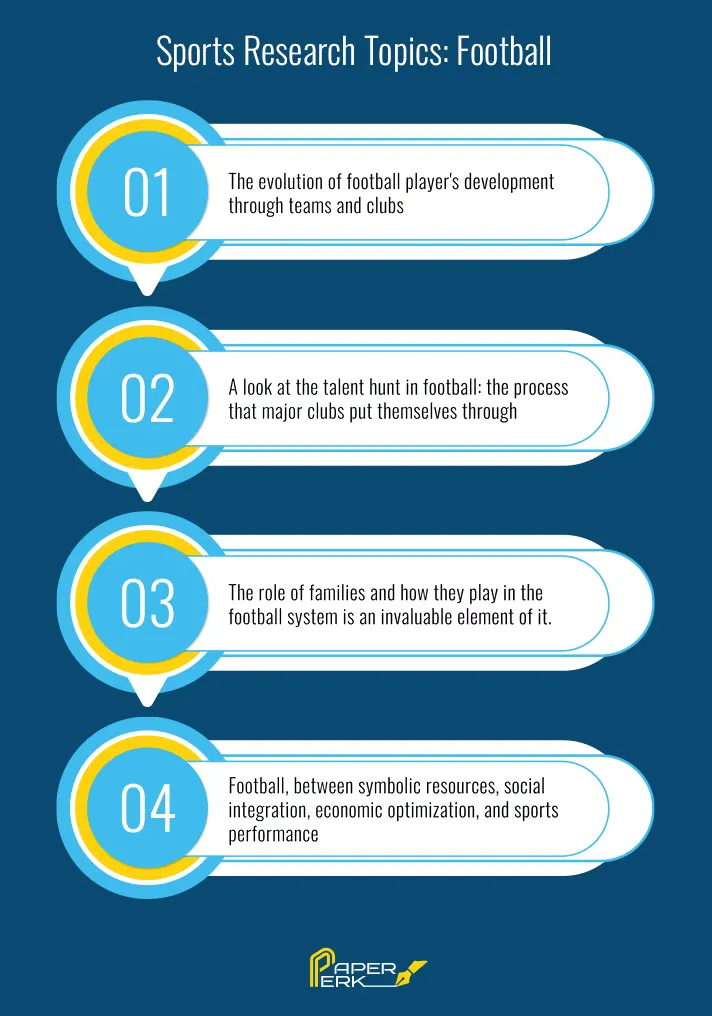
FIFA 2022 was one of the greatest events in human history. It is a trend, and you can follow it with our sports research paper topics.
- The evolution of football player’splayer’s development through teams and clubs
- A look at the talent hunt in football: the process that major clubs put themselves through
- The role of families and how they play in the football system is an invaluable element of it.
- The game of football is a symbol of a specific region
- The local authorities that fund football at a local level
- The basic elements and core motivations of football fans
- Models and scales of football that are different from one another
- FIFA 2022: An in-depth analysis of the biggest upsets in the history of the game
- The selection of young football talents to represent the Club
- Football, between symbolic resources, social integration, economic optimization, and sports performance
- Why did the African and Arab teams win the FIFA 2022 championship?
- Exercise and fatigue when there is an intermittent activity
- Developing and improving stamina to be able to play 90 minutes of a match
- Reduced level of play and playing conditions as a result
- An analysis of the footballer’sfootballer’s activity over some time
- Match goals according to the period in which the match took place
- Aspects of physical preparation in the analysis of performance factors
- The amount of time the ball was in possession and the average amount of touches it received
- The history and evolution of yellow and red cards in football: A study of the history and evolution of the rules
- An analysis of the technical-tactical activity of football players
- Analyzing a footballer’sfootballer’s physical activity based on physiology
- An overview of intermittent exercise and its different forms
Thinking about starting your research? Let’sLet’s explore How To Write A Research Paper Fast?
Sports Research Topics: Cricket
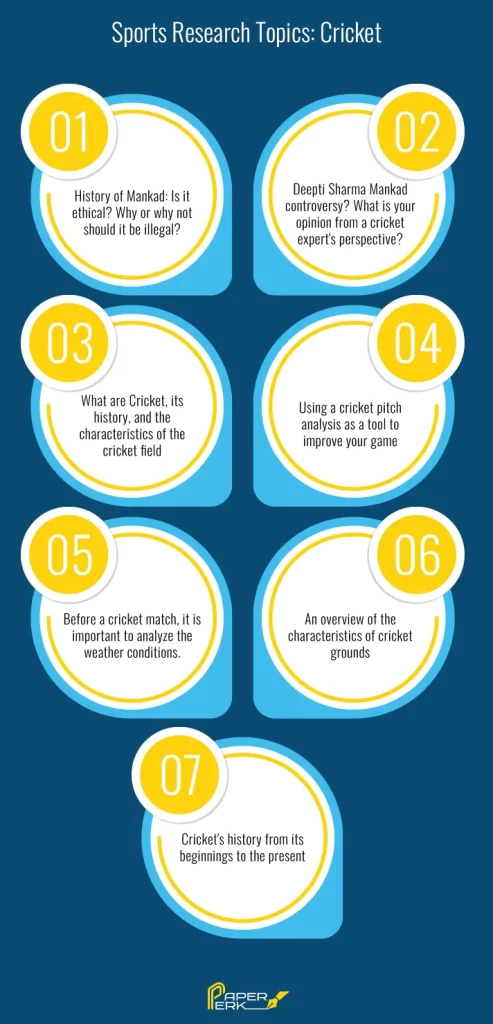
Cricket is one of the most discussed sports research paper topics. Here are some ideas for sports research for sports science students
- History of Mankad: Is it ethical? Why or why not should it be illegal?
- Deepti Sharma Mankad controversy? What is your opinion from a cricket expert’sexpert’s perspective?
- What are Cricket, its history, and the characteristics of the cricket field
- Use a cricket pitch analysis as a tool to improve your game.
- Before a cricket match, it is important to analyze the weather conditions.
- An overview of the characteristics of cricket grounds
- Cricket’sCricket’s history from its beginnings to the present
- The history and struggles of women women’s Cricket in the world
- What are the differences between women’s Cricket and men’smen’s Cricket?
- The Mankad controversy what are your thoughts on it?
- Shoaib Akhtar was one of the fastest bowlers in Cricket. But what made him so fast? Study of a biographical nature through a biographical analysis
- What makes Australian Cricket so unbeatable?
- What the Australians did to defeat England, one of the pioneers of Cricket?
- In the history of Cricket, there has been a great deal of change: How do you form a thesis on the topic?
- Test cricket’scricket’s history from the beginning to the present
- An introduction to the history of one-day Cricket
- A brief history of T20 Internationals
- An interesting research study to see how Cricket has evolved in South Asia over the centuries
- A summary of the game of Cricket.
- A brief description of Cricket’sCricket’s rules and strategies
- An analysis of the role of the empires during a cricket match
- The Third Empire and advancements in camera technology help the cricket game improve detail.
- What is the origin and etymology of the word Cricket?
- Globalization of Cricket as it relates to the game
- A brief explanation of the cricketing principle
- What are the rules of Cricket?
- A description of the cricket bat and ball that can be used for Cricket
- The cricket glossary: a complete guide to the game
Worried about your outline? How To Write A Research Paper Outline ?
Sports Research Topics: Hockey
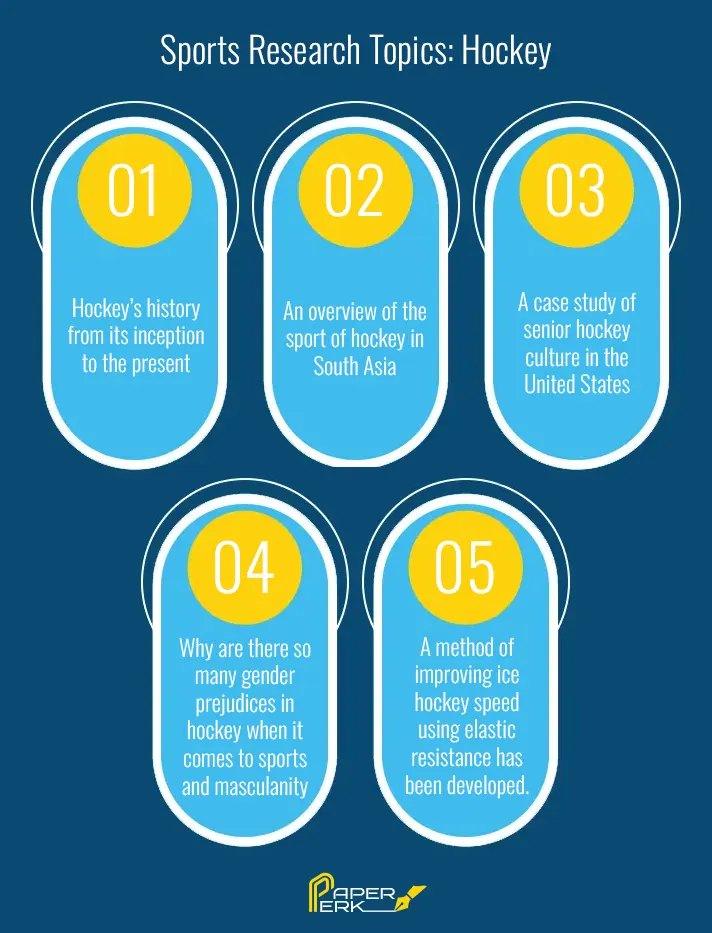
If you are more of a hockey fan, here are some more sports research paper topics that are all about hockey.
- Hockey’s history from its inception to the present
- An overview of the sport of hockey in South Asia
- A case study of senior hockey culture in the United States
- Why are there so many gender prejudices in hockey when it comes to sports and masculinity
- A method of improving ice hockey speed using elastic resistance has been developed.
- The friction between the puck and the ice in ice hockey
- What are the most effective strategies for ice hockey clubs and the federation regarding ice hockey in the United States?
- Sports marketing strategies and hockey marketing strategies
- The development and progress of hockey in the United States
- An overview of the history of hockey in Pakistan
- Hockey as a derivative game: an in-depth analysis
- Role of USA Hockey in encouraging youngsters to play ice-hockey
Curious about more research topics? Have a look at Paper Perk’sPerk’s 402 Best Research Paper Topics
Sports Research Topics: Fitness & Health

When writing on sports research paper topics, we must always pay attention to fitness and health. That is the reason we play sports, don’t we?
- Sports measurement of the projected frontal surface of the human body
- The effectiveness of two upper limb training methods in increasing lower limb explosiveness
- How can sports nutrition help heal sports injuries?
- Competitive judo performance after passive, active, and electrostimulation recovery modes
- Handball performance is improved through visual perceptual preparation and speed improvement
- Sports injuries faced by female athletes
- Regional-level footballers and speed training frequency
- Sports nutrition as a branch of sports science
- Role of sports science in avoiding and healing sports injuries
- Short-term and long-term effects of self-massage on performance and flexibility
- Physical performance following standard and potentiator warm-ups
- Extensor force at isometric knee extension is related to extensor force at maximal knee extension
- Sports nutrition for female athletes
- Insights into how running is influenced by footwear and instructions
- Developing and evaluating a sports program for type 2 diabetics
- Age-related changes in muscle strength and balance following CrossFit training
- Analyzing the kinematics of an opposition football game
- Can sports nutrition help improve sports psychology in young athletes?
- An analysis of musculotendinous stiffness among athletes of different levels and activities
- Importance of joining a sports club for young athletes
- Variations in heart rate induced by workload
- In sports, how can strength and power gains be maximized?
Also related: 264 Medical Research Topics for The Proposal Of The Year
Sports Research Topics: Rugby
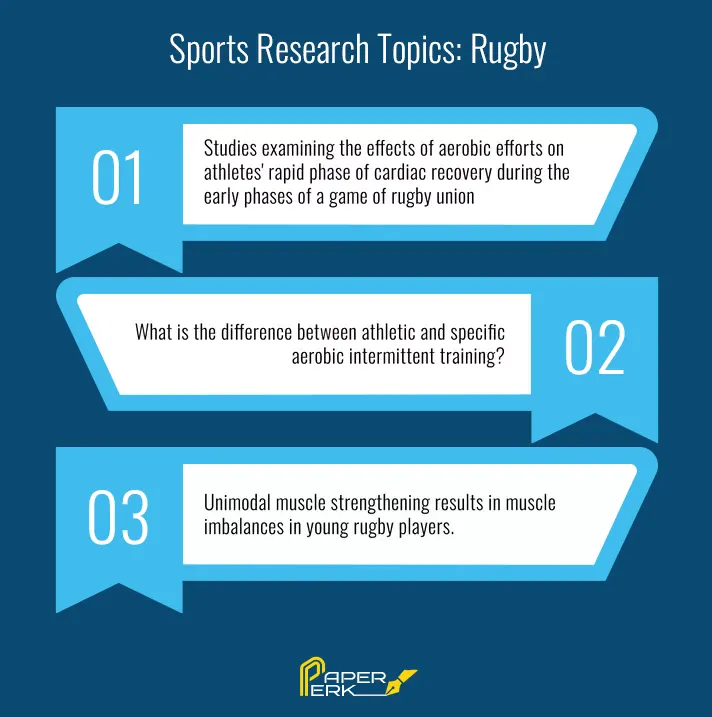
- Studies examining the effects of aerobic efforts on athletes’athletes’ rapid phase of cardiac recovery during the early phases of a game of rugby union
- What is the difference between athletic and specific aerobic intermittent training?
- Unimodal muscle strengthening results in muscle imbalances in young rugby players.
Athletic training Research Topics
- Sports psychology in team sports to form a healthy and friendly athletic behavior
- Team sports and the importance of sports celebrities in sports marketing
- How to write a sports medicine research paper? How to evaluate the medical accuracy and maintain nutritional data
- Athletic training for extreme sports during the Olympic games
- An examination of sports psychology from a clinical perspective
- Taking part in extreme sports is one of the most extreme types of recreation that you can do
- A study of the physiology and psychology of sport during athletic training
General Sports Topics
- The sports industry as an important sector of the country’scountry’s economy
- Sports industry as more than an economic effort
- How can professional athletes make the world a better place by playing friendly sports?
- Do you think about the pros and cons of professional athletes being portrayed as sports celebrities?
- Athletes play a major role in the promotion of the Olympics
- The best way for college students to become professional athletes
- What can youth sports do to help teams find professional athletes who can make a huge difference in their teams?
- How to write an interesting sports research paper as a college athlete?
- Role of college athletes to promote sports on a town level
- What role can sports news media firms play in promoting sports events?
- Sports psychology topics related to athletics performance
- A sports competition is a great source for research on sports psychology topics
- Role of sports in physical education and sports medicine
- Research on the athletic training and psychological analysis of successful sports personalities
- A study of sports performance based on athletic training
- How can athletic training help gain more and more sports trophies?
- Essentials of athletic training of a sports person
- Sports paper on athletic training
- A sports paper on how different genders perceive sports differently
Sports are an important part of our lives. It may be possible to live without them, but that won’t be a very good life. Would it? Our sports research topics will help you score the goal right into the heart of your supervisor. If you still need assistance with your research paper, you can contact our team of writers . We can help you with any thesis or research problem you are facing.
Order Original Papers & Essays
Your First Custom Paper Sample is on Us!
Timely Deliveries
No Plagiarism & AI
100% Refund
Try Our Free Paper Writing Service
Related blogs.

Connections with Writers and support
Privacy and Confidentiality Guarantee
Average Quality Score
- Browse All Articles
- Newsletter Sign-Up

- 26 Apr 2024
Deion Sanders' Prime Lessons for Leading a Team to Victory
The former star athlete known for flash uses unglamorous command-and-control methods to get results as a college football coach. Business leaders can learn 10 key lessons from the way 'Coach Prime' builds a culture of respect and discipline without micromanaging, says Hise Gibson.

- 29 Feb 2024
Beyond Goals: David Beckham's Playbook for Mobilizing Star Talent
Reach soccer's pinnacle. Become a global brand. Buy a team. Sign Lionel Messi. David Beckham makes success look as easy as his epic free kicks. But leveraging world-class talent takes discipline and deft decision-making, as case studies by Anita Elberse reveal. What could other businesses learn from his ascent?
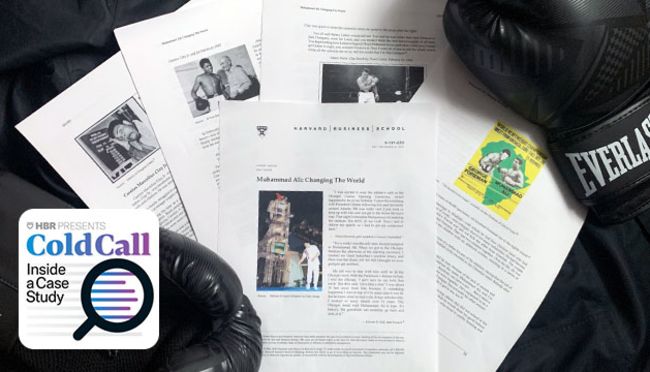
- 28 Feb 2023
- Cold Call Podcast
Muhammad Ali: A Case Study in Purpose-Driven Decision Making
Muhammad Ali, born Cassius Marcellus Clay Jr., rose from a poor family in segregated Louisville, Kentucky to international fame, winning three heavyweight boxing titles and becoming a civil rights leader and role model for millions of people around the world. How did he do it? Early in his career, Ali’s creativity and hard work helped him overcome significant obstacles. Rather than letting his fear of flying keep him from competing in the 1960 Olympics, he traveled to Italy wearing a parachute -- and easily won the gold medal in boxing. When he returned to the U.S. as a gold medalist, Ali used his growing fame to bring attention to racism and humanitarian causes he supported, including his then-controversial decision to refuse to fight in the Vietnam War. Professor Robert Simons discusses how Ali made decisions throughout his life and career to leave a lasting impact on the world in his case, “Muhammad Ali: Changing the World.”
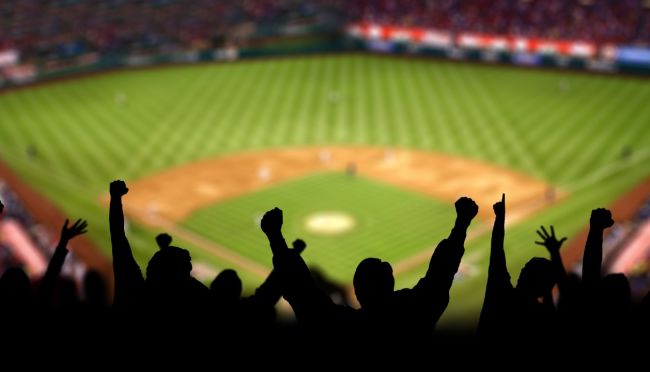
- 25 Oct 2022
- Research & Ideas
Is Baseball Ready to Compete for the Next Generation of Fans?
With its slower pace and limited on-field action, major league baseball trails football in the US, basketball, and European soccer in revenue and popularity. Stephen Greyser discusses the state of "America's pastime."
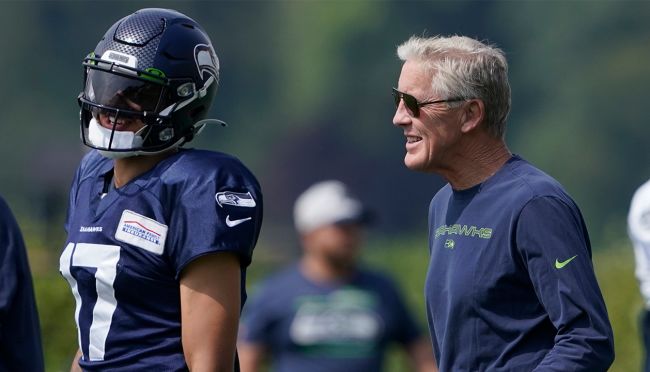
- 01 Nov 2021
Team Success Starts with the Individual—and with Love
Many leaders see teams as collective units, but helping individual members reach their potential—personally and professionally—can open new opportunities. Ranjay Gulati looks at the philosophy of famed football coach Pete Carroll. Open for comment; 0 Comments.

- 12 Oct 2021
What Actually Draws Sports Fans to Games? It's Not Star Athletes.
Team owners think they need marquee names or slick stadiums to prosper, but research by Karim Lakhani and Patrick Ferguson suggests that fans want something far simpler: suspense. Open for comment; 0 Comments.

- 27 Jul 2021
Mixing Sports and Money: Adidas and the Commercialization of the Olympics
Horst Dassler, the son of the founder of Adidas, cultivated relationships with athletes and national associations—with the aim of expanding his family’s sports apparel business. In doing so, he created the first sports sponsorships for the Olympics, and ultimately became a key force behind the commercialization of sports today. Professor Geoffrey Jones explores the pros and cons of the globalization and commercialization of sport in his case, spanning from the 1930s to the 1970s, “Horst Dassler, Adidas, and the Commercialization of Sport.” Open for comment; 0 Comments.

- 17 Mar 2021
- Working Paper Summaries
Consuming Contests: Outcome Uncertainty and Spectator Demand for Contest-based Entertainment
Analysis of Australian Football League data shows that the uncertainty of game outcomes has a large, positive causal effect on stadium attendance. These findings show how competitive balance is important for contest designers in general and sports leagues in particular.
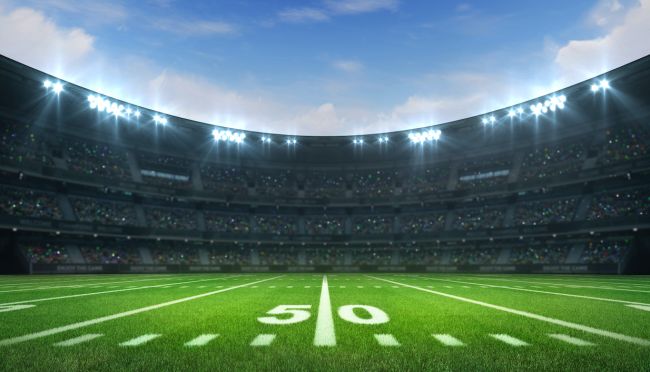
- 24 Apr 2020
Lessons from the NFL: Virtual Hiring, Leadership, Building Teams and COVID-19
The National Football League player draft this year is challenging for the league, players, fans and, in particular, talent evaluators, reports Boris Groysberg and colleagues. What can business learn? Open for comment; 0 Comments.

- 08 Jan 2020
NFL Head Coaches Are Getting Younger. What Can Organizations Learn?
Football team owners are hiring younger head coaches, hoping to unleash innovation and fresh thinking. How's that working out? Research by Boris Groysberg and colleagues. Open for comment; 0 Comments.
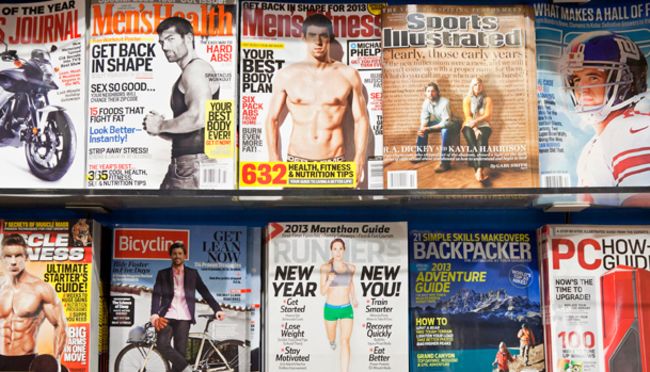
- 23 Jan 2019
- Sharpening Your Skills
Sports: Lessons for Managers
When people look to illustrate a great business idea or accomplishment, a sports metaphor usually isn't far away. Why Harvard Business School researchers look for teaching gold on the playing fields of the world. Open for comment; 0 Comments.
- 17 Jul 2016
More Effective Sports Sponsorship—Combining and Integrating Key Resources and Capabilities of International Sports Events and Their Major Sponsors
This field-based study of the Union of European Football Associations and its main international sporting event, the European Championships, explores key organizational capabilities that underlie value creation and enhancement in an event’s portfolio of sponsorship relationships. Developing and employing these capabilities--collaborative, absorptive, adaptive, and learning--have positive results for the event as well as for its sponsors. When effectively undertaken and coordinated, the activities can lead to ongoing renewals of the sponsorship program and open the door for new sponsors. The study’s perspective is that of the event, unusual in research on sponsorship.
- 08 Jan 2016
Is it Worth a Pay Cut to Work for a Great Manager (Like Bill Belichick)?
Few of us want to take less money to move to another organization, but Boris Groysberg and Abhijit Naik point to research that shows hooking up with the right manager—whether in sports or business—can quickly increase your value even if your pay is less. Open for comment; 0 Comments.
- 03 Jan 2016
NFL Black Monday: How Much Do Coaches Really Matter?
Teams planning management changes on "Black Monday" can learn much from academic research on National Football League coaches, say Boris Groysberg and Abhijit Naik. The findings hold value not only for football teams, but for any organization that depends on leadership for success. Open for comment; 0 Comments.
- 26 Oct 2015
What’s the Value of a Win in College Athletics?
As debate continues over whether student-athletes should be paid, professor Doug Chung’s research on the massive money being earned by collegiate football and basketball programs could help guide the answer. Open for comment; 0 Comments.
- 06 Mar 2006
Winners and Losers at the Olympics
We know which athletes won and lost in Turin, but what about the companies and individuals looking for business gold? Professor Stephen A. Greyser looks at the results—and the possibilities ahead in China. Closed for comment; 0 Comments.
- Open access
- Published: 21 May 2024
The bright side of sports: a systematic review on well-being, positive emotions and performance
- David Peris-Delcampo 1 ,
- Antonio Núñez 2 ,
- Paula Ortiz-Marholz 3 ,
- Aurelio Olmedilla 4 ,
- Enrique Cantón 1 ,
- Javier Ponseti 2 &
- Alejandro Garcia-Mas 2
BMC Psychology volume 12 , Article number: 284 ( 2024 ) Cite this article
394 Accesses
Metrics details
The objective of this study is to conduct a systematic review regarding the relationship between positive psychological factors, such as psychological well-being and pleasant emotions, and sports performance.
This study, carried out through a systematic review using PRISMA guidelines considering the Web of Science, PsycINFO, PubMed and SPORT Discus databases, seeks to highlight the relationship between other more ‘positive’ factors, such as well-being, positive emotions and sports performance.
The keywords will be decided by a Delphi Method in two rounds with sport psychology experts.
Participants
There are no participants in the present research.
The main exclusion criteria were: Non-sport thema, sample younger or older than 20–65 years old, qualitative or other methodology studies, COVID-related, journals not exclusively about Psychology.
Main outcomes measures
We obtained a first sample of 238 papers, and finally, this sample was reduced to the final sample of 11 papers.
The results obtained are intended to be a representation of the ‘bright side’ of sports practice, and as a complement or mediator of the negative variables that have an impact on athletes’ and coaches’ performance.
Conclusions
Clear recognition that acting on intrinsic motivation continues to be the best and most effective way to motivate oneself to obtain the highest levels of performance, a good perception of competence and a source of personal satisfaction.
Peer Review reports
Introduction
In recent decades, research in the psychology of sport and physical exercise has focused on the analysis of psychological variables that could have a disturbing, unfavourable or detrimental role, including emotions that are considered ‘negative’, such as anxiety/stress, sadness or anger, concentrating on their unfavourable relationship with sports performance [ 1 , 2 , 3 , 4 ], sports injuries [ 5 , 6 , 7 ] or, more generally, damage to the athlete’s health [ 8 , 9 , 10 ]. The study of ‘positive’ emotions such as happiness or, more broadly, psychological well-being, has been postponed at this time, although in recent years this has seen an increase that reveals a field of study of great interest to researchers and professionals [ 11 , 12 , 13 ] including physiological, psychological, moral and social beneficial effects of the physical activity in comic book heroes such as Tintin, a team leader, which can serve as a model for promoting healthy lifestyles, or seeking ‘eternal youth’ [ 14 ].
Emotions in relation to their effects on sports practice and performance rarely go in one direction, being either negative or positive—generally positive and negative emotions do not act alone [ 15 ]. Athletes experience different emotions simultaneously, even if they are in opposition and especially if they are of mild or moderate intensity [ 16 ]. The athlete can feel satisfied and happy and at the same time perceive a high level of stress or anxiety before a specific test or competition. Some studies [ 17 ] have shown how sports participation and the perceived value of elite sports positively affect the subjective well-being of the athlete. This also seems to be the case in non-elite sports practice. The review by Mansfield et al. [ 18 ] showed that the published literature suggests that practising sports and dance, in a group or supported by peers, can improve the subjective well-being of the participants, and also identifies negative feelings towards competence and ability, although the quantity and quality of the evidence published is low, requiring better designed studies. All these investigations are also supported by the development of the concept of eudaimonic well-being [ 19 ], which is linked to the development of intrinsic motivation, not only in its aspect of enjoyment but also in its relationship with the perception of competition and overcoming and achieving goals, even if this is accompanied by other unpleasant hedonic emotions or even physical discomfort. Shortly after a person has practised sports, he will remember those feelings of exhaustion and possibly stiffness, linked to feelings of satisfaction and even enjoyment.
Furthermore, the mediating role of parents, coaches and other psychosocial agents can be significant. In this sense, Lemelin et al. [ 20 ], with the aim of investigating the role of autonomy support from parents and coaches in the prediction of well-being and performance of athletes, found that autonomy support from parents and coaches has positive relationships with the well-being of the athlete, but that only coach autonomy support is associated with sports performance. This research suggests that parents and coaches play important but distinct roles in athlete well-being and that coach autonomy support could help athletes achieve high levels of performance.
On the other hand, an analysis of emotions in the sociocultural environment in which they arise and gain meaning is always interesting, both from an individual perspective and from a sports team perspective. Adler et al. [ 21 ] in a study with military teams showed that teams with a strong emotional culture of optimism were better positioned to recover from poor performance, suggesting that organisations that promote an optimistic culture develop more resilient teams. Pekrun et al. [ 22 ] observed with mathematics students that individual success boosts emotional well-being, while placing people in high-performance groups can undermine it, which is of great interest in investigating the effectiveness and adjustment of the individual in sports teams.
There is still little scientific literature in the field of positive emotions and their relationship with sports practice and athlete performance, although their approach has long had its clear supporters [ 23 , 24 ]. It is comforting to observe the significant increase in studies in this field, since some authors (e.g [ 25 , 26 ]). . , point out the need to overcome certain methodological and conceptual problems, paying special attention to the development of specific instruments for the evaluation of well-being in the sports field and evaluation methodologies.
As McCarthy [ 15 ] indicates, positive emotions (hedonically pleasant) can be the catalysts for excellence in sport and deserve a space in our research and in professional intervention to raise the level of athletes’ performance. From a holistic perspective, positive emotions are permanently linked to psychological well-being and research in this field is necessary: firstly because of the leading role they play in human behaviour, cognition and affection, and secondly, because after a few years of international uncertainty due to the COVID-19 pandemic and wars, it seems ‘healthy and intelligent’ to encourage positive emotions for our athletes. An additional reason is that they are known to improve motivational processes, reducing abandonment and negative emotional costs [ 11 ]. In this vein, concepts such as emotional intelligence make sense and can help to identify and properly manage emotions in the sports field and determine their relationship with performance [ 27 ] that facilitates the inclusion of emotional training programmes based on the ‘bright side’ of sports practice [ 28 ].
Based on all of the above, one might wonder how these positive emotions are related to a given event and what role each one of them plays in the athlete’s performance. Do they directly affect performance, or do they affect other psychological variables such as concentration, motivation and self-efficacy? Do they favour the availability and competent performance of the athlete in a competition? How can they be regulated, controlled for their own benefit? How can other psychosocial agents, such as parents or coaches, help to increase the well-being of their athletes?
This work aims to enhance the leading role, not the secondary, of the ‘good and pleasant side’ of sports practice, either with its own entity, or as a complement or mediator of the negative variables that have an impact on the performance of athletes and coaches. Therefore, the objective of this study is to conduct a systematic review regarding the relationship between positive psychological factors, such as psychological well-being and pleasant emotions, and sports performance. For this, the methodological criteria that constitute the systematic review procedure will be followed.
Materials and methods
This study was carried out through a systematic review using PRISMA (Preferred Reporting Items for Systematic Reviews) guidelines considering the Web of Science (WoS) and Psycinfo databases. These two databases were selected using the Delphi method [ 29 ]. It does not include a meta-analysis because there is great data dispersion due to the different methodologies used [ 30 ].
The keywords will be decided by the Delphi Method in two rounds with sport psychology experts. The results obtained are intended to be a representation of the ‘bright side’ of sports practice, and as a complement or mediator of the negative variables that have an impact on athletes’ and coaches’ performance.
It was determined that the main construct was to be psychological well-being, and that it was to be paired with optimism, healthy practice, realisation, positive mood, and performance and sport. The search period was limited to papers published between 2000 and 2023, and the final list of papers was obtained on February 13 , 2023. This research was conducted in two languages—English and Spanish—and was limited to psychological journals and specifically those articles where the sample was formed by athletes.
Each word was searched for in each database, followed by searches involving combinations of the same in pairs and then in trios. In relation to the results obtained, it was decided that the best approach was to group the words connected to positive psychology on the one hand, and on the other, those related to self-realisation/performance/health. In this way, it used parentheses to group words (psychological well-being; or optimism; or positive mood) with the Boolean ‘or’ between them (all three refer to positive psychology); and on the other hand, it grouped those related to performance/health/realisation (realisation; or healthy practice or performance), separating both sets of parentheses by the Boolean ‘and’’. To further filter the search, a keyword included in the title and in the inclusion criteria was added, which was ‘sport’ with the Boolean ‘and’’. In this way, the search achieved results that combined at least one of the three positive psychology terms and one of the other three.
Results (first phase)
The mentioned keywords were cross-matched, obtaining the combination with a sufficient number of papers. From the first research phase, the total number of papers obtained was 238. Then screening was carried out by 4 well-differentiated phases that are summarised in Fig. 1 . These phases helped to reduce the original sample to a more accurate one.
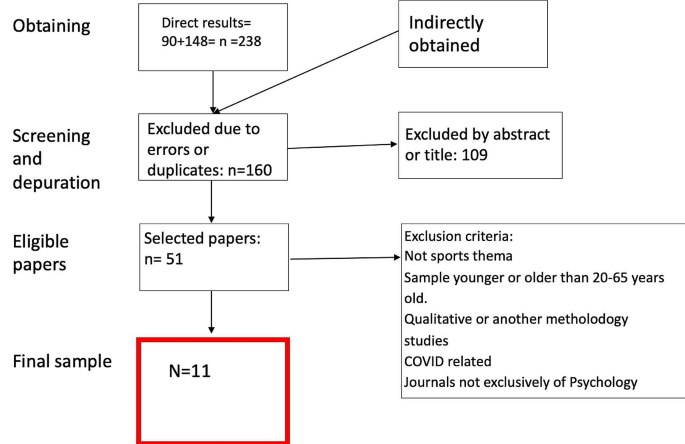
Phases of the selection process for the final sample. Four phases were carried out to select the final sample of articles. The first phase allowed the elimination of duplicates. In the second stage, those that, by title or abstract, did not fit the objectives of the article were eliminated. Previously selected exclusion criteria were applied to the remaining sample. Thus, in phase 4, the final sample of 11 selected articles was obtained
Results (second phase)
The first screening examined the title, and the abstract if needed, excluding the papers that were duplicated, contained errors or someone with formal problems, low N or case studies. This screening allowed the initial sample to be reduced to a more accurate one with 109 papers selected.
Results (third phase)
This was followed by the second screening to examine the abstract and full texts, excluding if necessary papers related to non-sports themes, samples that were too old or too young for our interests, papers using qualitative methodologies, articles related to the COVID period, or others published in non-psychological journals. Furthermore, papers related to ‘negative psychological variables’’ were also excluded.
Results (fourth phase)
At the end of this second screening the remaining number of papers was 11. In this final phase we tried to organise the main characteristics and their main conclusions/results in a comprehensible list (Table 1 ). Moreover, in order to enrich our sample of papers, we decided to include some articles from other sources, mainly those presented in the introduction to sustain the conceptual framework of the concept ‘bright side’ of sports.
The usual position of the researcher of psychological variables that affect sports performance is to look for relationships between ‘negative’ variables, first in the form of basic psychological processes, or distorting cognitive behavioural, unpleasant or evaluable as deficiencies or problems, in a psychology for the ‘risk’ society, which emphasises the rehabilitation that stems from overcoming personal and social pathologies [ 31 ], and, lately, regarding the affectation of the athlete’s mental health [ 32 ]. This fact seems to be true in many cases and situations and to openly contradict the proclaimed psychological benefits of practising sports (among others: Cantón [ 33 ], ; Froment and González [ 34 ]; Jürgens [ 35 ]).
However, it is possible to adopt another approach focused on the ‘positive’ variables, also in relation to the athlete’s performance. This has been the main objective of this systematic review of the existing literature and far from being a novel approach, although a minority one, it fits perfectly with the definition of our area of knowledge in the broad field of health, as has been pointed out for some time [ 36 , 37 ].
After carrying out the aforementioned systematic review, a relatively low number of articles were identified by experts that met the established conditions—according to the PRISMA method [ 37 , 38 , 39 , 40 ]—regarding databases, keywords, and exclusion and inclusion criteria. These precautions were taken to obtain the most accurate results possible, and thus guarantee the quality of the conclusions.
The first clear result that stands out is the great difficulty in finding articles in which sports ‘performance’ is treated as a well-defined study variable adapted to the situation and the athletes studied. In fact, among the results (11 papers), only 3 associate one or several positive psychological variables with performance (which is evaluated in very different ways, combining objective measures with other subjective ones). This result is not surprising, since in several previous studies (e.g. Nuñez et al. [ 41 ]) using a systematic review, this relationship is found to be very weak and nuanced by the role of different mediating factors, such as previous sports experience or the competitive level (e.g. Rascado, et al. [ 42 ]; Reche, Cepero & Rojas [ 43 ]), despite the belief—even among professional and academic circles—that there is a strong relationship between negative variables and poor performance, and vice versa, with respect to the positive variables.
Regarding what has been evidenced in relation to the latter, even with these restrictions in the inclusion and exclusion criteria, and the filters applied to the first findings, a true ‘galaxy’ of variables is obtained, which also belong to different categories and levels of psychological complexity.
A preliminary consideration regarding the current paradigm of sport psychology: although it is true that some recent works have already announced the swing of the pendulum on the objects of study of PD, by returning to the study of traits and dispositions, and even to the personality of athletes [ 43 , 44 , 45 , 46 ], our results fully corroborate this trend. Faced with five variables present in the studies selected at the end of the systematic review, a total of three traits/dispositions were found, which were also the most repeated—optimism being present in four articles, mental toughness present in three, and finally, perfectionism—as the representative concepts of this field of psychology, which lately, as has already been indicated, is significantly represented in the field of research in this area [ 46 , 47 , 48 , 49 , 50 , 51 , 52 ]. In short, the psychological variables that finally appear in the selected articles are: psychological well-being (PWB) [ 53 ]; self-compassion, which has recently been gaining much relevance with respect to the positive attributional resolution of personal behaviours [ 54 ], satisfaction with life (balance between sports practice, its results, and life and personal fulfilment [ 55 ], the existence of approach-achievement goals [ 56 ], and perceived social support [ 57 ]). This last concept is maintained transversally in several theoretical frameworks, such as Sports Commitment [ 58 ].
The most relevant concept, both quantitatively and qualitatively, supported by the fact that it is found in combination with different variables and situations, is not a basic psychological process, but a high-level cognitive construct: psychological well-being, in its eudaimonic aspect, first defined in the general population by Carol Ryff [ 59 , 60 ] and introduced at the beginning of this century in sport (e.g., Romero, Brustad & García-Mas [ 13 ], ; Romero, García-Mas & Brustad [ 61 ]). It is important to note that this concept understands psychological well-being as multifactorial, including autonomy, control of the environment in which the activity takes place, social relationships, etc.), meaning personal fulfilment through a determined activity and the achievement or progress towards goals and one’s own objectives, without having any direct relationship with simpler concepts, such as vitality or fun. In the selected studies, PWB appears in five of them, and is related to several of the other variables/traits.
The most relevant result regarding this variable is its link with motivational aspects, as a central axis that relates to different concepts, hence its connection to sports performance, as a goal of constant improvement that requires resistance, perseverance, management of errors and great confidence in the possibility that achievements can be attained, that is, associated with ideas of optimism, which is reflected in expectations of effectiveness.
If we detail the relationships more specifically, we can first review this relationship with the ‘way of being’, understood as personality traits or behavioural tendencies, depending on whether more or less emphasis is placed on their possibilities for change and learning. In these cases, well-being derives from satisfaction with progress towards the desired goal, for which resistance (mental toughness) and confidence (optimism) are needed. When, in addition, the search for improvement is constant and aiming for excellence, its relationship with perfectionism is clear, although it is a factor that should be explored further due to its potential negative effect, at least in the long term.
The relationship between well-being and satisfaction with life is almost tautological, in the precise sense that what produces well-being is the perception of a relationship or positive balance between effort (or the perception of control, if we use stricter terminology) and the results thereof (or the effectiveness of such control). This direct link is especially important when assessing achievement in personally relevant activities, which, in the case of the subjects evaluated in the papers, specifically concern athletes of a certain level of performance, which makes it a more valuable objective than would surely be found in the general population. And precisely because of this effect of the value of performance for athletes of a certain level, it also allows us to understand how well-being is linked to self-compassion, since as a psychological concept it is very close to that of self-esteem, but with a lower ‘demand’ or a greater ‘generosity’, when we encounter failures, mistakes or even defeats along the way, which offers us greater protection from the risk of abandonment and therefore reinforces persistence, a key element for any successful sports career [ 62 ].
It also has a very direct relationship with approach-achievement goals, since precisely one of the central aspects characterising this eudaimonic well-being and differentiating it from hedonic well-being is specifically its relationship with self-determined and persistent progress towards goals or achievements with incentive value for the person, as is sports performance evidently [ 63 ].
Finally, it is interesting to see how we can also find a facet or link relating to the aspects that are more closely-related to the need for human affiliation, with feeling part of a group or human collective, where we can recognise others and recognise ourselves in the achievements obtained and the social reinforcement of those themselves, as indicated by their relationship with perceived social support. This construct is very labile, in fact it is common to find results in which the pressure of social support is hardly differentiated, for example, from the parents of athletes and/or their coaches [ 64 ]. However, its relevance within this set of psychological variables and traits is proof of its possible conceptual validity.
Analysing the results obtained, the first conclusion is that in no case is an integrated model based solely on ‘positive’ variables or traits obtained, since some ‘negative’ ones appear (anxiety, stress, irrational thoughts), affecting the former.
The second conclusion is that among the positive elements the variable coping strategies (their use, or the perception of their effectiveness) and the traits of optimism, perfectionism and self-compassion prevail, since mental strength or psychological well-being (which also appear as important, but with a more complex nature) are seen to be participated in by the aforementioned traits.
Finally, it must be taken into account that the generation of positive elements, such as resilience, or the learning of coping strategies, are directly affected by the educational style received, or by the culture in which the athlete is immersed. Thus, the applied potential of these findings is great, but it must be calibrated according to the educational and/or cultural features of the specific setting.
Limitations
The limitations of this study are those evident and common in SR methodology using the PRISMA system, since the selection of keywords (and their logical connections used in the search), the databases, and the inclusion/exclusion criteria bias the work in its entirety and, therefore, constrain the generalisation of the results obtained.
Likewise, the conclusions must—based on the above and the results obtained—be made with the greatest concreteness and simplicity possible. Although we have tried to reduce these limitations as much as possible through the use of experts in the first steps of the method, they remain and must be considered in terms of the use of the results.
Future developments
Undoubtedly, progress is needed in research to more precisely elucidate the role of well-being, as it has been proposed here, from a bidirectional perspective: as a motivational element to push towards improvement and the achievement of goals, and as a product or effect of the self-determined and competent behaviour of the person, in relation to different factors, such as that indicated here of ‘perfectionism’ or the potential interference of material and social rewards, which are linked to sports performance—in our case—and that could act as a risk factor so that our achievements, far from being a source of well-being and satisfaction, become an insatiable demand in the search to obtain more and more frequent rewards.
From a practical point of view, an empirical investigation should be conducted to see if these relationships hold from a statistical point of view, either in the classical (correlational) or in the probabilistic (Bayesian Networks) plane.
The results obtained in this study, exclusively researched from the desk, force the authors to develop subsequent empirical and/or experimental studies in two senses: (1) what interrelationships exist between the so called ‘positive’ and ‘negative’ psychological variables and traits in sport, and in what sense are each of them produced; and, (2) from a global, motivational point of view, can currently accepted theoretical frameworks, such as SDT, easily accommodate this duality, which is becoming increasingly evident in applied work?
Finally, these studies should lead to proposals applied to the two fields that have appeared to be relevant: educational and cultural.
Application/transfer of results
A clear application of these results is aimed at guiding the training of sports and physical exercise practitioners, directing it towards strategies for assessing achievements, improvements and failure management, which keep them in line with well-being enhancement, eudaimonic, intrinsic and self-determined, which enhances the quality of their learning and their results and also favours personal health and social relationships.
Data availability
There are no further external data.
Cantón E, Checa I. Los estados emocionales y su relación con las atribuciones y las expectativas de autoeficacia en El deporte. Revista De Psicología Del Deporte. 2012;21(1):171–6.
Google Scholar
Cantón E, Checa I, Espejo B. (2015). Evidencias de validez convergente y test-criterio en la aplicación del Instrumento de Evaluación de Emociones en la Competición Deportiva. 24(2), 311–313.
Olmedilla A, Martins B, Ponseti-Verdaguer FJ, Ruiz-Barquín R, García-Mas A. It is not just stress: a bayesian Approach to the shape of the Negative Psychological Features Associated with Sport injuries. Healthcare. 2022;10(2):236. https://doi.org/10.3390/healthcare10020236 .
Article Google Scholar
Ong NCH, Chua JHE. Effects of psychological interventions on competitive anxiety in sport: a meta-analysis. Psycholy Sport Exerc. 2015;52:101836. https://doi.org/10.1016/j.psychsport.2020.101836 .
Candel MJ, Mompeán R, Olmedilla A, Giménez-Egido JM. Pensamiento catastrofista y evolución del estado de ánimo en futbolistas lesionados (Catastrophic thinking and temporary evolf mood state in injured football players). Retos. 2023;47:710–9.
Li C, Ivarsson A, Lam LT, Sun J. Basic Psychological needs satisfaction and frustration, stress, and sports Injury among University athletes: a Four-Wave prospective survey. Front Psychol. 2019;26:10. https://doi.org/10.3389/fpsyg.2019.00665 .
Wiese-Bjornstal DM. Psychological predictors and consequences of injuries in sport settings. In: Anshel MH, Petrie TA, Steinfelt JA, editors. APA handbook of sport and exercise psychology, volume 1: Sport psychology. Volume 1. Washington: American Psychological Association; 2019. pp. 699–725. https://doi.org/10.1037/0000123035 .
Chapter Google Scholar
Godoy PS, Redondo AB, Olmedilla A. (2022). Indicadores De Salud mental en jugadoras de fútbol en función de la edad. J Univers Mov Perform 21(5).
Golding L, Gillingham RG, Perera NKP. The prevalence of depressive symptoms in high-performance athletes: a systematic review. Physician Sportsmed. 2020;48(3):247–58. https://doi.org/10.1080/00913847.2020.1713708 .
Xanthopoulos MS, Benton T, Lewis J, Case JA, Master CL. Mental Health in the Young Athlete. Curr Psychiatry Rep. 2020;22(11):1–15. https://doi.org/10.1007/s11920-020-01185-w .
Cantón E, Checa I, Vellisca-González MY. Bienestar psicológico Y ansiedad competitiva: El Papel De las estrategias de afrontamiento / competitive anxiety and Psychological Well-being: the role of coping strategies. Revista Costarricense De Psicología. 2015;34(2):71–8.
Hahn E. Emotions in sports. In: Hackfort D, Spielberg CD, editors. Anxiety in Sports. Taylor & Francis; 2021. pp. 153–62. ISBN: 9781315781594.
Carrasco A, Brustad R, García-Mas A. Bienestar psicológico Y Su uso en la psicología del ejercicio, la actividad física y El Deporte. Revista Iberoamericana De psicología del ejercicio y El Deporte. 2007;2(2):31–52.
García-Mas A, Olmedilla A, Laffage-Cosnier S, Cruz J, Descamps Y, Vivier C. Forever Young! Tintin’s adventures as an Example of Physical Activity and Sport. Sustainability. 2021;13(4):2349. https://doi.org/10.3390/su13042349 .
McCarthy P. Positive emotion in sport performance: current status and future directions. Int Rev Sport Exerc Psycholy. 2011;4(1):50–69. https://doi.org/10.1080/1750984X.2011.560955 .
Cerin E. Predictors of competitive anxiety direction in male Tae Kwon do practitioners: a multilevel mixed idiographic/nomothetic interactional approach. Psychol Sport Exerc. 2004;5(4):497–516. https://doi.org/10.1016/S1469-0292(03)00041-4 .
Silva A, Monteiro D, Sobreiro P. Effects of sports participation and the perceived value of elite sport on subjective well-being. Sport Soc. 2020;23(7):1202–16. https://doi.org/10.1080/17430437.2019.1613376 .
Mansfield L, Kay T, Meads C, Grigsby-Duffy L, Lane J, John A, et al. Sport and dance interventions for healthy young people (15–24 years) to promote subjective well-being: a systematic review. BMJ Open. 2018;8(7). https://doi.org/10.1136/bmjopen-2017-020959 . e020959.
Ryff CD. Happiness is everything, or is it? Explorations on the meaning of psychological well-being. J Personal Soc Psychol. 1989;57(6):1069–81. https://doi.org/10.1037/0022-3514.57.6.1069 .
Lemelin E, Verner-Filion J, Carpentier J, Carbonneau N, Mageau G. Autonomy support in sport contexts: the role of parents and coaches in the promotion of athlete well-being and performance. Sport Exerc Perform Psychol. 2022;11(3):305–19. https://doi.org/10.1037/spy0000287 .
Adler AB, Bliese PD, Barsade SG, Sowden WJ. Hitting the mark: the influence of emotional culture on resilient performance. J Appl Psychol. 2022;107(2):319–27. https://doi.org/10.1037/apl0000897 .
Article PubMed Google Scholar
Pekrun R, Murayama K, Marsh HW, Goetz T, Frenzel AC. Happy fish in little ponds: testing a reference group model of achievement and emotion. J Personal Soc Psychol. 2019;117(1):166–85. https://doi.org/10.1037/pspp0000230 .
Seligman M. Authentic happiness. New York: Free Press/Simon and Schuster; 2002.
Seligman M, Florecer. La Nueva psicología positiva y la búsqueda del bienestar. Editorial Océano; 2016.
Giles S, Fletcher D, Arnold R, Ashfield A, Harrison J. Measuring well-being in Sport performers: where are we now and how do we Progress? Sports Med. 2020;50(7):1255–70. https://doi.org/10.1007/s40279-020-01274-z .
Article PubMed PubMed Central Google Scholar
Piñeiro-Cossio J, Fernández-Martínez A, Nuviala A, Pérez-Ordás R. Psychological wellbeing in Physical Education and School sports: a systematic review. Int J Environ Res Public Health. 2021;18(3):864. https://doi.org/10.3390/ijerph18030864 .
Gómez-García L, Olmedilla-Zafra A, Peris-Delcampo D. Inteligencia emocional y características psicológicas relevantes en mujeres futbolistas profesionales. Revista De Psicología Aplicada Al Deporte Y El Ejercicio Físico. 2023;15(72). https://doi.org/10.5093/rpadef2022a9 .
Balk YA, Englert C. Recovery self-regulation in sport: Theory, research, and practice. International Journal of Sports Science and Coaching. SAGE Publications Inc.; 2020. https://doi.org/10.1177/1747954119897528 .
King PR Jr, Beehler GP, Donnelly K, Funderburk JS, Wray LO. A practical guide to applying the Delphi Technique in Mental Health Treatment Adaptation: the example of enhanced problem-solving training (E-PST). Prof Psychol Res Pract. 2021;52(4):376–86. https://doi.org/10.1037/pro0000371 .
Glass G. Primary, secondary, and Meta-Analysis of Research. Educational Researcher. 1976;5(10):3. https://doi.org/10.3102/0013189X005010003 .
Gillham J, Seligman M. Footsteps on the road to a positive psychology. Behav Res Ther. 1999;37:163–73. https://doi.org/10.1016/s0005-7967( . 99)00055 – 8.
Castillo J. Salud mental en El Deporte individual: importancia de estrategias de afrontamiento eficaces. Fundación Universitaria Católica Lumen Gentium; 2021.
Cantón E. Deporte, salud, bienestar y calidad de vida. Cuad De Psicología Del Deporte. 2001;1(1):27–38.
Froment F, García-González A. Retos. 2017;33:3–9. https://doi.org/10.47197/retos.v0i33.50969 . Beneficios de la actividad física sobre la autoestima y la calidad de vida de personas mayores (Benefits of physical activity on self-esteem and quality of life of older people).
Jürgens I. Práctica deportiva y percepción de calidad de vida. Revista Int De Med Y Ciencias De La Actividad Física Y Del Deporte. 2006;6(22):62–74.
Carpintero H. (2004). Psicología, Comportamiento Y Salud. El Lugar De La Psicología en Los campos de conocimiento. Infocop Num Extr, 93–101.
Page M, McKenzie J, Bossuyt P, Boutron I, Hoffmann T, Mulrow C, et al. Declaración PRISMA 2020: una guía actualizada para la publicación de revisiones sistemáticas. Rev Esp Cardiol. 2001;74(9):790–9.
Royo M, Biblio-Guías. Revisiones sistemáticas: PRISMA 2020: guías oficiales para informar (redactar) una revisión sistemática. Universidad De Navarra. 2020. https://doi.org/10.1016/j.recesp.2021.06.016 .
Urrútia G, Bonfill X. PRISMA declaration: a proposal to improve the publication of systematic reviews and meta-analyses. Medicina Clínica. 2010;135(11):507–11. https://doi.org/10.1016/j.medcli.2010.01.015 .
Núñez A, Ponseti FX, Sesé A, Garcia-Mas A. Anxiety and perceived performance in athletes and musicians: revisiting Martens. Revista De Psicología. Del Deporte/Journal Sport Psychol. 2020;29(1):21–8.
Rascado S, Rial-Boubeta A, Folgar M, Fernández D. Niveles De rendimiento y factores psicológicos en deportistas en formación. Reflexiones para entender la exigencia psicológica del alto rendimiento. Revista Iberoamericana De Psicología Del Ejercicio Y El Deporte. 2014;9(2):373–92.
Reche-García C, Cepero M, Rojas F. Efecto De La Experiencia deportiva en las habilidades psicológicas de esgrimistas del ranking nacional español. Cuad De Psicología Del Deporte. 2010;10(2):33–42.
Kang C, Bennett G, Welty-Peachey J. Five dimensions of brand personality traits in sport. Sport Manage Rev. 2016;19(4):441–53. https://doi.org/10.1016/j.smr.2016.01.004 .
De Vries R. The main dimensions of Sport personality traits: a Lexical Approach. Front Psychol. 2020;23:11. https://doi.org/10.3389/fpsyg.2020.02211 .
Laborde S, Allen M, Katschak K, Mattonet K, Lachner N. Trait personality in sport and exercise psychology: a mapping review and research agenda. Int J Sport Exerc Psychol. 2020;18(6):701–16. https://doi.org/10.1080/1612197X.2019.1570536 .
Stamp E, Crust L, Swann C, Perry J, Clough P, Marchant D. Relationships between mental toughness and psychological wellbeing in undergraduate students. Pers Indiv Differ. 2015;75:170–4. https://doi.org/10.1016/j.paid.2014.11.038 .
Nicholls A, Polman R, Levy A, Backhouse S. Mental toughness, optimism, pessimism, and coping among athletes. Personality Individ Differences. 2008;44(5):1182–92. https://doi.org/10.1016/j.paid.2007.11.011 .
Weissensteiner JR, Abernethy B, Farrow D, Gross J. Distinguishing psychological characteristics of expert cricket batsmen. J Sci Med Sport. 2012;15(1):74–9. https://doi.org/10.1016/j.jsams.2011.07.003 .
García-Naveira A, Díaz-Morales J. Relationship between optimism/dispositional pessimism, performance and age in competitive soccer players. Revista Iberoamericana De Psicología Del Ejercicio Y El Deporte. 2010;5(1):45–59.
Reche C, Gómez-Díaz M, Martínez-Rodríguez A, Tutte V. Optimism as contribution to sports resilience. Revista Iberoamericana De Psicología Del Ejercicio Y El Deporte. 2018;13(1):131–6.
Lizmore MR, Dunn JGH, Causgrove Dunn J. Perfectionistic strivings, perfectionistic concerns, and reactions to poor personal performances among intercollegiate athletes. Psychol Sport Exerc. 2017;33:75–84. https://doi.org/10.1016/j.psychsport.2017.07.010 .
Mansell P. Stress mindset in athletes: investigating the relationships between beliefs, challenge and threat with psychological wellbeing. Psychol Sport Exerc. 2021;57:102020. https://doi.org/10.1016/j.psychsport.2021.102020 .
Reis N, Kowalski K, Mosewich A, Ferguson L. Exploring Self-Compassion and versions of masculinity in men athletes. J Sport Exerc Psychol. 2019;41(6):368–79. https://doi.org/10.1123/jsep.2019-0061 .
Cantón E, Checa I, Budzynska N, Canton E, Esquiva Iy, Budzynska N. (2013). Coping, optimism and satisfaction with life among Spanish and Polish football players: a preliminary study. Revista de Psicología del Deporte. 22(2), 337–43.
Mulvenna M, Adie J, Sage L, Wilson N, Howat D. Approach-achievement goals and motivational context on psycho-physiological functioning and performance among novice basketball players. Psychol Sport Exerc. 2020;51:101714. https://doi.org/10.1016/j.psychsport.2020.101714 .
Malinauskas R, Malinauskiene V. The mediation effect of Perceived Social support and perceived stress on the relationship between Emotional Intelligence and Psychological Wellbeing in male athletes. Jorunal Hum Kinetics. 2018;65(1):291–303. https://doi.org/10.2478/hukin-2018-0017 .
Scanlan T, Carpenter PJ, Simons J, Schmidt G, Keeler B. An introduction to the Sport Commitment Model. J Sport Exerc Psychol. 1993;1(1):1–15. https://doi.org/10.1123/jsep.15.1.1 .
Ryff CD. Eudaimonic well-being, inequality, and health: recent findings and future directions. Int Rev Econ. 2017;64(2):159–78. https://doi.org/10.1007/s12232-017-0277-4 .
Ryff CD, Singer B. The contours of positive human health. Psychol Inq. 1998;9(1):1–28. https://doi.org/10.1207/s15327965pli0901_1 .
Romero-Carrasco A, García-Mas A, Brustad RJ. Estado del arte, y perspectiva actual del concepto de bienestar psicológico en psicología del deporte. Revista Latinoam De Psicología. 2009;41(2):335–47.
James IA, Medea B, Harding M, Glover D, Carraça B. The use of self-compassion techniques in elite footballers: mistakes as opportunities to learn. Cogn Behav Therapist. 2022;15:e43. https://doi.org/10.1017/S1754470X22000411 .
Fernández-Río J, Cecchini JA, Méndez-Giménez A, Terrados N, García M. Understanding olympic champions and their achievement goal orientation, dominance and pursuit and motivational regulations: a case study. Psicothema. 2018;30(1):46–52. https://doi.org/10.7334/psicothema2017.302 .
Ortiz-Marholz P, Chirosa LJ, Martín I, Reigal R, García-Mas A. Compromiso Deportivo a través del clima motivacional creado por madre, padre y entrenador en jóvenes futbolistas. J Sport Psychol. 2016;25(2):245–52.
Ortiz-Marholz P, Gómez-López M, Martín I, Reigal R, García-Mas A, Chirosa LJ. Role played by the coach in the adolescent players’ commitment. Studia Physiol. 2016;58(3):184–98. https://doi.org/10.21909/sp.2016.03.716 .
Download references
This research received no external funding.
Author information
Authors and affiliations.
General Psychology Department, Valencia University, Valencia, 46010, Spain
David Peris-Delcampo & Enrique Cantón
Basic Psychology and Pedagogy Departments, Balearic Islands University, Palma de Mallorca, 07122, Spain
Antonio Núñez, Javier Ponseti & Alejandro Garcia-Mas
Education and Social Sciences Faculty, Andres Bello University, Santiago, 7550000, Chile
Paula Ortiz-Marholz
Personality, Evaluation and Psychological Treatment Deparment, Murcia University, Campus MareNostrum, Murcia, 30100, Spain
Aurelio Olmedilla
You can also search for this author in PubMed Google Scholar
Contributions
Conceptualization, AGM, EC and ANP.; planification, AO; methodology, ANP, AGM and PO.; software, ANP, DP and PO.; validation, ANP and PO.; formal analysis, DP, PO and ANP; investigation, DP, PO and ANP.; resources, DVP and JP; data curation, AO and DP.; writing—original draft preparation, ANP, DP and AGM; writing—review and editing, EC and JP.; visualization, ANP and PO.; supervision, AGM.; project administration, DP.; funding acquisition, DP and JP. All authors have read and agreed to the published version of the manuscript.
Corresponding author
Correspondence to Antonio Núñez .
Ethics declarations
Ethics approval and consent to participate.
Not applicable.
Informed consent statement
Consent for publication, competing interests.
The authors declare no conflict of interests.
Additional information
Publisher’s note.
Springer Nature remains neutral with regard to jurisdictional claims in published maps and institutional affiliations.
Rights and permissions
Open Access This article is licensed under a Creative Commons Attribution 4.0 International License, which permits use, sharing, adaptation, distribution and reproduction in any medium or format, as long as you give appropriate credit to the original author(s) and the source, provide a link to the Creative Commons licence, and indicate if changes were made. The images or other third party material in this article are included in the article’s Creative Commons licence, unless indicated otherwise in a credit line to the material. If material is not included in the article’s Creative Commons licence and your intended use is not permitted by statutory regulation or exceeds the permitted use, you will need to obtain permission directly from the copyright holder. To view a copy of this licence, visit http://creativecommons.org/licenses/by/4.0/ . The Creative Commons Public Domain Dedication waiver ( http://creativecommons.org/publicdomain/zero/1.0/ ) applies to the data made available in this article, unless otherwise stated in a credit line to the data.
Reprints and permissions
About this article
Cite this article.
Peris-Delcampo, D., Núñez, A., Ortiz-Marholz, P. et al. The bright side of sports: a systematic review on well-being, positive emotions and performance. BMC Psychol 12 , 284 (2024). https://doi.org/10.1186/s40359-024-01769-8
Download citation
Received : 04 October 2023
Accepted : 07 May 2024
Published : 21 May 2024
DOI : https://doi.org/10.1186/s40359-024-01769-8
Share this article
Anyone you share the following link with will be able to read this content:
Sorry, a shareable link is not currently available for this article.
Provided by the Springer Nature SharedIt content-sharing initiative
- Positive emotions
- Sports performance
BMC Psychology
ISSN: 2050-7283
- General enquiries: [email protected]
Explore your training options in 10 minutes Get Started
- Graduate Stories
- Partner Spotlights
- Bootcamp Prep
- Bootcamp Admissions
- University Bootcamps
- Coding Tools
- Software Engineering
- Web Development
- Data Science
- Tech Guides
- Tech Resources
- Career Advice
- Online Learning
- Internships
- Apprenticeships
- Tech Salaries
- Associate Degree
- Bachelor's Degree
- Master's Degree
- University Admissions
- Best Schools
- Certifications
- Bootcamp Financing
- Higher Ed Financing
- Scholarships
- Financial Aid
- Best Coding Bootcamps
- Best Online Bootcamps
- Best Web Design Bootcamps
- Best Data Science Bootcamps
- Best Technology Sales Bootcamps
- Best Data Analytics Bootcamps
- Best Cybersecurity Bootcamps
- Best Digital Marketing Bootcamps
- Los Angeles
- San Francisco
- Browse All Locations
- Digital Marketing
- Machine Learning
- See All Subjects
- Bootcamps 101
- Full-Stack Development
- Career Changes
- View all Career Discussions
- Mobile App Development
- Cybersecurity
- Product Management
- UX/UI Design
- What is a Coding Bootcamp?
- Are Coding Bootcamps Worth It?
- How to Choose a Coding Bootcamp
- Best Online Coding Bootcamps and Courses
- Best Free Bootcamps and Coding Training
- Coding Bootcamp vs. Community College
- Coding Bootcamp vs. Self-Learning
- Bootcamps vs. Certifications: Compared
- What Is a Coding Bootcamp Job Guarantee?
- How to Pay for Coding Bootcamp
- Ultimate Guide to Coding Bootcamp Loans
- Best Coding Bootcamp Scholarships and Grants
- Education Stipends for Coding Bootcamps
- Get Your Coding Bootcamp Sponsored by Your Employer
- GI Bill and Coding Bootcamps
- Tech Intevriews
- Our Enterprise Solution
- Connect With Us
- Publication
- Reskill America
- Partner With Us
- Resource Center
- Bachelor’s Degree
- Master’s Degree
The Top 10 Most Interesting Exercise Science Research Topics
The field of exercise science is rapidly growing as new technologies like computer visualization and biotracking deepen our understanding of human physiology. New technologies allow us to better prevent injuries, allowing athletes to push their limits beyond what we thought possible. Thanks to this, there is no shortage of exercise science research topics to write about.
In this article, we’ll show you 10 great examples of exercise science research topics. If you are pursuing a degree in this field, you’ll learn better ways of finding good exercise science research paper topics and how to develop stronger exercise science research questions for your projects.
Find your bootcamp match
What makes a strong exercise science research topic.
Strong exercise science research topics are timely and relevant. Leading researchers and sports institutions should still be discussing them at the time you are writing your research paper. The Strength and Conditioning Journal is a great place to find some of the latest activity research topics including articles on different health benefits, health issues, preventive interventions, and rehabilitation after injury.
Your topic should be broad enough to find enough strong sources, but narrow enough to stand out. Controversial topics are acceptable if you have enough evidence to back up your research. If it’s your first paper, consider approaching a less complex topic. You can also ask your teacher for suggestions if you are struggling to find strong university-level topics. Remember to follow the guidelines for choosing a topic set by your institution.
Tips for Choosing an Exercise Science Research Topic
- Choose a topic that intrigues you. A personally interesting topic will motivate you during the research process. If you have a personal connection to what you are researching, you will have a much easier time writing about it.
- Narrow your topic. By picking a specific subject, you will have an easier time finding credible sources to support your research. By reducing the number of books and articles to read and only choosing literature that is immediately relevant to your topic idea, you also won’t have to spend as much effort before starting to write.
- Talk to your teacher or academic advisor. Your teachers are great resources you have at your disposal. They have experience choosing topics for college students and will most likely be able to help you pick a topic you’ll find engaging to research.
- Look through journals to find exciting topics. Review topics published in the journals like the Journal of Strength and Conditioning Research. These research journals publish the latest fitness research papers and can help you find a topic that interests you.
- Consider the research interests of your teacher. It’ll be convenient if your research topic matches their expertise, as they’ll be able to provide you with better feedback during your research process.
What’s the Difference Between a Research Topic and a Research Question?
A research topic is a specific area of study. Sprains in adult athletes or rehabilitation for brain injuries, for example, are research topics. A research question is a way to add new knowledge to that area of study. Examples of research questions would be “What is the role of nutrition in the recovery of sprains in athletes?” or “What is the effect of cardio exercises on adults with brain injuries?”
The goal of your research should be focused around answering the research question. Your answer will help you and others to understand the topic better. Research questions tend to be more specific than the research topics in exercise science.
How to Create Strong Exercise Science Research Questions
To create strong exercise science research questions, you should first become familiar with the topic the question concerns. The answer to your research question should be supported by previous studies done on the topic. Reading previously published studies will help you learn more while preventing you from doing any redundant research.
The scientific method helps exercise scientists better understand their field. Your question should start with how, why, when, or what questions. The scope of your question must be manageable in relation to how long you have to answer it.
Questions that require in-depth experiments may be beyond your reach if you only have a week. Before choosing the question that will lead your research, consider the time it will take you to answer it.
Top 10 Exercise Science Research Paper Topics
1. benefits of resistance training for reducing the negative consequences of aging.
Metabolic resistance training can counter the adverse effects of aging. According to a 2019 study by the Journal of Strength and Conditioning Research, only nine percent of older adults in the United States practice any form of resistance or weight lifting exercises. Metabolic resistance training for elderly residents has become a recently popular topic, as it has been proven to increase muscle mass and muscle strength and relieve intervertebral joint pain.
2. Determining the Minimal Amount of Physical Exercise Required to Maintain Strength and Stamina
Long periods of physical inactivity harm physical fitness. Scientists want to know how much physical exercise can prevent the loss of muscle strength. The British Journal of Sports Medicine published an article that took an in-depth look into the negative effects of sedentary behavior . There are plenty of physiology research topics about improving daily life with an active lifestyle.
3. Effect of a Low-Carbohydrate Ketogenic Diet on Body Mass on Olympic Weightlifting Athletes
Exercise scientists have realized the impact of nutrition on endurance, body composition, and recovery. This has led to theories being tested of controversial ideas in nutrition and measuring their effects on muscle strength.
For example, a study by the Journal of Strength and Conditioning Research shows that ketogenic diets reduce mass without compromising performance . If you are interested in becoming a nutritionist , researching the role of nutrition in relation to physical activity could be beneficial for your future career.
4. The Effect of Exercise on the Gut Microbiome
The role of exercise on the gut microbiome is an exciting topic in exercise science. In 2019, researchers found some proof that regular exercise increased gut bacteria and contributed to the health of the gut microbiome, as mentioned in a study that was published in Exercises and Sport Science Reviews.
The gut microbiome produces a wide range of biomolecules, including neurotransmitters, that regulate mood and anxiety. Researchers believe that healthy gut bacteria can improve our mental fitness and health. Their research also leads them to believe that gut bacteria can improve the body’s ability to fight inflammatory illnesses and certain types of cancer.
5. Wearable Technology for Health Monitoring and Sport Performance
Smartwatches pack sensors that can track your movement patterns, heart rate, and oxygen levels. In recent years, these bio trackers have become increasingly affordable and easy to use. Researchers at the School of Kinesiology at the University of Michigan have used these sensors to track elderly patients and alert their caregivers in real-time.
In sports, kinesiologists use this technology to measure aerobic speed and the onset of fatigue. With a degree in kinesiology , you can work with elite athletes and improve their athletic performance using these technologies.
6. Optimizing Human Movement Potential for Elite Athletes
Exercise scientists study the biomechanics of human movement to improve the body’s longevity. Understanding the human body allows researchers to develop primary injury prevention methods.
Personal trainers help athletes achieve extraordinary performance without the risk of musculoskeletal injury. If you want to become a certified personal trainer , physiology research paper topics in relation to this topic may be of interest to you.
7. Equity in Sports
Exercise scientists are also concerned with the social aspects of sports. Many athletes live under adverse conditions and need to make extra efforts to match the achievements of others. Equity in sports is currently a very important exercise science topic. Researchers find solutions to increase access to professional sports by improving policies to prevent racism, sexism, and other forms of discrimination.
If you want to become a sports agent or an athletic director, look for physiology research topics in relation to equity in sports. Becoming a sports manager takes a certain level of education in the professional fitness industry, such as a graduate degree in sports management .
8. Effect of Bike Commuting on Insulin Sensitivity, Cardiorespiratory Fitness, and Adipose Tissue
Exercise scientists look for solutions to public health problems like diabetes and obesity. A study published in the British Journal of Sports Medicine found that commuting by bike has a significant impact on insulin sensitivity , improving cardiovascular fitness, and reducing belly fat.
With cardiometabolic health such as cardiovascular disease, being an urgent topic in the United States, considering the prevalence of obesity, there is plenty of research on the subject, making it a great initial topic.
9. Reducing Lower Back Pain by Increasing Physical Activity
With athletes having a high sports injury risk, and many injuries causing severe back pain, pain management has become an important topic in exercise science. Exercise scientists research ways to reduce pain using principles in kinesiology and found that increasing physical activity can reduce lower back pain , according to a study published in the British Journal of Sports Medicine.
10. Applications of Kinesiology in the Treatment of Movement Dysfunctions
Exercise scientists have been studying the relationship between movement and neuroplasticity for a long time. Physical activity during rehabilitation for stroke patients or patients with brain injuries has proven to reduce movement dysfunctions. Understanding the effects of exercise on neural networks is an important research topic in the field of rehabilitation.
Other Examples of Exercise Science Research Topics & Questions
Exercise science research topics.
- Assessment of the use of virtual reality rehabilitating brain-injured or stroke patients
- The role of caffeine as a sports performance enhancer for optimal performance
- Current and future perspectives on the effects of nutrition on physical exercise performance
- Hormonal responses in older men to metabolic resistance training
- Comparison of occupational physical activity and leisure physical activity on cardiovascular fitness
Exercise Science Research Questions
- What are the benefits of physical activity for cognitive health?
- What is the impact of VR training on human body composition testing?
- What are the advantages of wearing an elevation training mask during physical exercise?
- What are the physiological causes of mental fatigue on endurance performance?
- How does physical exercise improves mental health and academic performance in university students?
Choosing the Right Exercise Science Research Topic
When choosing the right exercise science research topic, consider researching topics that you are already familiar with, as your existing knowledge may help you with your research. You could also ask your academic advisor, other staff in the department of exercise science, or even physical therapy professionals about current trends in exercise science and injury recovery.
Physical fitness and training performance are common themes in exercise science research. Recent articles published by the British Journal of Sports Medicine or the Journal of Strength and Conditioning Research are a great place to start. Make sure you choose a manageable research topic. Your teacher can help you make sure your research topic is relevant before you begin.

"Career Karma entered my life when I needed it most and quickly helped me match with a bootcamp. Two months after graduating, I found my dream job that aligned with my values and goals in life!"
Venus, Software Engineer at Rockbot
Exercise Science Research Topics FAQ
Exercise science is important because it tries to find solutions to problems concerning the optimal performance of athletes and the general health of the human population. Exercise science also helps develop new rehabilitation methods for injury recovery and pain management.
Yes, kinesiology is a STEM discipline that studies exercise and movement. Breakthroughs in kinesiology come from scientific research and the use of the scientific method. It is a wing of the department of exercise science of many universities.
The average salary of an exercise physiologist is $50,280 per year, which is above the national average, according to the Bureau of Labor Statistics. About half of all exercise physiologists are self-employed, while others work in hospitals, spas, and physical therapy offices.
With a Bachelor’s Degree in Exercise Science, you can get a job as a physical therapist or a fitness instructor. With a graduate degree in exercise science, you can become a sports agent or an athletic director.
About us: Career Karma is a platform designed to help job seekers find, research, and connect with job training programs to advance their careers. Learn about the CK publication .
What's Next?
Get matched with top bootcamps
Ask a question to our community, take our careers quiz.

Leave a Reply Cancel reply
Your email address will not be published. Required fields are marked *

An official website of the United States government
The .gov means it’s official. Federal government websites often end in .gov or .mil. Before sharing sensitive information, make sure you’re on a federal government site.
The site is secure. The https:// ensures that you are connecting to the official website and that any information you provide is encrypted and transmitted securely.
- Publications
- Account settings
Preview improvements coming to the PMC website in October 2024. Learn More or Try it out now .
- Advanced Search
- Journal List
- J Int Soc Sports Nutr
Structure and trends of international sport nutrition research between 2000 and 2018: bibliometric mapping of sport nutrition science
1 Department of Science Policy and Scientometrics, Library and Information Centre of the Hungarian Academy of Sciences (MTA), Arany János street 1, Budapest, 1050 Hungary
2 Faculty of Education and Psychology, Eötvös Loránd University, Budapest, Hungary
Ágoston Temesi
3 Institute of Agribusiness, Department of Food Chain Management, Faculty of Economics and Social Sciences, Szent István University, Gödöllő, Hungary
Orsolya Tompa
Zoltán lakner, sándor soós, associated data.
A part of data generated or analyzed during this study are included in this published article [and its supplementary information files]. The complete datasets used and/or analyzed during the current study are available from the corresponding author on reasonable request.
The tool kits of bibliometrics and science mapping provide a standard methodology to map the knowledge base of specific fields of science. The aim of the present research is the analysis of the recent international trends of sport nutrition science, as well as the primary identification of the research topics and results of sport nutrition science via enhanced bibliometric methods for the 2000–2018 time period.
Altogether, 3889 publications were included in this study. We identified the most relevant sport nutrition topics by running a community detection algorithm on the proximity network constructed via network text analysis. The key issues and key concepts of sport nutrition topics as well as their relations were evaluated via network analysis. Besides, we carried a chronological analysis of topics out and a scientometric evaluative analysis was also created.
We identified the four main basic groups from which the 18 most characteristics topics were analyzed. The 18 topics are the following: ‘soccer and physiology’, ‘carbohydrate metabolism’, ‘muscle physiology: alkalosis and acidosis’, ‘muscle mass gain and dietary supplementation’, ‘fluid balance and hydration’, ‘dietary intake and nutrition knowledge’, ‘determination of energy need of athletes’, ‘bone health and female athlete triad’, ‘hydration strategy’, ‘body weight management’, ‘nutritional strategies and human skeletal muscle’, ‘dietary supplementation of nitrates’, ‘oxidative stress and dietary supplement use’, ‘dietary supplement use and doping’, ‘oxidative stress and inflammation and dietary antioxidants’, ‘exercise adaptation and nutritional strategies’, ‘gut microbiota’, ‘celiac disease’. Regarding the size of the topic, researches on sport nutrition science have put the focus on the following three groups: ‘muscle mass gain and dietary supplementation’, ‘carbohydrate metabolism’, ‘oxidative stress and dietary supplement use’. The greatest scientific impact can be ascribed to the following topics: ‘nutritional strategies and human skeletal muscle’, ‘dietary supplementation of nitrates’, ‘body weight management’, and ‘gut microbiota’.
Conclusions
Scientific output on sport nutrition has continuously been rising between 2000 and 2018. The ratio of topics related to sport nutrition but predominantly connected to basic research has decreased significantly within all publications. The results of this study confirm the role of science mapping in the identification of specific research topics and primary research directions in the field of sport nutrition science.
Supplementary Information
The online version contains supplementary material available at 10.1186/s12970-021-00409-5.
Sport nutrition science lies at the intersection of numerous vast fields of life sciences, such as nutrition, clinical, medical, health, biomedical, sport, and food sciences. Sport nutrition science involves the transfer of knowledge related to physical activity and health, metabolism, body composition, diseases, training, injuries, rehabilitation and performance. Sport nutrition as a research topic has attracted great attention in the scientific literature in the field of sport and exercise science. Various systematic reviews or meta-analyses have been conducted on numerous aspects of sport nutrition because of its complex nature that gains interest worldwide [ 1 – 6 ]. Apart from the classical and systematic literature reviews and meta-analyses of the field, there is no large-scale, bibliometric analysis of sport nutrition science. For the experts and sport nutrition practitioners working with athletes, the application of scientific knowledge is essential because of the vast range, dynamism, and multidisciplinary nature of this knowledge output. It is inconceivable to process and apply all of this knowledge without the help of modern information science methods built on international literature databases. These serve as indispensable complementary tools to the standard, literature-synthesizing methods, such as the systematic review and meta-analysis. In the hierarchy of the reliability/quality of scientific results (along with the so-called ‘evidence pyramid’) in sport medicine and nutrition science, systematic reviews and meta-analyses with the processing method of randomized, controlled trials (RCTs) – lies at the top of the pyramid [ 7 ]. Science mapping can play an outstanding role alongside meta-analysis to map the knowledge base of the field of sport nutrition science. Science mapping is a type of analysis that usually investigates the structure of literature databases with several thousand-, ten-, or hundred thousand of items covering a long period of time [ 8 ]. Applying the statistical-network theoretical modeling of the referencing, text-similarity, and authorial relations of the literature, science mapping methods facilitate the exploration of the conceptual- thematical structure, trends and dynamism of the field of science. Thus, the results of science mapping contribute to strengthening the reliability of scientific results [ 9 , 10 ].
In sport science, bibliometric analysis has been conducted for the assessment of research trends and for the identification of publications with high impact on the fields of sport psychology [ 11 , 12 ], sport management [ 13 , 14 ], sport economy [ 15 ], and aging and physical activity [ 16 ], however, the analysis of the trends in sport nutrition science has not been performed to date.
Methodology
Research aims.
This present research on the field of sport nutrition science includes (1) the identification of relevant and state-of-the-art literature, (2) the analysis of trends, key topics and key issues in sport nutrition science, and (3) the identification of the recent trends of the key topics in the time period of 2000–2018. Our research is the first to present the key topics of the publications in sport nutrition science of the past 18 years and their scientometric characteristics identified with the help of bibliometric tools (through the analysis of reference networks and text mining).
Data collection
The core sample (basic documents of the data collection) were obtained from the PubMed medical database with a search from MeSH using the key concepts in “sport nutrition and sport physiology” for the 2000–2018 time period (no results could be retrieved preceding the year 2000 based on this search and via related MeSH major topics). Data was retrieved during February 2019. The search resulted in a core sample of 372 publications. To extend the information content and the time window of the core sample, we used the Web of Science (WoS) database. As a first step, we identified the articles citing the core sample based on WoS records, then we incorporated them into the database ( n = 1909). Alongside those citing the core, we also identified the publications cited by the core sample ( n = 1992). Publications were included in the corpus if they received a minimum of two references from the core sample, thus ensuring the inclusion of relevant topics only. After eliminating duplications, the full corpus included 3889 publications, ranging between 1976 and 2018 (Fig. 1 ).

Flowchart of database construction
After identifying the publications in the full corpus (data collection) we continued with their scientometric evaluation based on citation impact and journal rank. To analyze the citation impact, we obtained the impact indicators belonging to the publications of the full corpus from the InCites database, then we expanded the database with the normalized citation impact and the percentile measures. The rank indicators of the journals that include the publications in the full corpus were obtained from the InCites and Journal Citation Report (JCR) databases, after which we expanded the database with the citation quartile based on impact factor.
Mathematical-statistical analysis
The resulting literature corpus was explored through a multi-step methodology combining text mining and bibliometric processes (Fig. 2 ), which aimed at mapping the structure, trends, key issues and trends of sport nutrition science.

Schematic representation of the analytical framework
The applied methodology comprised of three parts:
Identification of topics
The thematic similarity of publications was explored through the text-similarity of title words and abstracts. With the Natural Language Processing (NLP) method, the compounded text of the titles and abstracts was reduced to key terms that are characteristic for the articles and was represented as the sequence or vector of the frequency of these terms in the articles [ 17 ]. Then, a similarity matrix of articles (vectors) was obtained. To demarcate the topic clusters based on article similarity, we derived a graph from the similarity matrix, which we thus considered as a weighed network describing the similarity relations of the publications based on Cosine similarity:
That is the similarity between article x and y, where x i (y i ) is the weight of term i for article x.
The actual clustering was achieved by running a community detection algorithm on this proximity network constructed via network text analysis in order to delineate coherent groups of papers. The algorithm used was the “Louvain method”, implemented in the igraph R package [ 18 ].
The exploration of the key issues, key concepts, and relations of topics
The inner structure of theme clusters and their thematic relations were explored via network analysis. When modeling the relations of key concepts, we defined the network of the joint occurrence of the so-called author keywords assigned to the articles in the cluster, where the strength of the relation between concepts is characterized by the relative frequency of their co-occurrence (among the keywords of the same article). In this case, it is represented by the Cosine similarity as the measure of proximity (this time between concepts, not between articles). This semantic network obtained for the cluster was then subjected to the community detection procedure referred to in the previous section, i.e. the Louvain method [ 19 ]. As a result, the network of key concepts was partitioned into cohesive subtopics defined by strongly and densely related concepts.
To gain a more clear representation of conceptual relations, we analyzed the semantic network along different lines as well. We subjected the proximity network (as a proximity matrix) to a hierarchical cluster analysis method (after converting similarities into distances for that end and using the “average” method). The main aim of this additional exercise was to obtain an overview of the domain, where the interrelations of the most relevant concepts are analytically (not only visually) demonstrated by the concept tree resulted from the hierarchical clustering. We call this the “tree view” of the cluster.
In order to capture the conceptual pool most indicative of topics, the procedure described above was run over a selected subset of keywords pertaining of a cluster. The selection of this subset comprised of two steps: (A) the concepts accounting for the cohesiveness of the cluster was identified, using a measure of network role and position, namely, betweenness centrality (BC). BC has been fairly well-validated as measuring the extent to which a particular node (keyword) connects relatively distinct groups (of keywords, i.e. subdiscourses). Applying this measure, keywords with a BC value above a distinctive cutpoint were selected for inclusion in characterizing the cluster (these are the very terms displayed on the dendrograms). (B) For the assignment of key themes and the purposes of labelling, the most frequent words were selected from this pool. This procedure resulted in using a double constraint for keyword relevance: the terms characterizing the cluster had to be both central (in the network sense) and frequent enough for inclusion. Central terms entered into hierarchical clustering, frequent (and central) words were used in cluster labelling and topic designation.
The identification of the most important publications (core documents)
For the comprehension and expert characterization of topic clusters, we applied a modern bibliometric method, which algorithmically identifies the most characteristic publications of the topic. The method is the so-called ‘core documents’ methodology [ 20 ], the essence of which is the identification of documents that show the biggest possible thematic similarity to the biggest possible segment of the theme (defined by a similarity threshold). More precisely, the identification of core documents was based on the document similarity matrix used for delineating the 18 clusters (recall that his matrix was based on the abstract-, title- and keywords-based (composite) similarity of documents, with values ranging between 0 and 1, standing for complete thematic dissimilarity (0) to full thematic similarity (1), respectively). In this framework, core documents were defined by their thematic similarity to all other cluster members (using a parameter or threshold values chosen experimentally and “Similarity(.,.)” indicating the similarity measure):
D is a core document to Cluster [i] = Min. 50% of P papers in Cluster [i] satisfy the following condition: Similarity(D, P) > 0.6.
We created the list of the identified characteristic publications for each cluster along with the description of the cluster.
In the course of clustering, we identified four basic groups, from which we highlighted the most relevant 18 topics.
We present the 18 topics according to the following four aspects: the number of publications in the cluster (the size of the topic), the distribution of the publications based on publication date, the citation impact of the publications, and the analysis of the journal rank of publications within each topic.
The 18 topics are the following:
- Soccer and physiology
- Carbohydrate metabolism
- Muscle physiology: alkalosis and acidosis
- Muscle mass gain and dietary supplementation
- Fluid balance and hydration
- Dietary intake and nutrition knowledge
- Determination of energy need of athletes
- Bone health, female athlete triad
- Hydration strategy
- Body weight management
- Nutritional Strategies and human skeletal muscle
- Dietary supplementation of nitrates
- Oxidative stress and dietary supplement use
- Dietary supplement use and doping
- Oxidative stress, inflammation, and dietary antioxidants
- Exercise adaptation and nutritional strategies
- Gut microbiota
- Celiac disease
Scientometric characteristics of topics
The size distribution of topics.
Based on the absolute and relative size of the topics, that are based on the number of publications belonging to a cluster, we can get an insight into the significance of the explored topics and research trends in sport nutrition science. These data are displayed in Fig. 3 ., which, besides the number of publications in each cluster, also shows their composition in terms of the core publications identified through the targeted search as well as of the publications citing, and those cited by the core sample. In terms of weight (size), the most dominant topic, with ca. three hundred publications, is 'muscle power enhancement and dietary supplementation', followed by topics with about 200–250 publications: ‘carbohydrate metabolism’, ‘oxidative stress and dietary supplement use’, ‘exercise adaptation and nutritional strategies’, ‘dietary supplementation of nitrates’, ‘nutritional strategies and human skeletal muscle’. This group is closely followed by the topic of ‘bone health, female athlete triad’, ‘dietary intake and nutrition knowledge’, and ‘determination of energy need of athletes’, with about 200 publications. The group with 100–150 publications is led by the topics of ‘fluid balance and hydration’, and ‘body weight management’, moreover, here belong the themes of ‘soccer and physiology’, also the ‘hydration strategy’, as well as ‘dietary supplement use and doping’. In the 50–100 range, the dominant topics with almost 100 publications are ‘muscle physiology: alkalosis and acidosis’, ‘oxidative stress, inflammation and dietary antioxidants’, also here belong the smaller but well-defined topics of ‘gut microbiota’ and ‘celiac disease’. The full size of the topics greatly correlates with their role and importance in the core sample; that is, size ranking also reflects the extent to which the cluster is of ‘sport physiological’ nature.

Size distribution of topics
Chronological distribution of topics
The distribution by publication date of the publications belonging to the identified topics, or, to put it another way, the chronological distribution of each cluster facilitates the assessment of the trends and relevance of each topic, of their ‘popular’ or ‘winding down’ nature. The distribution of the size of the topics is summarized in Fig. 4 ., which shows the number of documents belonging to each topic starting from 2010. Based on this, the trend graphs in the table provide an overview of the chronological dynamics of the topics. The trend graphs attest that each topic shows a growing tendency (that is, more and more articles appeared on the given topic in the past decade), each cluster is at its maximum size in the last examined year (2018). The differences between the topics appear in the characteristics and pattern of the increase. According to the latter, with a little simplification, we observe two types of increase: (1) the topic increases gradually from the beginning or middle of the examined decade, (2) after a relative ‘stagnation’, the topic shows a rising slope in the last few years. Type (1), a gradual increase is the most characteristic of the topics ‘muscle physiology: alkalosis and acidosis’, ‘nutritional strategies and human skeletal muscle’, ‘exercise adaptation and nutritional strategies’. Type (2), sudden increase with a more moderate rising slope, spread over the last 4-5 years, appears in relation with the topics ‘soccer and physiology’, ‘energy intake and nutrition knowledge’, ‘nutritional strategies and human skeletal muscle’, ‘fluid balance and hydration’, ‘hydration strategy’, ‘oxidative stress and dietary supplement use’, ‘dietary supplement use and doping’, ‘oxidative stress, inflammation and dietary antioxidants’. In the case of topics with a Type (2) the slope is rising and normally peaking in the last 2 years, these are the following: ‘muscle power enhancement and dietary supplementation’, 'determination of energy need of athletes’, ‘body weight management’, ‘gut microbiota’, and ‘celiac disease’. A ‘unique’ cluster, with a somewhat different pattern from the two basic types is the ‘carbohydrate metabolism’, which, along with some fluctuations, shows a steady output in the topic (also with a slight increase); another is ‘bone health and female athlete triad’, which also shows a steady output with a rising slope in the last examined year.

Citation impact of topics and journal ranks
Apart from chronological trends, the relevance and scientific significance of topics can be investigated through the use of the following two groups of scientometric indicators: (1) the citation measures (of the publications) of individual topics, and (2) the prestige or rank of publication venues, i.e., journals. Citation measures provide information about the scientific impact exerted by publications within a topic, considered as a fundamental proxy to the relevance of topics for sport nutrition science.
Instead of the raw citation number, correcting for the field- and age-related differences, publications are characterized by their position in the citation distribution within the particular research field, i.e. with the citation percentile. The clusters with the biggest impact are those whose average, that is, the characteristic value of the relevant articles is situated closest to 100. Those with a median above the value of 75 can be considered to have a high general citation impact (they belong to the most cited, 25%, citation quartile). Based on this, practically all the identified clusters fall into the high citation measure range, both in terms of their median and of the majority (minimum 50%) of their publications. The topics with the biggest impact are the ‘nutritional strategies and human skeletal muscle’ and ‘dietary supplementation of nitrates’. A similarly high composite impact is shown by the topics of ‘soccer and physiology’, ‘carbohydrate metabolism’, ‘bone health and female athlete triad’, ‘body weight management’, and ‘gut microbiota’ (Fig. 5 ).

The distribution of normalized citation impact (citation percentile) for clusters
The rank of publications, in this case, refers to the rank and recognition of the publishing journals, with the latter representing, in terms of the topics, the quality of knowledge transferred in them. To describe the rank and the quality of the knowledge content of topics, we applied the citation quartile system. The basis of the approach is the classification of publications into four quality classes according to the rank of the publishing journal. The so-called Q1 journals belong to the upper 25% of the journal rank of the field, Q2 journals belong to the upper 25–50% quartile, Q3 journals are in the lower 25–50%, and Q4, in the bottom 25%. Figure 6 . shows the distribution of the articles of the identified clusters among the four classes for each theme. In this case, also, we can state that almost all clusters include publications of high quality, inasmuch as on average, 50% of their publications are ranked Q1, and the majority of the rest of the publications belong to Q2, which can also be considered a satisfactory quality rank. ‘Carbohydrate metabolism’, ‘nutritional strategies and human skeletal muscle’, ‘dietary supplementation of nitrates’ stand out (Fig. 6 ).

The rank of publications in the citation quartile system
In the next step of our methodological process, we applied the scientometric assessment of topics, for which we selected the four most significant topics and presented their internal structure in terms of key thematic relations based on our text mining and core document methodologies. We illustrated the conceptual network of topics with a dendrogram, and we analyzed the four topics based on their interconnections from the aspects of sport nutrition, sport physiology, type of sport, dietary supplements, and performance diagnostics. The collection of the 18 topics and their core papers are in Additional file 1 . Using an advanced bibliometric method, we obtained the so-called core papers for each research topic, the most representative publications in the cluster (see Additional file 1 ).
Description of the nutritional strategies and human skeletal muscle cluster
This topic focuses on the relationship between sport performance and the metabolic pathways of skeletal muscle cells. Its most frequent issue is the role of PGC-1 alpha transcriptional regulation especially in the relation to mitochondrial biogenesis, citrate synthesis, endurance performance, phosphocreatine as the creatine substrate of performance enhancement, the relation of insulin, free fatty acids and fatigue, protein and carbohydrates (first of all fructose), and also in relation to energy expenditure and regeneration. Depending on the type of the examined sport, endurance training stands out, but high-intensity interval training is also present with almost the same frequency. Of the biological components, the role of P38 MAPK protein kinase is worth emphasizing (Fig. 7 ).

Nutritional strategies and human skeletal muscle topic. Notes: The keywords and concept groups belonging together are displayed in the same font color. Next to each keyword, color codes designate the occurrence frequency and importance of the given concept within the topic (color legend: red: high frequency, belonging to the top citation quartile of the distribution; orange: frequent, belonging to the third citation quartile of the distribution; yellow: medium frequency, belonging to the second citation quartile of the distribution; blue: low frequency, belonging to the bottom citation quartile of the distribution).
Description of the dietary supplementation of nitrates topic
The complex (sport-) physiological focus of the topic is on the relation network of blood circulation, oxidative metabolism and nitrogen metabolism and supplementation (in relation to sport activities). Its primary topics are oxygen consumption (related to the concept of efficiency), fatigue, inorganic nitrate substrate related to vascular function, the stimulus-muscle contraction connection, vegetarianism, the enzyme that produces nitrogen oxide substrate, the relation network of hypertension and vasodilatation, inflammation and beta-alanine, and bloodstream. Depending on the type of physical activity, this topic is characterized by endurance training, especially, related to oxidative stress and its biomarkers. The concept of diving response also emerged mainly related to oxygen uptake and consumption and more slightly to respiratory control. Within further substrata, sodium nitrite and with lower frequency, creatine-nitrate appeared. Regarding indices, the use of the VO2 performance indicator was relevant (Fig. 8 ).

Dietary supplementation of nitrates topic
Description of the carbohydrate metabolism topic
From a sport physiological point of view, this topic also revolves around the improvement of skeletal muscle function, mainly in the relation to carbohydrate metabolism. Its pivotal concepts and issues are lipid oxidation during exercise metabolism processes, nitrogen balance (especially after eating), lean body mass (increase), aerobic capacity related mostly to fatigue and endurance training, glycemic index, muscle glycogen, and endurance training (and carbohydrate absorption). The latter is characteristic of the type of the examined sport and in the terms of branch of sport, cycling (timed training) and running emerged. In the case of the examined substrates, dietary supplements and biologically active components, the role of lipid oxidation (timed cycling), and - less frequently - catecholamine (running), sport drinks (cycling) and fructose (endurance training), and creatine kinase emerged (Fig. 9 ).

Carbohydrate metabolism topic
Description of the muscle mass gain and dietary supplementation topic
The central topics of this cluster are the factors of muscle mass gain and strengthening. The most important questions of these topics - that the studies focus on - are the association between muscle recovery and injuries, muscle strength, anaerobe threshold, anaerobe capacity, cardiorespiratory endurance, and lean body mass. Categorized by the type of sport exercise the two major topics are resistance exercise and high-intensity exercise related mostly to cardiorespiratory endurance. The topic of dietary supplement use is also significant in this cluster. Proteins are the most important and nitrogen oxides, nitrates and creatine are also considerable among the studies on substrates and dietary supplements that play an important role in muscle mass gain and performance enhancement. Carnosine and beta-alanine have a relatively smaller significance in this topic. In this cluster, electromyography is a frequent research method (Fig. 10 ).

Muscle mass gain and dietary supplementation topic
Nutrients and substrates that appeared in the clusters
Among the macronutrients, proteins and carbohydrates appeared the most frequently in the topics. These two nutrients were studied according to their general role in nutrition and also as ergogenic nutrients in sport nutrition. The role of proteins and amino acids were assessed in the ‘muscle mass gain and dietary supplementation’ and the ‘oxidative stress, inflammation, and dietary antioxidants’ clusters. In the carbohydrate metabolism cluster - more specifically - glucose plays a major role in the ‘soccer and physiology’ and fructose in the ‘nutritional strategies and human skeletal muscle’ clusters. Regarding further nutrients and substrates, beta-alanine, creatine, caffeine, nitrates, and sodium appears frequently in the analysed publications. The effect of beta-alanine was studied in the ‘muscle physiology: alkalosis and acidosis’, ‘exercise adaptation and nutritional strategies’ and the ‘muscle mass gain and dietary supplementation’ clusters. The role of nitrates was assessed in the ‘dietary supplementation of nitrates’ and in the ‘oxidative stress and dietary supplement use’ clusters. Besides the nitrates, caffeine was also analysed in these two latter clusters. Furthermore, the topic on the effect of caffeine had a major role in the ‘determination of energy need of athletes’ and ‘muscle physiology: alkalosis and acidosis’ clusters. The effect of creatine was studied in the ‘body weight management’, ‘muscle mass gain and dietary supplementation’ clusters. The pre- and probiotics were only assessed in the ‘gut microbiota’ cluster. The role of omega-3 fatty acids was analysed as stress and inflammatory marker in the ‘oxidative stress and dietary supplement use’ cluster (Table (Table1 1 ).
Nutrients and substrates appeared and analyzed in the clusters
The results of the present study confirm the role of science mapping in (1) the identification of specific research topics, primary research directions, and (2) the exploration of the relative significance of research directions, their spatial and temporal dynamism. These factors facilitate the more precise identification of major research directions, the optimization of available research resources, and the implementation of developmental research more focused on actual needs.
In our search strategy to delineate the scientific discourse under study we employed a two-stage model, where first an expert-based core is outlined (PubMed search via MeSH), which, in turn, is extended by bibliometric methods, namely, the citation environment of the core. This procedure had profound implications on the time window under study: the PubMed database provided a sample ranging from the 2000’s to date, while the bibliometric extension, the augmented or full sample, resulted in a much longer time period, spanning between 1976 and 2018. Hence, this latter period was the true interval for our sample. However, analysis of the distribution of sample papers by publication year (Fig. 11 ) demonstrated that it is from the 2000’s that a statistically meaningful amount of publications appeared in the sample, accompanied with a rapid growth from around this year. Consequently, our results in fact reflect the structure of the field between 2000 and 2018, despite the much broader ‘nominal’ coverage of the sample. We can therefore set this period as the time window for our analysis and results, being highlighted in the title of the paper. Also, we conducted a statistical analysis of the trend of publication growth, identifying so-called ‘breakpoints’ that indicate substantial changes in the trend [ 21 ]. It also confirmed that our mapping has practically been focused on this 20-year time period (see Additional file 2 ).

Distribution of sample papers by publication year
To illustrate the outlined connections, we present the results of our research with the help of the Boston Consulting Group (BCG) matrix, which is widely applied in management practice [ 22 ]. This visualization technique operates a coordinate system with one axis showing the market share (in our case: the ratio within all sport nutrition publications) and the other axis showing the rate of change over the examined period of time (2010–2018), (Fig. 12 ).

BCG matrix of sport nutrition research trends. (color legend: red: topics related to basic research, blue: main directions of applied researches)
The Fig. Fig.12. 12 . attests to the great diversity of topics related to sport nutrition: no topic has a ratio higher than 10 % among all publications related to sport nutrition. The number and ratio of publications on ‘muscle power enhancement and dietary supplementation’ are relatively stable. Besides, there is a consistent focus on the topics of ‘dietary supplement use and doping’ and the issue of ‘dietary supplementation of nitrates’. Over the past decade, the number of publications about the association between ‘dietary supplement use and doping’ and those on ‘nutrition knowledge of athletes’ has shown the most considerable increase.
A rising slope as a tendency was observed in the significance of researches on the nutrition of athletes with celiac disease and the importance of discipline-specific (e.g. soccer) analysis is also increasing. Notably, the ratio of topics related to sport nutrition predominantly connected to basic research (e.g. ‘muscle physiology: alkalosis and acidosis’, ‘carbohydrate metabolism’) has significantly decreased within all publications. This could be due to the fact that existing knowledge in sport nutrition science has become suitable for offering practical applications (e.g. development of dietary supplements) over the past decade. Based on Fig. 12 , four facts can be stated related to the main directions of development in the future:
- Basic research continues to have a significant role as it provides the scientific foundation of specific product development.
- Sport nutrition analyses related to the nutritional awareness of athletes and the restriction of doping substances will have increasing importance.
- Special nutritional needs (e.g., food intolerance, vegetarianism, observation of religious regulations such as halal products) will have growing relevance in sports.
- The importance of nutrition research on the unique needs of specific types of sport will also be increasing.
Several systematic reviews and position stands have been written in the field of sport nutrition and the most frequent topics in these publications are the following: creatine, protein, probiotics, beta-alanine and caffeine supplementation regarding different aspects of exercise [ 23 – 26 ]. Nutrition knowledge of athletes, body composition and nutrition of young female athletes are also highlighted topics of reviews [ 27 – 29 ]. Based on the results of the bibliometric mapping, all of these themes appear in the clusters and present the aspects of sport nutrition from a new perspective. In fact, nutrition of female athletes is the key-question of the ‘bone health, female athlete triad’ topic and body composition is the core of ‘muscle mass gain and dietary supplementation’ or ‘body weight management’ topics. The main topics of sport nutrition systematic reviews and position stands are the basis of the clusters mentioned and described above.
In the sport nutrition review of Kerksick et al. (2018), ergogenic nutrients and dietary supplements that are taken by athletes were categorized into three categories: strong evidence to support the efficacy and apparently safe; limited or mixed evidence to support the efficacy; little to no evidence to support the efficacy and/or safety. They emphasized that ‘evaluating the available scientific literature is an important step in determining the efficacy of any diet or the dietary supplement' [ 2 ]. Thus, their categorization of dietary supplements was based on the available scientific literature. Most muscle building and performance enhancement supplements that appeared in the clusters were classified into the ‘strong evidence to support efficacy and apparently safe’ category in the work of Kerksick et al. (2018). We can state that our results fit with the research trends of sport nutrition and the systematic synthesis and bibliometric analysis of the available scientific literature are complementary to each other.
Our study - like all of the literature reviews and bibliometric mapping study - is a necessary compromise between the limits of resources, time-frame of research, and length of publication. That’s why some limitations of the current study should be highlighted. (1) The pool of publications, used for our research: we have applied the two most prestigious databases of nutrition and medical and health sciences: the Pubmed and the WoS. The involvement of other databases (e.g. Scopus) and another language (e.g. Chinese) could further increase the set of information suitable for analysis. (2) We have to take into consideration that the relation between nutrition and physical performance has a very important and direct practical relevance. That’s why the published results of scientific research not necessarily reflect the frontiers of the actual knowledge, because the interests of business (e.g. pharmaceutical and/or nutraceutical companies), sport (e.g. Olympic teams), as well as military and law enforcement organizations (e.g. the analysis of acknowledgment section of articles shows that one of the main sponsors of – rather cost-intensive research activities – are the armies) often limit the content of published information. A further limiting factor is related to the search strategy. (3) We applied a major MeSH term as a search query instead of creating a detailed search algorithm. (4) We tacitly supposed that the abstract exactly reflects the key points of the research goals and results. It is possible that this assumption was biased because there are some difference between the content of the abstract and that of the text of articles. (5) Last, but not least, we should note that bibliometric indicators (as basically all kinds of indicators) have their limitations and validity issues. Whether and in what sense citation indicators convey quality, impact, relevance, importance is a matter of active scholarly debate and theorizing since the advent of professional scientometrics. Beyond controversies, however, (1) various theories of citation (and empirical studies) converge on the conclusion that despite the uncertainties and accidental features of individual citations, at the aggregate and statistical level, citation measures can and, if well selected and employed, do have construct validity to scientific impact. Moreover (2) evaluative citation analysis is a legitimate and, to a fair extent, validated methodological framework for quantitative studies of science, which we chose as our framework.
Regarding our complete methodology, it is very important to emphasize that the hidden strategy behind bibliometric mappings is to complement or contrast the expert’s interpretation of a research field with the interpretation based on scholarly communication. Both are equally valid and valuable, but the latter may represent a somewhat different unit of the field and enrich the experts’ conceptualization. Precisely, in our case, the sample was based on a field-specific MeSH Major Topic as the expert-based “core” and was extended by discovering its citation environment in WoS. Thus, keywords plus citation relations that were used, which may go beyond a field-specific journal set, or even cross-classify the journal-based literature. However, it was our intention: we were interested in portraying the hidden units of sport nutrition research that emerges from scholarly communication within a preselected time window (from 2000 on). The same principle applies to topic formation: we aimed to uncover hidden relations (and clusters), which may not coincide with the most important and extensive theme categories. Furthermore, size (publication count) was only one aspect of excellence (beyond impact, quality, novelty, etc.) we used for characterizing topics. To illustrate this (whole) point, we added a figure showing the top-end of a simple frequency distribution of keywords in our sample, which does not reflect conceptual relations and structure (as opposed to our clusters). We found vitamin D and caffeine as relatively frequent topics, both known and indicated to be prominent concepts in the - long term - development of the field, but both being distributed among topic clusters where conceptual relations are being targeted (Fig. 13 ).

The top-end of the frequency distribution of keywords in the sample corpus
Our research is the first large-scale bibliometric mapping study that presents the key topics of the publications in sport nutrition science of the past 10 years. In the course of the bibliometric analysis of sport nutrition science research, we analyzed 3889 scientific publications, which provided an insight into the most relevant research trends, the scientific impact of publications, the diachronic distribution of specific research directions, and the rank of publications. Altogether, we were able to identify four main groups. From the four main groups, we analyzed the 18 most dominant topics, from which four are portrayed in detail in the present article.
Based on the size of the topics, research in sport nutrition science has put the biggest emphasis on the three topics of ‘muscle mass gain and dietary supplementation’, ‘carbohydrate metabolism’, ‘oxidative stress, and dietary supplement use’. ‘Exercise adaptation and nutritional strategies’ make up nearly 8% of the full corpus, another 8% is made up of the relationship of performance and nutrition, and the ‘determination of energy need of athletes’, finally, 8% is made up by ‘dietary intake of athletes and nutrition knowledge’. Regarding the prevalence of specific topics, ‘muscle mass gain and dietary supplementation’, ‘determination of energy need of athletes’, ‘body weight management’, ‘gut microbiota’, and ‘celiac disease’ have rapidly become outstanding research topics in the last 2 years. Topics with the greatest scientific impact are ‘nutritional strategies and human skeletal muscle’, ‘dietary supplementation of nitrates’, ‘body weight management’, and ‘gut microbiota’. In terms of the quality of the transferred information, the topics of ‘carbohydrate metabolism’, ‘nutritional strategies and human skeletal muscle’, and ‘dietary supplementation of nitrates’ stand out.
Our research provided a justification for applying bibliometric analysis in four dimensions of the research topic:
- Based on the number of publications in the cluster (the size of the topic), we get an insight into the impact of identified topics and research directions in the field of sport nutrition science.
- The distribution of the publications based on publication date shows the trends and relevance of the specific topics.
- The citation measure of the publications of a topic shows the scientific impact of publications of specific topics, which is a fundamental approach to the sport nutrition science relevance of themes.
- The exploration of the prestige or rank of publications within each cluster: in this case, the rank of publication means the rank or recognition of the publishing journal, with the latter representing, in terms of the themes, the ‘quality’ of transferred knowledge related to the theme.
It can be stated that sport nutrition is a rapidly developing, organically evolving, interdisciplinary field of science. New frontiers of knowledge and challenges of demand force a constantly increasing scope of this science, parallel with continuous deepening of understanding the interplay of different biological and chemical systems with inherent demand of modern sport. Results of the current research highlight the importance of bibliometric mapping studies in this field, because this approach offers an exact way to determine the future, prospective ways of further development and promote the optimal allocation of scarce intellectual and material resources of research.
Acknowledgements
The research was conducted in collaboration with Scitec Institute for Sport Performance and the study was supported by Food Science doctoral school of Szent István University.
Abbreviations
Authors’ contributions.
AK and SS conceptualized and designed the research project, SS conducted the statistical analysis, AK interpreted the results. ÁT was a major contributor in writing the manuscript. OT have substantively revised the work, ZL prepared the figures and tables and wrote the manuscript with revisions. All authors read and approved the final manuscript.
The study was supported by the European Union and co-financed by the European Social Fund (grant agreement no. EFOP-3.6.3-VEKOP-16-2017-00005).
Availability of data and materials
Ethics approval and consent to participate.
Not applicable.
Consent for publication
Competing interests.
The authors declare that they have no competing interests.
Publisher’s Note
Springer Nature remains neutral with regard to jurisdictional claims in published maps and institutional affiliations.

Choose Your Test
Sat / act prep online guides and tips, 113 great research paper topics.
General Education

One of the hardest parts of writing a research paper can be just finding a good topic to write about. Fortunately we've done the hard work for you and have compiled a list of 113 interesting research paper topics. They've been organized into ten categories and cover a wide range of subjects so you can easily find the best topic for you.
In addition to the list of good research topics, we've included advice on what makes a good research paper topic and how you can use your topic to start writing a great paper.
What Makes a Good Research Paper Topic?
Not all research paper topics are created equal, and you want to make sure you choose a great topic before you start writing. Below are the three most important factors to consider to make sure you choose the best research paper topics.
#1: It's Something You're Interested In
A paper is always easier to write if you're interested in the topic, and you'll be more motivated to do in-depth research and write a paper that really covers the entire subject. Even if a certain research paper topic is getting a lot of buzz right now or other people seem interested in writing about it, don't feel tempted to make it your topic unless you genuinely have some sort of interest in it as well.
#2: There's Enough Information to Write a Paper
Even if you come up with the absolute best research paper topic and you're so excited to write about it, you won't be able to produce a good paper if there isn't enough research about the topic. This can happen for very specific or specialized topics, as well as topics that are too new to have enough research done on them at the moment. Easy research paper topics will always be topics with enough information to write a full-length paper.
Trying to write a research paper on a topic that doesn't have much research on it is incredibly hard, so before you decide on a topic, do a bit of preliminary searching and make sure you'll have all the information you need to write your paper.
#3: It Fits Your Teacher's Guidelines
Don't get so carried away looking at lists of research paper topics that you forget any requirements or restrictions your teacher may have put on research topic ideas. If you're writing a research paper on a health-related topic, deciding to write about the impact of rap on the music scene probably won't be allowed, but there may be some sort of leeway. For example, if you're really interested in current events but your teacher wants you to write a research paper on a history topic, you may be able to choose a topic that fits both categories, like exploring the relationship between the US and North Korea. No matter what, always get your research paper topic approved by your teacher first before you begin writing.
113 Good Research Paper Topics
Below are 113 good research topics to help you get you started on your paper. We've organized them into ten categories to make it easier to find the type of research paper topics you're looking for.
Arts/Culture
- Discuss the main differences in art from the Italian Renaissance and the Northern Renaissance .
- Analyze the impact a famous artist had on the world.
- How is sexism portrayed in different types of media (music, film, video games, etc.)? Has the amount/type of sexism changed over the years?
- How has the music of slaves brought over from Africa shaped modern American music?
- How has rap music evolved in the past decade?
- How has the portrayal of minorities in the media changed?

Current Events
- What have been the impacts of China's one child policy?
- How have the goals of feminists changed over the decades?
- How has the Trump presidency changed international relations?
- Analyze the history of the relationship between the United States and North Korea.
- What factors contributed to the current decline in the rate of unemployment?
- What have been the impacts of states which have increased their minimum wage?
- How do US immigration laws compare to immigration laws of other countries?
- How have the US's immigration laws changed in the past few years/decades?
- How has the Black Lives Matter movement affected discussions and view about racism in the US?
- What impact has the Affordable Care Act had on healthcare in the US?
- What factors contributed to the UK deciding to leave the EU (Brexit)?
- What factors contributed to China becoming an economic power?
- Discuss the history of Bitcoin or other cryptocurrencies (some of which tokenize the S&P 500 Index on the blockchain) .
- Do students in schools that eliminate grades do better in college and their careers?
- Do students from wealthier backgrounds score higher on standardized tests?
- Do students who receive free meals at school get higher grades compared to when they weren't receiving a free meal?
- Do students who attend charter schools score higher on standardized tests than students in public schools?
- Do students learn better in same-sex classrooms?
- How does giving each student access to an iPad or laptop affect their studies?
- What are the benefits and drawbacks of the Montessori Method ?
- Do children who attend preschool do better in school later on?
- What was the impact of the No Child Left Behind act?
- How does the US education system compare to education systems in other countries?
- What impact does mandatory physical education classes have on students' health?
- Which methods are most effective at reducing bullying in schools?
- Do homeschoolers who attend college do as well as students who attended traditional schools?
- Does offering tenure increase or decrease quality of teaching?
- How does college debt affect future life choices of students?
- Should graduate students be able to form unions?

- What are different ways to lower gun-related deaths in the US?
- How and why have divorce rates changed over time?
- Is affirmative action still necessary in education and/or the workplace?
- Should physician-assisted suicide be legal?
- How has stem cell research impacted the medical field?
- How can human trafficking be reduced in the United States/world?
- Should people be able to donate organs in exchange for money?
- Which types of juvenile punishment have proven most effective at preventing future crimes?
- Has the increase in US airport security made passengers safer?
- Analyze the immigration policies of certain countries and how they are similar and different from one another.
- Several states have legalized recreational marijuana. What positive and negative impacts have they experienced as a result?
- Do tariffs increase the number of domestic jobs?
- Which prison reforms have proven most effective?
- Should governments be able to censor certain information on the internet?
- Which methods/programs have been most effective at reducing teen pregnancy?
- What are the benefits and drawbacks of the Keto diet?
- How effective are different exercise regimes for losing weight and maintaining weight loss?
- How do the healthcare plans of various countries differ from each other?
- What are the most effective ways to treat depression ?
- What are the pros and cons of genetically modified foods?
- Which methods are most effective for improving memory?
- What can be done to lower healthcare costs in the US?
- What factors contributed to the current opioid crisis?
- Analyze the history and impact of the HIV/AIDS epidemic .
- Are low-carbohydrate or low-fat diets more effective for weight loss?
- How much exercise should the average adult be getting each week?
- Which methods are most effective to get parents to vaccinate their children?
- What are the pros and cons of clean needle programs?
- How does stress affect the body?
- Discuss the history of the conflict between Israel and the Palestinians.
- What were the causes and effects of the Salem Witch Trials?
- Who was responsible for the Iran-Contra situation?
- How has New Orleans and the government's response to natural disasters changed since Hurricane Katrina?
- What events led to the fall of the Roman Empire?
- What were the impacts of British rule in India ?
- Was the atomic bombing of Hiroshima and Nagasaki necessary?
- What were the successes and failures of the women's suffrage movement in the United States?
- What were the causes of the Civil War?
- How did Abraham Lincoln's assassination impact the country and reconstruction after the Civil War?
- Which factors contributed to the colonies winning the American Revolution?
- What caused Hitler's rise to power?
- Discuss how a specific invention impacted history.
- What led to Cleopatra's fall as ruler of Egypt?
- How has Japan changed and evolved over the centuries?
- What were the causes of the Rwandan genocide ?

- Why did Martin Luther decide to split with the Catholic Church?
- Analyze the history and impact of a well-known cult (Jonestown, Manson family, etc.)
- How did the sexual abuse scandal impact how people view the Catholic Church?
- How has the Catholic church's power changed over the past decades/centuries?
- What are the causes behind the rise in atheism/ agnosticism in the United States?
- What were the influences in Siddhartha's life resulted in him becoming the Buddha?
- How has media portrayal of Islam/Muslims changed since September 11th?
Science/Environment
- How has the earth's climate changed in the past few decades?
- How has the use and elimination of DDT affected bird populations in the US?
- Analyze how the number and severity of natural disasters have increased in the past few decades.
- Analyze deforestation rates in a certain area or globally over a period of time.
- How have past oil spills changed regulations and cleanup methods?
- How has the Flint water crisis changed water regulation safety?
- What are the pros and cons of fracking?
- What impact has the Paris Climate Agreement had so far?
- What have NASA's biggest successes and failures been?
- How can we improve access to clean water around the world?
- Does ecotourism actually have a positive impact on the environment?
- Should the US rely on nuclear energy more?
- What can be done to save amphibian species currently at risk of extinction?
- What impact has climate change had on coral reefs?
- How are black holes created?
- Are teens who spend more time on social media more likely to suffer anxiety and/or depression?
- How will the loss of net neutrality affect internet users?
- Analyze the history and progress of self-driving vehicles.
- How has the use of drones changed surveillance and warfare methods?
- Has social media made people more or less connected?
- What progress has currently been made with artificial intelligence ?
- Do smartphones increase or decrease workplace productivity?
- What are the most effective ways to use technology in the classroom?
- How is Google search affecting our intelligence?
- When is the best age for a child to begin owning a smartphone?
- Has frequent texting reduced teen literacy rates?

How to Write a Great Research Paper
Even great research paper topics won't give you a great research paper if you don't hone your topic before and during the writing process. Follow these three tips to turn good research paper topics into great papers.
#1: Figure Out Your Thesis Early
Before you start writing a single word of your paper, you first need to know what your thesis will be. Your thesis is a statement that explains what you intend to prove/show in your paper. Every sentence in your research paper will relate back to your thesis, so you don't want to start writing without it!
As some examples, if you're writing a research paper on if students learn better in same-sex classrooms, your thesis might be "Research has shown that elementary-age students in same-sex classrooms score higher on standardized tests and report feeling more comfortable in the classroom."
If you're writing a paper on the causes of the Civil War, your thesis might be "While the dispute between the North and South over slavery is the most well-known cause of the Civil War, other key causes include differences in the economies of the North and South, states' rights, and territorial expansion."
#2: Back Every Statement Up With Research
Remember, this is a research paper you're writing, so you'll need to use lots of research to make your points. Every statement you give must be backed up with research, properly cited the way your teacher requested. You're allowed to include opinions of your own, but they must also be supported by the research you give.
#3: Do Your Research Before You Begin Writing
You don't want to start writing your research paper and then learn that there isn't enough research to back up the points you're making, or, even worse, that the research contradicts the points you're trying to make!
Get most of your research on your good research topics done before you begin writing. Then use the research you've collected to create a rough outline of what your paper will cover and the key points you're going to make. This will help keep your paper clear and organized, and it'll ensure you have enough research to produce a strong paper.
What's Next?
Are you also learning about dynamic equilibrium in your science class? We break this sometimes tricky concept down so it's easy to understand in our complete guide to dynamic equilibrium .
Thinking about becoming a nurse practitioner? Nurse practitioners have one of the fastest growing careers in the country, and we have all the information you need to know about what to expect from nurse practitioner school .
Want to know the fastest and easiest ways to convert between Fahrenheit and Celsius? We've got you covered! Check out our guide to the best ways to convert Celsius to Fahrenheit (or vice versa).
These recommendations are based solely on our knowledge and experience. If you purchase an item through one of our links, PrepScholar may receive a commission.

Christine graduated from Michigan State University with degrees in Environmental Biology and Geography and received her Master's from Duke University. In high school she scored in the 99th percentile on the SAT and was named a National Merit Finalist. She has taught English and biology in several countries.
Ask a Question Below
Have any questions about this article or other topics? Ask below and we'll reply!
Improve With Our Famous Guides
- For All Students
The 5 Strategies You Must Be Using to Improve 160+ SAT Points
How to Get a Perfect 1600, by a Perfect Scorer
Series: How to Get 800 on Each SAT Section:
Score 800 on SAT Math
Score 800 on SAT Reading
Score 800 on SAT Writing
Series: How to Get to 600 on Each SAT Section:
Score 600 on SAT Math
Score 600 on SAT Reading
Score 600 on SAT Writing
Free Complete Official SAT Practice Tests
What SAT Target Score Should You Be Aiming For?
15 Strategies to Improve Your SAT Essay
The 5 Strategies You Must Be Using to Improve 4+ ACT Points
How to Get a Perfect 36 ACT, by a Perfect Scorer
Series: How to Get 36 on Each ACT Section:
36 on ACT English
36 on ACT Math
36 on ACT Reading
36 on ACT Science
Series: How to Get to 24 on Each ACT Section:
24 on ACT English
24 on ACT Math
24 on ACT Reading
24 on ACT Science
What ACT target score should you be aiming for?
ACT Vocabulary You Must Know
ACT Writing: 15 Tips to Raise Your Essay Score
How to Get Into Harvard and the Ivy League
How to Get a Perfect 4.0 GPA
How to Write an Amazing College Essay
What Exactly Are Colleges Looking For?
Is the ACT easier than the SAT? A Comprehensive Guide
Should you retake your SAT or ACT?
When should you take the SAT or ACT?
Stay Informed
Get the latest articles and test prep tips!
Looking for Graduate School Test Prep?
Check out our top-rated graduate blogs here:
GRE Online Prep Blog
GMAT Online Prep Blog
TOEFL Online Prep Blog
Holly R. "I am absolutely overjoyed and cannot thank you enough for helping me!”

Suggested Searches
- Climate Change
- Expedition 64
- Mars perseverance
- SpaceX Crew-2
- International Space Station
- View All Topics A-Z
Humans in Space
Earth & climate, the solar system, the universe, aeronautics, learning resources, news & events.

NASA, IBM Research to Release New AI Model for Weather, Climate

NASA Tool Gets Ready to Image Faraway Planets
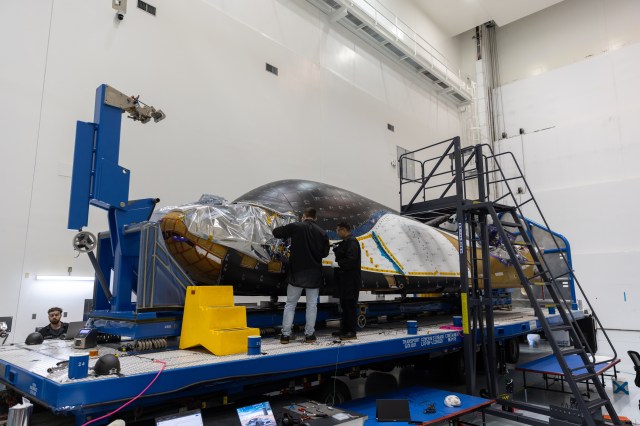
NASA, Sierra Space Deliver Dream Chaser to Florida for Launch Preparation
- Search All NASA Missions
- A to Z List of Missions
- Upcoming Launches and Landings
- Spaceships and Rockets
- Communicating with Missions
- James Webb Space Telescope
- Hubble Space Telescope
- Why Go to Space
- Astronauts Home
- Commercial Space
- Destinations
Living in Space
- Explore Earth Science
- Earth, Our Planet
- Earth Science in Action
- Earth Multimedia
- Earth Science Researchers
- Pluto & Dwarf Planets
- Asteroids, Comets & Meteors
- The Kuiper Belt
- The Oort Cloud
- Skywatching
- The Search for Life in the Universe
- Black Holes
- The Big Bang
- Dark Energy & Dark Matter
- Earth Science
- Planetary Science
- Astrophysics & Space Science
- The Sun & Heliophysics
- Biological & Physical Sciences
- Lunar Science
- Citizen Science
- Astromaterials
- Aeronautics Research
- Human Space Travel Research
- Science in the Air
- NASA Aircraft
- Flight Innovation
- Supersonic Flight
- Air Traffic Solutions
- Green Aviation Tech
- Drones & You
- Technology Transfer & Spinoffs
- Space Travel Technology
- Technology Living in Space
- Manufacturing and Materials
- Science Instruments
- For Kids and Students
- For Educators
- For Colleges and Universities
- For Professionals
- Science for Everyone
- Requests for Exhibits, Artifacts, or Speakers
- STEM Engagement at NASA
- NASA's Impacts
- Centers and Facilities
- Directorates
- Organizations
- People of NASA
- Internships
- Our History
- Doing Business with NASA
- Get Involved
- Aeronáutica
- Ciencias Terrestres
- Sistema Solar
- All NASA News
- Video Series on NASA+
- Newsletters
- Social Media
- Media Resources
- Upcoming Launches & Landings
- Virtual Events
- Sounds and Ringtones
- Interactives
- STEM Multimedia

Clare Luckey: Shaping the Future of Mars Missions and Inspiring the Artemis Generation

Hubble Captures a Bright Spiral in the Queen’s Hair

Galaxies Actively Forming in Early Universe Caught Feeding on Cold Gas

Welcome Back to Planet Earth, Expedition 70 Crew!

Astronaut Exercise
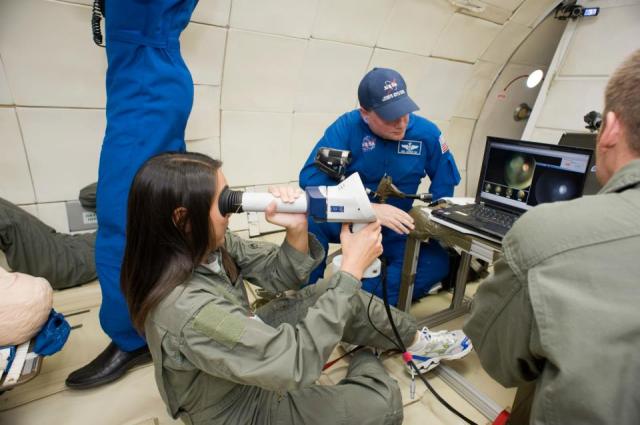
Eleasa Kim: Pioneering CLDP Payload Operations and Cultural Integration

NASA “Wildfire Digital Twin” Pioneers New AI Models and Streaming Data Techniques for Forecasting Fire and Smoke

5 Things to Know About NASA’s Tiny Twin Polar Satellites

NASA’s Psyche Fires Up Its Sci-Fi-Worthy Thrusters

NASA’s Juno Provides High-Definition Views of Europa’s Icy Shell

The Next Full Moon is the Flower, Corn, or Corn Planting Moon

NASA’s TESS Finds Intriguing World Sized Between Earth, Venus

Open Science News

E.11 Consortium in Biological Sciences Clarification on how to Address Eligibility

Updated Points of Contact for LDAP, MDAP, and DDAP
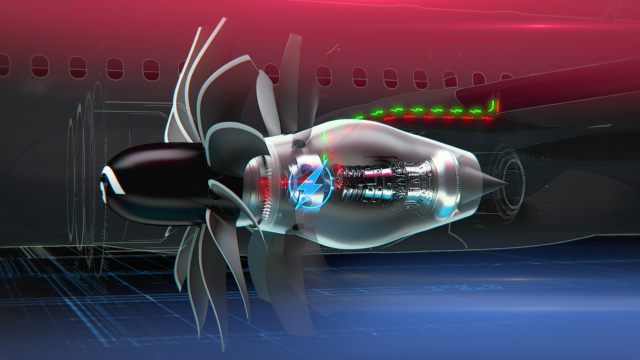
NASA, Industry to Start Designing More Sustainable Jet Engine Core
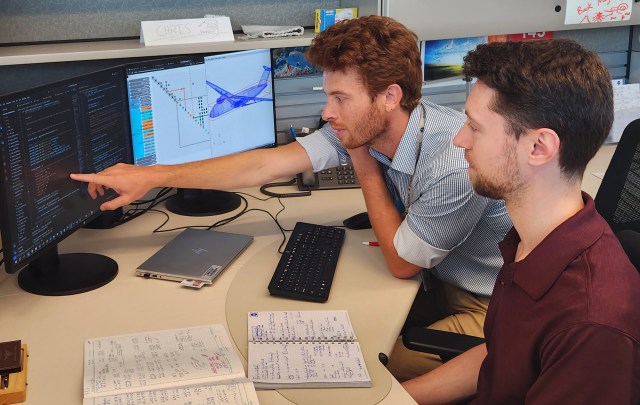
Aviary: A New NASA Software Platform for Aircraft Modelling
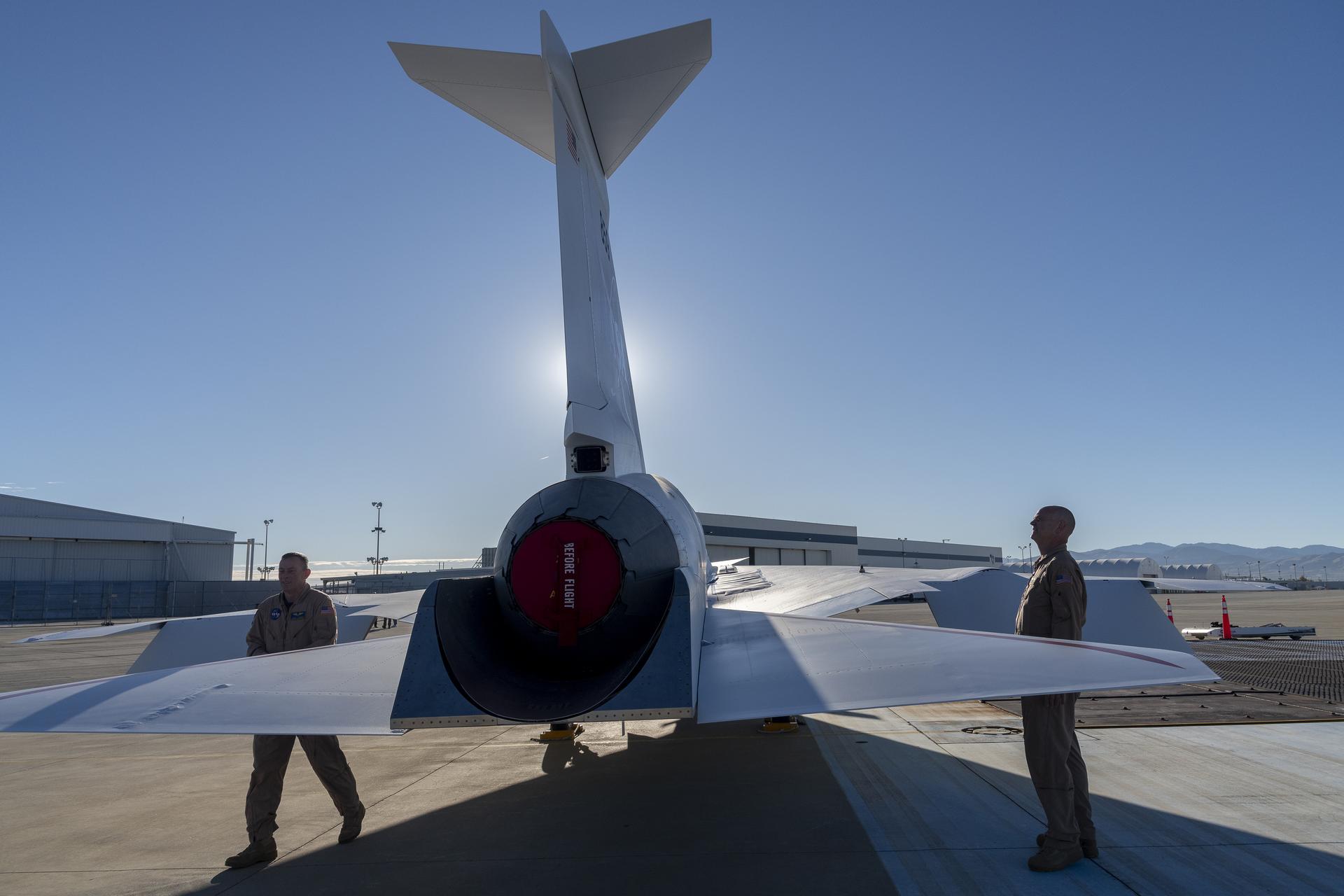
NASA’s X-59 Passes Milestone Toward Safe First Flight

NASA’s Compact Infrared Cameras Enable New Science

Tech Today: From Spacesuits to Racing Suits

NASA Around the World: Interns Teach Virtual Lessons in Kenya

Jennifer Scott Williams: Leading the Next Giant Leap in Space Exploration and Championing STEM Advocacy
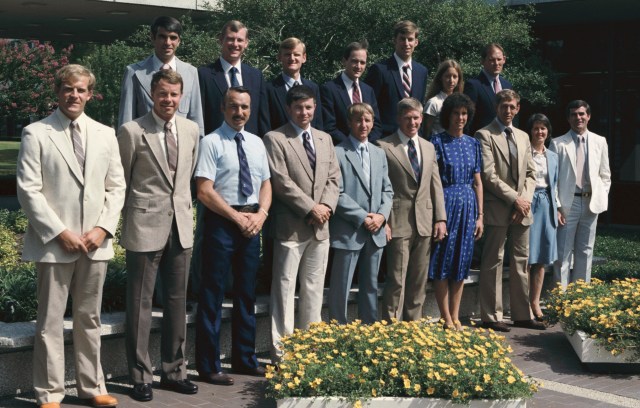
40 Years Ago: NASA Selects its 10th Group of Astronauts

Diez maneras en que los estudiantes pueden prepararse para ser astronautas

Astronauta de la NASA Marcos Berríos

Resultados científicos revolucionarios en la estación espacial de 2023
Melissa l. gaskill, science in space: may 2024.
Future missions to the Moon and Mars must address many challenges, including preventing loss of bone and muscle tissue in astronauts. Research on the International Space Station is helping to address this challenge.
Without Earth’s gravity, both bone and muscle atrophy, or become smaller and weaker. Early on, scientists realized that exercise is a critical part of maintaining healthy bones and muscles in space, just as it is on Earth. From simple elastic bands on early missions, exercise hardware has become increasingly advanced. Current equipment includes the Advanced Resistive Exercise Device ( ARED ) weight-lifting system, a second generation-treadmill called T2 , and the Cycle Ergometer with Vibration Isolation and Stabilization System ( CEVIS ) cycling machine. Studies continue to refine this equipment as well as the intensity and duration of how astronauts use it, with crew members now averaging two hours of exercise per day.
To view this video please enable JavaScript, and consider upgrading to a web browser that supports HTML5 video
Installed in 2008, ARED uses a piston and flywheel system to provide loading that essentially mimics weightlifting in weightlessness. A current investigation from ESA (European Space Agency), ARED Kinematics analyzes the effect of this type of exercise on the body in microgravity to help determine optimal workout programs before, during, and after spaceflight. Results have shown that preflight exercise training improves an individual’s performance while on the space station just as pre-season training helps athletes in later competition. 1
From 2001 to 2011, crew members used the Interim Resistive Exercise Device ( IRED ), which could be configured for at least 18 different exercises using both upper and lower body muscles with up to 300 pounds of resistive force. A retrospective evaluation showed some correlation between preflight strength and postflight changes, and analysis suggested that a resistance device that provides higher loads and improved exercise prescriptions could provide greater benefits. 2

CEVIS, installed in 2001 and upgraded in 2023, uses friction and resistance and is computer-controlled to maintain an accurate workload. The system displays parameters such as cycling speed, heart rate, elapsed time, and exercise prescription details. A study using the data collected by CEVIS concluded that up to 17% of astronauts could experience loss of muscle performance, bone health, and cardiorespiratory fitness if future missions continue to use current exercise countermeasures. The researchers note that this highlights the need to further refine current regimens, add other interventions, or enhance conditioning preflight. 3

Appropriate equipment is important, but so is the way it is used. Early exercise regimens included running on a treadmill at low velocity and conducting resistance exercise at low loads for long periods of time. Despite spending up to 10 hours per week exercising, astronauts continued to lose muscle mass and bone density. Growing evidence showed that high-intensity, low-volume exercise was more effective at maintaining fitness on Earth. The Integrated Resistance and Aerobic Training Study ( Sprint ) compared results of low-intensity, high-volume with high-intensity, low-volume workouts in microgravity. The outcomes were similar, but shorter workouts save crew time – a valuable resource on missions – and reduce wear and tear on exercise equipment. 4 Future missions may be limited to a single device for both aerobic and resistance exercise, necessitating shorter workouts so each crew member gets a turn. Higher intensity exercise could compensate for these limits.

An investigation called VO2max documented changes in maximum oxygen uptake, which is considered a standard measure of a person’s aerobic and physical working capacity. Long-duration spaceflight caused a significant decrease in maximal oxygen uptake and aerobic exercise capacity. 5 These results have important implications for future long-duration space missions, adding to the evidence that current countermeasures may not be adequate.
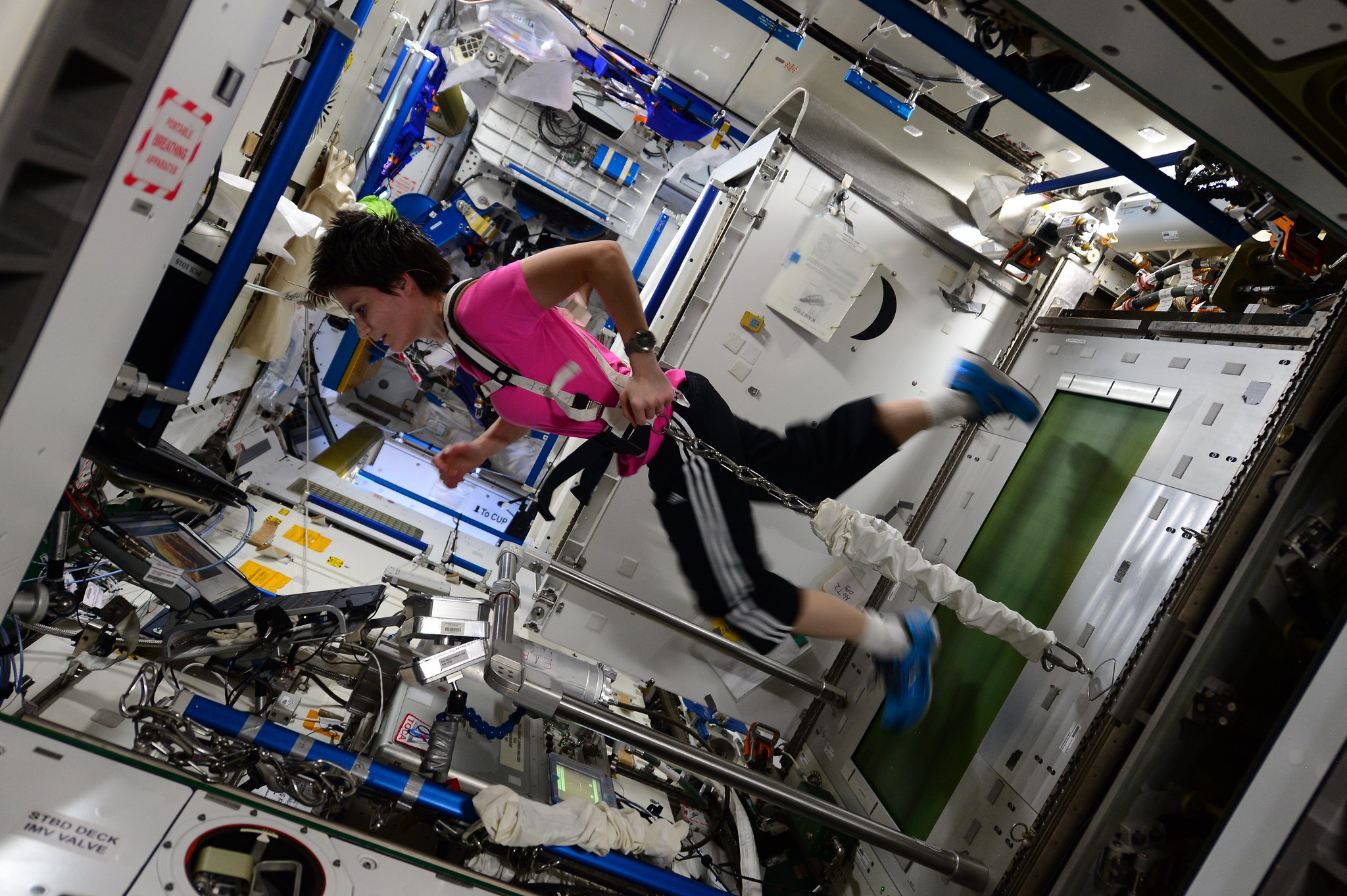
Muscle Biopsy , an investigation from ESA (European Space Agency), analyzed molecular changes in skeletal muscle before and after spaceflight and identified an enzyme product that could be used as a possible indicator of muscle health. The findings suggest that current exercise protocols are effective in preventing muscle deconditioning and support improvements in countermeasures to protect crew health and performance on future deep space exploration missions. 6
While current exercise programs appear to moderate changes in musculoskeletal systems, individual results vary. In addition, current regimens likely cannot directly transfer to longer exploration missions due to space constraints, environmental issues such as removal of heat and moisture, device maintenance and repair needs, and the challenges of finding time for exercise and avoiding interference with the work of other crew members. 7
Planned missions to explore the Moon and deep space may last up to three years. Research continues to zero in on the combination of diet, exercise, and medication that could keep astronauts healthy during spaceflight, when they set foot on the Moon or Mars, and when they return to Earth. Because aging, sedentary lifestyles, and illnesses cause bone and muscle loss on Earth, this research also can benefit people on the ground.
Melissa Gaskill International Space Station Research Communications Team NASA’s Johnson Space Center
Search this database of scientific experiments to learn more about those mentioned above.
1 Lambrecht G, Petersen N, Weerts G, Pruett CJ, Evetts SN, et al. The role of physiotherapy in the European Space Agency strategy for preparation and reconditioning of astronauts before and after long duration space flight. Musculoskeletal Science & Practice. 2017 January; 27 Suppl 1S15-S22. DOI: 10.1016/j.math.2016.10.009
2 English KL, Lee SM, Loehr JA, Ploutz-Snyder RJ, Ploutz-Snyder LL. Isokinetic strength changes following long-duration spaceflight on the ISS. Aerospace Medicine and Human Performance. 2015 December 1; 86(12): 68-77. DOI: 10.3357/AMHP.EC09.2015.
3 Scott JM, Feiveson AH, English KL, Spector ER, Sibonga JD, et al. Effects of exercise countermeasures on multisystem function in long duration spaceflight astronauts. npj Microgravity. 2023 February 3; 9(1): 11. DOI: 10.1038/s41526-023-00256-5.
4 English KL, Downs ME, Goetchius EL, Buxton RE, Ryder JW, et al. High intensity training during spaceflight: results from the NASA Sprint Study. npj Microgravity. 2020 August 18; 6(1): 21. DOI: 10.1038/s41526-020-00111-x.
5 Ade CJ, Broxterman RM, Moore Jr. AD, Barstow TJ. Decreases in maximal oxygen uptake following long-duration spaceflight: Role of convective and diffusive O2 transport mechanisms. Journal of Applied Physiology. 2017 April; 122(4): 968-975. DOI: 10.1152/japplphysiol.00280.2016.
6 Blottner D, Moriggi M, Trautmann G, Furlan S, Block K, et al. Nitrosative Stress in Astronaut Skeletal Muscle in Spaceflight. Antioxidants. 2024 April; 13(4): 432. DOI: 10.3390/antiox13040432
7 Scott JP, Weber T, Green DA. Introduction to the Frontiers Research Topic: Optimisation of Exercise Countermeasures for Human Space Flight – Lessons from Terrestrial Physiology and Operational Considerations. Frontiers in Physiology. 2019 10173. DOI: 10.3389/fphys.2019.00173.
Discover More Topics
Latest News from Space Station Research

Human Health and Performance
The Human Health and Performance (HH&P) Directorate is the primary organization focused on humans living, working and thriving in space,…

Station Science 101: Human Research
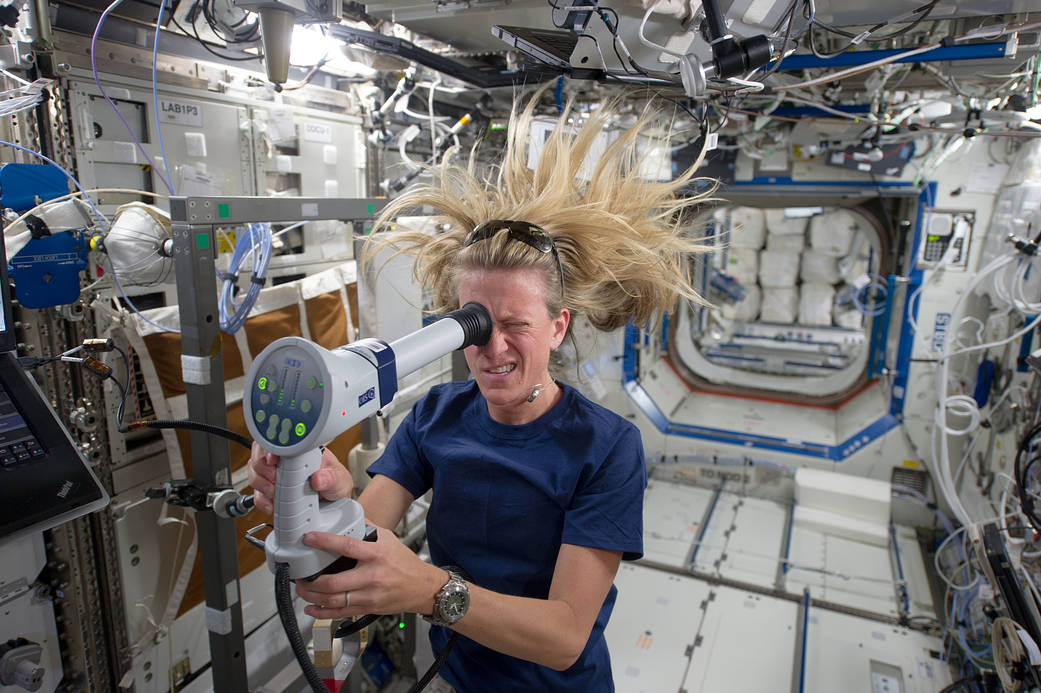
- Frontiers in Sports and Active Living
- Sport and Exercise Nutrition
- Research Topics
Advancements in Dietary Supplements: Enhancing Sport Performance and Recovery
Total Downloads
Total Views and Downloads
About this Research Topic
Sporting excellence relies on various factors, including physical ability, training techniques, and crucially, nutritional support. While fundamental, the role of dietary supplements in optimizing sports performance and recovery often remains undervalued. With emerging scientific evidence and advanced technology, understanding the influence of supplements on athletic endurance, strength, and recovery is taking center stage. This Research Topic aims to delve into the most recent advancements in the realm of dietary supplements in the context of sports performance and recovery. It seeks to shed light on the mechanisms linking certain supplements to improved performance, assess the benefits and risks, and illuminate the potential use of new and innovative supplementation strategies. We welcome submissions dedicated to: - Investigating the role of traditional and novel dietary supplements in enhancing sports performance or aiding recovery. - Assessing the efficacy and safety of dietary supplements in various sports disciplines. - Exploring the biochemical and physiological mechanisms driving the effects of dietary supplements on athlete performance. - Evaluating the influence of dietary supplements on injury prevention and recovery in athletes. - Analyzing personalized supplementation strategies based on athletes' genetic profile, exercise routines, or sport discipline. - Discussing the ethical considerations and regulations surrounding dietary supplement use in the sporting arena. We encourage research submissions in the form of original research articles, reviews, brief research reports, case studies, and others accepted by the section. Well-designed studies with dietary supplements showing positive, negative, or null results are invited. Through this Research Topic, we aim to provide a comprehensive, updated overview of the multifaceted relationship between dietary supplements and athletic performance, thereby aiding coaches, athletes, and sports nutritionists in making informed decisions.
Keywords : Dietary Supplements, Sport Performance, Nutrition, Recovery, Regulations
Important Note : All contributions to this Research Topic must be within the scope of the section and journal to which they are submitted, as defined in their mission statements. Frontiers reserves the right to guide an out-of-scope manuscript to a more suitable section or journal at any stage of peer review.
Topic Editors
Topic coordinators, submission deadlines, participating journals.
Manuscripts can be submitted to this Research Topic via the following journals:
total views
- Demographics
No records found
total views article views downloads topic views
Top countries
Top referring sites, about frontiers research topics.
With their unique mixes of varied contributions from Original Research to Review Articles, Research Topics unify the most influential researchers, the latest key findings and historical advances in a hot research area! Find out more on how to host your own Frontiers Research Topic or contribute to one as an author.
Should your exercise goals be in minutes or steps? Study suggests they are equally beneficial
In the age of smartwatches, monitoring step counts has never been easier, but current physical activity guidelines do not explicitly recommend specific step counts for health. A new study from researchers at Brigham and Women's Hospital, a founding member of Mass General Brigham, suggests that both step and time-based exercise targets are equivalently associated with lower risks of early death and cardiovascular disease. Thus, whether one chooses a time or step goal may not be as important as choosing a goal aligned with personal preferences. Results are published in JAMA Internal Medicine .
Physical activity reduces the risk of acquiring chronic illness and infection, and promotes longevity. The current U.S. guidelines, last updated in 2018, recommend that adults engage in at least 150 minutes of moderate to vigorous physical activity (e.g., brisk walking) or 75 minutes of vigorous activity (e.g., jogging) per week. At that time, most of the existing evidence on health benefits came from studies where participants self-reported their physical activity. Few data points existed on the relationship between steps and health. Fast forward to the present -- with wearables being ubiquitous, step counts are now a popular metric among many fitness tracking platforms. How do time-based goals stack up against step-based ones? Investigators sought to answer this question.
"We recognized that existing physical activity guidelines focus primarily on activity duration and intensity but lack step-based recommendations," said lead author Rikuta Hamaya, MD, PhD, MS, a researcher in the Division of Preventive Medicine at BWH. "With more people using smartwatches to measure their steps and overall health, we saw the importance of ascertaining how step-based measurements compare to time-based targets in their association with health outcomes -- is one better than the other?"
For this study, investigators collected data from 14,399 women who participated in the Women's Health Study, and who were healthy (free from cardiovascular disease and cancer). Between 2011 and 2015, participants aged 62 years and older were asked to wear research grade wearables for seven consecutive days to record their physical activity levels, only removing the devices for sleep or water-related activities. Throughout the study period, annual questionnaires were administered to ascertain health outcomes of interest, in particular, death from any cause and cardiovascular disease. Investigators followed up with participants through the end of 2022.
At the time of device wear, researchers found that participants engaged in a median of 62 minutes of moderate-to-vigorous intensity physical activity per week and accumulated a median of 5,183 steps per day. During a median follow-up of 9 years, approximately 9% of participants had passed and roughly 4% developed cardiovascular disease. Higher levels of physical activity (whether assessed as step counts or time in moderate-to-vigorous activity) were associated with large risk reductions in death or cardiovascular disease -- the most active quarter of women had 30-40% risk reductions compared with the least active quarter. And, individuals in the top three quartiles of physical activity outlived those in the bottom quartile by an average of 2.22 and 2.36 months respectively, based on time and step-based measurements, at nine years of follow-up. This survival advantage persisted regardless of differences in body mass index (BMI).
While both metrics are useful in portraying health status, Hamaya explained that each has its advantages and downsides. For one, step counts may not account for differences in fitness levels. For example, if a 20-year-old and 80-year-old both walk for 30 minutes at moderate intensity, their step counts may differ significantly. Conversely, steps are straightforward to measure and less subject to interpretation compared to exercise intensity. Additionally, steps capture even sporadic movements of every day life, not just exercise, and these kinds of daily life activities likely are those carried out by older individuals.
"For some, especially for younger individuals, exercise may involve activities like tennis, soccer, walking, or jogging, all of which can be easily tracked with steps. However, for others, it may consist of bike rides or swimming, where monitoring the duration of exercise is simpler. That's why it's important for physical activity guidelines to offer multiple ways to reach goals. Movement looks different for everyone, and nearly all forms of movement are beneficial to our health," said Hamaya.
The authors note that this study incorporates only a single assessment of time and step-based physical activity metrics. Further, most women included in the study were white and of higher socioeconomic status. Finally, this study was observational, and thus causal relations cannot be proven. In the future, Hamaya aims to collect more data via a randomized controlled trial to better understand the relationship between time and step-based exercise metrics and health.
Senior author I-Min Lee, MBBS, ScD, an epidemiologist in the Division of Preventive Medicine at BWH, concluded, "The next federal physical activity guidelines are planned for 2028. Our findings further establish the importance of adding step-based targets, in order to accommodate flexibility of goals that work for individuals with differing preferences, abilities and lifestyles."
Authorship: In addition to Hamaya, BWH authors include Julie E. Buring and I-Min Lee. Additional authors include Eric Shiroma, Christopher Moore, and Kelly Evenson.
Disclosures : The authors declare no competing interests.
Funding: This research was supported in part by the National Institutes of Health (CA154647, CA047988, CA182913, HL043851, HL080467, and HL09935), from the; National Cancer Institute (5R01CA227122), Office of the Director, Office of Disease Prevention, and Office of Behavioral and Social Sciences Research; and by the extramural research program at the National Heart, Lung, and Blood Institute.
- Public Health
- Ocean Policy
- Travel and Recreation
- STEM Education
- Scientific Conduct
- Surveillance
- Educational Policy
- Early childhood education
- Public health
- Population dynamics of fisheries
- Classical liberalism
- Embryonic stem cell
- Economic growth
- Traffic engineering (transportation)
- Automobile safety
Story Source:
Materials provided by Brigham and Women's Hospital . Note: Content may be edited for style and length.
Journal Reference :
- Rikuta Hamaya, Eric J. Shiroma, Christopher C. Moore, Julie E. Buring, Kelly R. Evenson, I-Min Lee. Time- vs Step-Based Physical Activity Metrics for Health . JAMA Internal Medicine , 2024; DOI: 10.1001/jamainternmed.2024.0892
Cite This Page :
Explore More
- Future Climate Impacts Put Whale Diet at Risk
- Charge Your Laptop in a Minute?
- Caterpillars Detect Predators by Electricity
- 'Electronic Spider Silk' Printed On Human Skin
- Engineered Surfaces Made to Shed Heat
- Innovative Material for Sustainable Building
- Human Brain: New Gene Transcripts
- Epstein-Barr Virus and Resulting Diseases
- Origins of the Proton's Spin
- Symbiotic Bacteria Communicate With Plants
Trending Topics
Strange & offbeat.

IMAGES
VIDEO
COMMENTS
500+ Sports Research Topics. March 26, 2024. by Muhammad Hassan. Sports research topics cover a vast array of areas in the world of athletics, from the physical and psychological impacts of sport on athletes to the social and cultural implications of sports on society. Sports research can include studies on training techniques, nutrition ...
Sports Nutrition Research Topics. 1. The Impact of Hydration on Athletic Performance. 2. Nutritional Strategies for Endurance Athletes. 3. Role of Protein in Muscle Recovery and Growth. 4. Dietary Supplements in Sports Nutrition.
4 Research Topics About Sports Medicine. 5 Research Topics on Exercise. 6 Research Topics on the History of Sports. 7 Research Topics on Sports Marketing. 8 Sports Research Topics on Sociology. 9 Research Paper Topics About Soccer. 10 Research Paper Topics about Basketball. 11 Research Topics on Athletic Training.
That's why we've created this blog to assist students to develop top-notch sports research topics that generate readers' interests and earn the highest grades in class. If you need custom-made sports argument essay topics that cover areas we have not included in this list, you can always contact customer support and get research paper ...
Nutrition Sports Research Topics. The Impact of Protein Supplementation on Athletic Performance. The Role of Carbohydrates in Post-Exercise Recovery. Assessing the Effects of Hydration on Endurance Athletes. Benefits of Omega-3 Fatty Acids for Sports Performance. Analyzing the Impact of Caffeine on Exercise Endurance.
Inspiring Research Topics in Athletics. The Impact of Mental Training on Performance in Track and Field Athletes. The effects of altitude training on endurance running performance. Investigating the role of genetics in athletic performance. Analyzing the biomechanics of a successful high jump: a case study.
Here are some pointers on what makes a good research paper in sports: 1. Demonstrate In-depth Research. Show that you conducted intensive research to detail the background of the topic. For example, a topic that touches on the American Football stadium must touch on the psychological and social factors of the game. 2.
The objectives of this research topic are twofold: Firstly: To continue to consolidate a science around sport, from multiple perspectives: o Sports physiology. o Analysis of technical and tactical behaviors. o Game systems. o Competition analysis and performance analysis. o Sports psychology. o Sports rehabilitation.
Peer-reviewed, original research on sport, exercise, and performance psychology for applied scientists and practitioners. ... Topics in Psychology. ... It is equally important that a well reasoned rationale be provided for the selected sample size for qualitative studies based on the nature (i.e., breadth and complexity) of the research ...
University of Barcelona, Barcelona, Spain. Editorial of the Research Topic. Editorial: Advances in Sport Science: Latest Findings and New Scientific Proposals. Although sport as an activity has been practiced for much of modern history, sports sciences were not considered a discipline of academic tradition until the 20th century ( Fernández ...
Based on your sports research paper on such sources as scholarly articles and books, you can modify or polish your topic based on findings. 10) Research is a dynamic process, and you can choose a different approach to it. Don't be afraid to discover new things for your sports research paper with an interview or survey.
Physical, Physiological and Technical Development in Youth Athletes. Roberto Modena. Chiara Zoppirolli. Paolo Riccardo Brustio. 403 views. A multidisciplinary journal which investigates all aspects of sports, physical activity, and active living to understand the benefits and risks of non-sedentary behavior.
Sport psychology as an academic pursuit is nearly two centuries old. An enduring goal since inception has been to understand how psychological techniques can improve athletic performance. Although much evidence exists in the form of meta-analytic reviews related to sport psychology and performance, a systematic review of these meta-analyses is absent from the literature. We aimed to synthesize ...
Based on relevant research topics, a conceptualization of SEP has emerged from the present work. The Conceptualization of SEP. ... Research in Sport and Exercise Psychology between 2003 and 2013: an analysis of the English-speaking publication trends before the field's 50th anniversary.
Qualitative social scientific research in sport, ... Williams & Gibson, Citation 2017), arts-based, creative and sensorial research (e.g. Sparkes, Citation 2017; Svendler Nielsen, Citation 2009; Williams, ... Several overarching themes and topics were also discussed, ...
Sports Research Topics: Hockey. If you are more of a hockey fan, here are some more sports research paper topics that are all about hockey. Hockey's history from its inception to the present. An overview of the sport of hockey in South Asia. A case study of senior hockey culture in the United States.
by Ragnar Lund and Stephen A. Greyser. This field-based study of the Union of European Football Associations and its main international sporting event, the European Championships, explores key organizational capabilities that underlie value creation and enhancement in an event's portfolio of sponsorship relationships.
The objective of this study is to conduct a systematic review regarding the relationship between positive psychological factors, such as psychological well-being and pleasant emotions, and sports performance. This study, carried out through a systematic review using PRISMA guidelines considering the Web of Science, PsycINFO, PubMed and SPORT Discus databases, seeks to highlight the ...
There are plenty of physiology research topics about improving daily life with an active lifestyle. 3. Effect of a Low-Carbohydrate Ketogenic Diet on Body Mass on Olympic Weightlifting Athletes. Exercise scientists have realized the impact of nutrition on endurance, body composition, and recovery.
Thus, the aim of this Research Topic is to assemble both applied or theoretical research from experts within the field of sport psychology, sociology, performance and exercise or any correlated field. We encourage interdisciplinary papers submissions regarding, but not limited to, the following topics:• Conceptual and ethical matters of sport ...
Thomas proposed an analysis of computer vision-based applications and research topics in the sports field. The study summarized some of the commercially available systems such as camera tracking and player tracking systems. ... Park, Y.J.; Kim, H.S.; Kim, D.; Lee, H.; Kim, S.B.; Kang, P. A deep learning-based sports player evaluation model ...
Based on the number of publications in the cluster (the size of the topic), we get an insight into the impact of identified topics and research directions in the field of sport nutrition science. The distribution of the publications based on publication date shows the trends and relevance of the specific topics.
Sports Science Science Projects. (57 results) Top athletes and coaches use a whole lot of science and engineering to improve performance and increase the chances of winning. Technologies like better tennis rackets, sleeker running and swimming outfits, and aerodynamic soccer balls, mean that current athletes are breaking world records left and ...
113 Great Research Paper Topics. Posted by Christine Sarikas. General Education. One of the hardest parts of writing a research paper can be just finding a good topic to write about. Fortunately we've done the hard work for you and have compiled a list of 113 interesting research paper topics. They've been organized into ten categories and ...
NASA. Appropriate equipment is important, but so is the way it is used. Early exercise regimens included running on a treadmill at low velocity and conducting resistance exercise at low loads for long periods of time. Despite spending up to 10 hours per week exercising, astronauts continued to lose muscle mass and bone density.
Keywords: Dietary Supplements, Sport Performance, Nutrition, Recovery, Regulations . Important Note: All contributions to this Research Topic must be within the scope of the section and journal to which they are submitted, as defined in their mission statements.Frontiers reserves the right to guide an out-of-scope manuscript to a more suitable section or journal at any stage of peer review.
Funding: This research was supported in part by the National Institutes of Health (CA154647, CA047988, CA182913, HL043851, HL080467, and HL09935), from the; National Cancer Institute (5R01CA227122 ...